Form PRE 14A PREFERRED APARTMENT COMM For: Apr 02
UNITED STATES
SECURITIES AND EXCHANGE COMMISSION
Washington, D.C. 20549
SECURITIES AND EXCHANGE COMMISSION
Washington, D.C. 20549
SCHEDULE 14A
Proxy Statement Pursuant to Section 14(a)
of the Securities Exchange Act of 1934
Proxy Statement Pursuant to Section 14(a)
of the Securities Exchange Act of 1934
| Filed by the Registrant | x | Filed by a Party other than the Registrant | o | ||||||||
Check the appropriate box:
| x | Preliminary Proxy Statement | ||||
| o | Confidential, For Use of the Commission Only (as permitted by Rule 14a-6(e)(2)) | ||||
| o | Definitive Proxy Statement | ||||
| o | Definitive Additional Materials | ||||
| o | Soliciting Material Pursuant to §240.14a-12 | ||||
PREFERRED APARTMENT COMMUNITIES, INC.
(Name of Registrant as Specified In Its Charter)
(Name of Person(s) Filing Proxy Statement, if Other Than the Registrant)
Payment of Filing Fee (Check the appropriate box):
| x | No fee required. | |||||||
| o | Fee computed on table below per Exchange Act Rules 14a-6(i)(1) and 0-11. | |||||||
| 1. | Title of each class of securities to which transaction applies: | |||||||
| 2. | Aggregate number of securities to which transaction applies: | |||||||
| 3. | Per unit price or other underlying value of transaction computed pursuant to Exchange Act Rule 0-11 (set forth the amount on which the filing fee is calculated and state how it was determined): | |||||||
| 4. | Proposed maximum aggregate value of transaction: | |||||||
| 5. | Total fee paid: | |||||||
| o | Fee paid previously with preliminary materials. | |||||||
| o | Check box if any part of the fee is offset as provided by Exchange Act Rule 0-11(a)(2) and identify the filing for which the offsetting fee was paid previously. Identify the previous filing by registration statement number, or the Form or Schedule and the date of its filing | |||||||
| 1. | Amount Previously Paid: | |||||||
| 2. | Form, Schedule or Registration Statement No.: | |||||||
| 3. | Filing Party: | |||||||
| 4. | Date Filed: | |||||||

Letter from our President and Chief Executive Officer
 Joel T. Murphy President and Chief Executive Officer | April [16], 2021 Dear Fellow Stockholders: On behalf of the Board of Directors and management, I cordially invite you to attend the 2021 Annual Meeting of Stockholders (the “Annual Meeting”) of Preferred Apartment Communities, Inc. The Annual Meeting will be held on Thursday, June 3, 2021, at 9:00 a.m. Eastern Time. This year’s Annual Meeting will be a virtual meeting of stockholders. Registered holders, and beneficial stockholders who register for the meeting in advance, will be able to participate in the meeting, vote, and submit questions during the meeting via live webcast by visiting www.virtualshareholdermeeting.com/APTS2021. If you are a registered holder, a secure control number that will allow you to attend the meeting electronically can be found on your proxy card and on the Notice of Internet Availability of Proxy Materials. If you hold your shares in the name of a bank, broker or other holder of record, you may either: (i) vote in advance of the meeting by contacting your broker and attend the virtual meeting as a guest; or (ii) register to attend the virtual meeting as a stockholder in advance (allowing you to both vote and ask questions during the meeting) by following the instructions in the Proxy Statement. Details of the business to be presented at the Annual Meeting can be found in the accompanying Notice of 2021 Annual Meeting of Stockholders and Proxy Statement (our “Proxy Statement”). We are pleased to take advantage of the Securities and Exchange Commission rule allowing companies to furnish proxy materials to stockholders over the Internet. We believe that this e-proxy process expedites stockholders’ receipt of proxy materials, while setting a great precedent for our Company by keeping costs down and reducing the environmental impact of our Annual Meeting. On approximately April 21, 2021, we will begin mailing a Notice of Internet Availability of Proxy Materials containing instructions on how to access our Proxy Statement for 2021 and annual report to stockholders for 2020 (the “2020 Annual Report”) and how to vote over the Internet or how to request and return a proxy card by mail. Stockholders who previously made a request to receive a paper copy of the proxy materials will be mailed the Proxy Statement, 2020 Annual Report and proxy card. Whether or not you plan to attend the Annual Meeting, your vote is important and we encourage you to vote promptly. You may vote your shares via a toll-free telephone number or over the Internet. If you received a paper copy of the proxy card by mail, you may sign, date and mail the proxy card in the envelope provided. Instructions regarding all three methods of voting are contained in the Proxy Statement and on the proxy card. On behalf of the Board of Directors, we thank you for your ongoing support and investment in our Company. Sincerely,  Joel T. Murphy President and Chief Executive Officer | ||||
iii | ||||||||

Notice of 2021 Annual Meeting of Stockholders
Time and Date 9:00 a.m. (Eastern Time) on June 3, 2021 Place Virtual Meeting. Please visit: www.virtualshareholdermeeting.com/APTS2021 to participate. Record Date In order to vote, you must have been a stockholder at the close of business on April 5, 2021. | Voting Matters | Board Recommendation | |||||||||
Proposal 1 To elect seven directors to serve until the annual meeting of stockholders in 2022. See page 14 | For each of the 7 directors | ||||||||||
Proposal 2 To approve the First Amendment to the 2019 Stock Incentive Plan. See page 39 | For | ||||||||||
Proposal 3 To conduct an advisory vote on named executive officer compensation. See page 43 | For | ||||||||||
We cordially invite you to attend the virtual meeting, but regardless of whether you plan to be present, please vote in one of the following ways: VISIT www.proxyvote.com to vote via the Internet. Have your proxy card in hand when you access the website and follow the instructions to vote your shares If you receive a printed copy of the proxy materials by mail, you may vote by telephone by CALLING 1-800-690-6903 (this is a free call in the U.S.). Have your proxy card in hand when you call and then follow the instructions to vote your shares If you receive a printed copy of the proxy materials by mail, you may vote if you MARK, SIGN, DATE AND PROMPTLY RETURN your proxy card in the envelope provided, which requires no additional postage if mailed in the U.S. | |||||||||||
Proposal 4 To ratify the selection of PricewaterhouseCoopers LLP as our independent registered public accountants for 2021. See page 74 | For | ||||||||||
To transact such other business as may properly come before the meeting or any adjournments or postponements thereof. | |||||||||||
Only stockholders of the Company and its invited guests may attend the meeting. If you are a registered holder, a secure control number that will allow you to attend the meeting electronically can be found on your proxy card and on the Notice of Internet Availability of Proxy Materials. If you hold your shares in the name of a bank, broker or other holder of record, you may either: (i) vote in advance of the meeting by contacting your broker and attend the virtual meeting as a guest; or (ii) register to attend the virtual meeting as a stockholder in advance (allowing you to both vote and ask questions during the meeting) by following the instructions in the Proxy Statement. Any proxy may be revoked by you at any time prior to its exercise at the meeting. By Order of the Board of Directors,  Jeffrey R. Sprain General Counsel and Secretary [April 16, 2021] | |||||||||||
iv | ||||||||
Table of Contents
v | ||||||||
A-1 | |||||
vi | ||||||||
 | |||||||||||
PROXY STATEMENT | |||||||||||
 | |||||||||||
Proxy Statement

3284 Northside Parkway NW, Suite 150
Atlanta, Georgia 30327
2021 ANNUAL MEETING OF STOCKHOLDERS
Preferred Apartment Communities, Inc. (“we,” “our,” “us”, the “Company” or "PAC") is furnishing this Proxy Statement in connection with our solicitation of proxies to be voted at our 2021 Annual Meeting of Stockholders (the “Annual Meeting”). This year’s Annual Meeting will be held at 9:00 a.m. Eastern Time on June 3, 2021 and will be a virtual meeting of stockholders. You will be able to participate in the 2021 Annual Meeting, vote, and submit your questions during the meeting via live webcast by visiting www.virtualshareholdermeeting.com/APTS2021. You must have your 15-digit control number to enter and participate in the virtual meeting. If you are a registered holder, your control number is provided by the Company on your Notice of Internet Availability of Proxy Materials (“Availability Notice”) or on your proxy card. If your shares are held in the name of a bank, broker or other holder of record, you may either (i) vote in advance of the meeting by contacting your broker and attend the virtual meeting as a guest; or (ii) register to attend the virtual meeting as a stockholder in advance (allowing you to both vote and ask questions during the meeting) by following the instructions below under “Attendance at the Annual Meeting.” This Proxy Statement and the proxy card are being made available over the Internet or delivered by mail on or about April 21, 2021, to stockholders of record as of April 5, 2021.
2 | ||||||||
 | ||
ABOUT THE PROXY STATEMENT | ||
 | ||
About the Proxy Statement
What is the purpose of the Annual Meeting?
At the Annual Meeting, our stockholders will be asked to consider and act upon the following matters:
•Election of seven directors nominated by our Board of Directors (the “Board”) and listed in this Proxy Statement to serve until the annual meeting of stockholders in 2022;
•Approval of the First Amendment to the 2019 Stock Incentive Plan;
•An advisory vote on the compensation of our named executive officers as disclosed in this Proxy Statement;
•Ratification of the selection of PricewaterhouseCoopers LLP as our independent registered public accounting firm for 2021; and
•Such other business as may properly come before the Annual Meeting or any adjournments or postponements thereof.
Why did I receive a Notice of Internet Availability of Proxy Materials in the mail instead of a printed set of proxy materials?
Pursuant to rules adopted by the Securities and Exchange Commission (“SEC”), we are permitted to furnish our proxy materials over the Internet to our stockholders by delivering a Notice of Internet Availability of Proxy Materials in the mail. Unless requested, you will not receive a printed copy of the proxy materials in the mail. Instead, the Notice of Internet Availability of Proxy Materials instructs you on how to access and review the Proxy Statement and 2020 Annual Report over the Internet at www.proxyvote.com. In addition, you can access the Proxy Statement and 2020 Annual Report here: https://materials.proxyvote.com/74039L. The Notice of Internet Availability of Proxy Materials also instructs you on how you may submit your proxy over the Internet, or how you can request a full set of proxy materials, including a proxy card to return by mail. If you received a Notice of Internet Availability of Proxy Materials in the mail and would like to receive a printed copy of our proxy materials, you should follow the instructions for requesting these materials provided in the Notice of Internet Availability of Proxy Materials.
Who is entitled to vote at the Annual Meeting?
Only stockholders of record at the close of business on April 5, 2021, the record date for the Annual Meeting, are entitled to receive notice of and vote at the Annual Meeting.
If you hold your shares through a bank, broker or other nominee and intend to vote in person at the Annual Meeting, you will need to provide a legal proxy from your bank, broker or other stockholder of record.
What are the voting rights of stockholders?
Each share of our common stock is entitled to one vote. There is no cumulative voting.
How many shares are outstanding and entitled to vote at the Annual Meeting?
At the close of business on April 5, 2021, approximately [50,904,599] shares of our common stock were outstanding, including [809,437] shares of unvested restricted common stock, that are entitled to vote at the Annual Meeting. Additionally, [__________] shares of our Series A Redeemable Preferred Stock, [_______] shares of our Series M Redeemable Preferred Stock, [_______] shares of our Series A1 Redeemable Preferred Stock and [_________] shares of our Series M1 Redeemable Preferred Stock were outstanding on such date, none of which are entitled to vote at the Annual Meeting.
4 | ||||||||
ABOUT THE PROXY STATEMENT
What constitutes a quorum?
Stockholders entitled to cast at least a majority of all the votes entitled to be cast must be present at the Annual Meeting in person or by proxy to constitute a quorum for the transaction of business. Withheld votes, “abstentions” and broker non-votes count for purposes of determining whether a quorum is present. Generally, broker non-votes occur when shares held by a broker for a beneficial owner are not voted with respect to a particular proposal because the proposal is not a “routine” matter and the broker has not received voting instructions from the beneficial owner of the shares. All items on this year’s ballot are “non-routine” matters under New York Stock Exchange (“NYSE”) rules to which we are subject, except ratification of the selection of PricewaterhouseCoopers LLP as our independent registered public accountants for 2021 (Proposal 4).
What is the difference between a “stockholder of record” and a “street name” holder?
These terms describe how your shares are held. If your shares are registered directly in your name with Computershare, our transfer agent, you are a “stockholder of record.” If your shares are held in the name of a brokerage, bank, trust or other nominee as a custodian, you are a “street name” holder.
If you are a “street name” holder, you are considered the beneficial owner of shares held in street name and your broker or nominee is considered, with respect to those shares, the stockholder of record. As the beneficial owner, you have the right to direct your broker on how to vote your shares. You are also invited to attend the virtual Annual Meeting and vote your shares online; however, in order to vote your shares online, you must provide us with a legal proxy from your bank, broker or other stockholder of record.
Brokerage firms have authority under NYSE rules to vote customers′ shares for which they have not received voting instructions on certain “routine” matters, but may not vote for “non-routine matters” unless they have received voting instructions. As explained above, all items on this year’s ballot are “non-routine” matters under NYSE rules except ratification of the selection of PricewaterhouseCoopers LLP as our independent registered public accountants for 2021 (Proposal 4). Therefore, if you do not provide voting instructions, your brokerage firm may not vote your shares on such non-routine matters. We encourage you to provide voting instructions to your brokerage firm. This ensures your shares will be voted at the Annual Meeting.
How do I vote?
If you are a registered stockholder, meaning that your shares are registered in your name, you have four voting options. You may vote:
•over the Internet (if you have access to the Internet, we encourage you to vote in this manner) by going to www.proxyvote.com. Have your proxy card in hand when you access the website and follow the instructions to vote your shares;
•by telephone by calling 1-800-690-6903. Have your proxy card in hand when you call and then follow the instructions to vote your shares;
•by signing and dating your proxy card (if you received a proxy card) and mailing it in the prepaid, preaddressed envelope enclosed therewith; or
•by attending the virtual Annual Meeting and voting as outlined under “What do I need to do to attend the virtual meeting?"
Please carefully follow the directions in the Notice of Internet Availability of Proxy Materials or proxy card you received. Proxies submitted over the Internet or by telephone must be received by 11:59 p.m., Eastern Time, on June 2, 2021. Proxies submitted by mail must be received by the Company prior to the commencement of the virtual Annual Meeting.
If you have any questions about the Annual Meeting, or if you require assistance on voting, please call Broadridge Investor Communications Solutions, Inc. (“Broadridge”), our proxy tabulator, at 1-800-579-1639.
5 | ||||||||
PREFERRED APARTMENT COMMUNITIES 2021 PROXY STATEMENT
Can I vote my shares at the virtual meeting?
If you are a “stockholder of record,” you may vote your shares at the virtual meeting. If you hold your shares in “street name,” you must obtain a legal proxy from your broker, bank, trustee or nominee, giving you the right to vote the shares at the virtual meeting.
What do I need to do to attend the virtual meeting?
As permitted by Maryland law and our Bylaws, the Company’s Annual Meeting will be held solely as a virtual meeting live via the Internet. You will be able to attend the Annual Meeting via live webcast by visiting the Company’s virtual meeting website (www.virtualshareholdermeeting.com/APTS2021) at the meeting time. Upon visiting the meeting website, you will be prompted to enter your 15-digit control number provided on your Availability Notice or on your proxy card if you receive proxy materials by mail. Your unique control number allows us to identify you as a stockholder and will enable you to securely log on, vote and submit questions during the Annual Meeting on the meeting website.
Beneficial stockholders who did not received a 15-digit control number from their bank or brokerage firm, who wish to attend the meeting should follow the instructions from their bank or brokerage firm, including any requirement to obtain a legal proxy. Most brokerage firms or banks allow a stockholder to obtain a legal proxy either online or by mail.
Alternatively, if you hold your shares in the name of a bank, broker or other holder of record, you may vote in advance of the virtual meeting by contacting your holder of record (please see “Voting Methods” below) and join the virtual meeting as a guest (without the ability to vote or ask questions) without advance registration.
What does it mean if I receive more than one Notice of Internet Availability of Proxy Materials or proxy card?
It means that you have multiple accounts with our transfer agent and/or with a broker, bank or other nominee. You will need to vote separately with respect to each Notice of Internet Availability of Proxy Materials or proxy card you received. Please vote all the shares you own.
Can I change my vote after I have mailed in my proxy card?
You may revoke your proxy by doing one of the following:
•by sending a written notice of revocation to our Secretary at 3284 Northside Parkway NW, Suite 150, Atlanta, Georgia 30327 so it is received prior to the Annual Meeting, stating that you revoke your proxy;
•by signing a later-dated proxy card and submitting it so it is received prior to the commencement of the Annual Meeting in accordance with the instructions included on the proxy card(s); or
•by attending the virtual Annual Meeting and voting your shares.
How may I vote for each proposal?
Proposal 1 – You may vote for, against or abstain on each individual nominee.
Proposal 2 – You may vote for, against or abstain on the approval of the First Amendment to the 2019 Stock Incentive Plan.
Proposal 3 – You may vote for, against or abstain on the advisory vote on named executive officer compensation.
Proposal 4 – You may vote for, against or abstain from voting to ratify the selection of PricewaterhouseCoopers LLP as our independent registered public accountants for 2021.
What are the Board’s recommendations on how I should vote my shares?
Proposal 1 – For all the nominees for election as director.
6 | ||||||||
ABOUT THE PROXY STATEMENT
Proposal 2 – For the approval of the First Amendment to the 2019 Stock Incentive Plan.
Proposal 3 – For the advisory proposal on named executive officer compensation.
Proposal 4 – For the proposal to ratify the selection of PricewaterhouseCoopers LLP as our independent registered public accountants for 2021.
What vote is required to approve each item?
| Proposal Number | Subject | Vote Required | Impact of Abstentions and Broker Non-Votes, if any | |||||||||||||||||
| 1 | Election of directors | Since this is an uncontested election, by a majority of the votes cast. | Abstentions and broker non-votes will not count as votes cast on the proposal and will not affect the outcome of the vote. | |||||||||||||||||
| 2 | Approval of the First Amendment to the 2019 Stock Incentive Plan | A majority of the votes cast. | Under NYSE rules, abstentions will be counted as votes cast, and will therefore have the same effect as votes against the proposal. Broker non-votes are not considered in connection the proposal and will not affect the outcome of the vote. | |||||||||||||||||
| 3 | Advisory vote on named executive officer compensation | A majority of the votes cast. | Abstentions and broker non-votes will not count as votes cast on the proposal and will not affect the outcome of the vote. | |||||||||||||||||
| 4 | Ratification of appointment of independent auditors | A majority of the votes cast. | Abstentions and broker non-votes will not count as votes cast on the proposal and will not affect the outcome of the vote. | |||||||||||||||||
What if I return my proxy card but do not provide voting instructions?
If you return a signed proxy card but do not provide voting instructions, your shares will be voted as follows:
Proposal 1 – For all the nominees for election as director.
Proposal 2 – For the approval of the First Amendment to the 2019 Stock Incentive Plan.
Proposal 3 – For the advisory proposal on named executive officer compensation.
Proposal 4 – For the proposal to ratify the selection of PricewaterhouseCoopers LLP as our independent registered public accountants for 2021.
What happens if additional matters are presented at the Annual Meeting?
We know of no other matters other than the items of business described in this Proxy Statement that can be considered at the meeting. If other matters requiring a vote do arise, the persons named as proxies will have the discretion to vote on those matters for you.
7 | ||||||||
PREFERRED APARTMENT COMMUNITIES 2021 PROXY STATEMENT
Is a list of stockholders available?
The names of stockholders of record entitled to vote at the Annual Meeting will be available to stockholders entitled to vote at this meeting for ten days prior to the Annual Meeting for any purpose relevant to the Annual Meeting. This list can be viewed between the hours of 9:00 a.m. and 5:00 p.m. Eastern Time at our principal executive offices at 3284 Northside Parkway NW, Suite 150, Atlanta, Georgia 30327. Please contact our Secretary at 3284 Northside Parkway NW, Suite 150, Atlanta, Georgia 30327 to make arrangements.
Who will count the votes?
A representative of Broadridge will act as the inspector of elections and will tabulate votes. In connection with the duties as inspector of elections, Broadridge’s representative will also determine whether a quorum is present, evaluate the validity of proxies and ballots and certify the voting results.
Who pays the cost of this proxy solicitation?
Proxies will be solicited on behalf of the Board by mail, in person and by telephone. We will pay the cost of preparing, assembling and mailing the proxy materials and the cost of soliciting proxies. We will also request banks, brokers and other holders of record to send the proxy materials to, and obtain proxies from, beneficial owners and will reimburse them for their reasonable expenses in doing so. We have not hired a proxy solicitor for the Annual Meeting. Our officers, directors and employees may solicit proxies by mail, personal contact, letter, telephone, telegram, facsimile or other electronic means. We have hired Broadridge to assist in the distribution of our proxy materials and the tabulation of proxies. In addition, Broadridge will serve as our inspector of elections. If you have any questions about the Annual Meeting, or if you require assistance on voting, please call Broadridge at 1-800-579-1639.
What is “householding?”
In accordance with a notice sent to certain street name stockholders of our common stock who share a single address, stockholders at a single address will receive only one copy of this Proxy Statement, our 2020 Annual Report or Notice of Availability, as applicable, unless we have previously received contrary instructions. This practice, known as “householding,” is designed to reduce our printing and postage costs. We currently do not “household” for stockholders of record.
If your household received a single set of proxy materials, but you would prefer to receive a separate copy of this Proxy Statement, our 2020 Annual Report or Notice of Availability, as applicable, you may contact us at Preferred Apartment Communities, Inc., 3284 Northside Parkway NW, Suite 150, Atlanta, GA 30327, Attn: Investor Relations, telephone: 1-770-818-4100, and we will deliver the applicable documents to you promptly upon receiving the request. You may also change your householding preferences through the Broadridge Householding Election system toll-free at 1-866-540-7095 or by writing to Broadridge at 51 Mercedes Way, Edgewood, New York 11717, Attn: Householding Department.
You may request or discontinue householding in the future by contacting the broker, bank or similar institution through which you hold your shares.
How do I submit a stockholder proposal for, or nominate an individual for election at, the 2022 annual meeting or related proxy materials, and what is the deadline for submitting a proposal or nominating an individual?
In order for a stockholder proposal to be properly submitted for presentation at our 2022 annual meeting and included in the proxy material for our 2022 annual meeting, we must receive written notice of the proposal at our executive offices by December 22, 2021. In order for a stockholder to nominate an individual for election to our Board, or to present a proposal of other business (other than a proposal to be included in our proxy materials), at our 2022 annual meeting, we must receive written notice of the nomination or proposal during the period beginning on November 22, 2021 and ending at 5:00 p.m., Eastern Time, on December 22, 2021. However, if
8 | ||||||||
ABOUT THE PROXY STATEMENT
our 2022 annual meeting is advanced or delayed by more than 30 days from the first anniversary of the Annual Meeting, then we must receive written notice of the nomination or proposal either (i) during the period beginning on the 150th day prior to, and ending at 5:00 p.m., Eastern Time, on the 120th day prior to, the date of our 2022 annual meeting, or (ii) the tenth day following the day on which we first publicly announce the date of our 2022 annual meeting. All proposals must contain the information specified in, and otherwise comply with, our bylaws and the federal securities laws. Proposals should be sent via registered, certified or express mail to: 3284 Northside Parkway NW, Suite 150, Atlanta, Georgia 30327, Attention: Jeffrey R. Sprain, General Counsel and Secretary.
Other Information
Our 2020 Annual Report, including financial statements audited by PricewaterhouseCoopers LLP, our independent registered public accounting firm, and PricewaterhouseCoopers LLP’s report thereon, is available at https://materials.proxyvote.com/74039L, and if you received a printed copy of this Proxy Statement, accompanies this Proxy Statement. However, the 2020 Annual Report forms no part of the material for the solicitation of proxies.
The 2020 Annual Report may also be accessed through our website at www.pacapts.com by clicking on the “Investors” link, followed by using the “Financials” dropdown and then selecting the “Annual Reports” link. In addition, our Annual Report on Form 10-K for the year ended December 31, 2020 (“2020 Form 10-K Annual Report”) is available on our website and from the SEC’s website at www.sec.gov. At the written request of any stockholder who owns our common stock as of the close of business on the record date, we will provide, without charge, paper copies of our 2020 Form 10-K Annual Report, including the financial statements and financial statement schedules, as filed with the SEC, except exhibits thereto. If requested by stockholders, we will provide copies of the exhibits for a reasonable fee. You can request copies of our 2020 Form 10-K Annual Report by following the instructions on the Notice of Internet Availability of Proxy Materials or by mailing a written request to:
Preferred Apartment Communities, Inc.
3284 Northside Parkway NW, Suite 150
Atlanta, Georgia 30327
Attention: General Counsel and Secretary
9 | ||||||||
 | ||
COMMON STOCK OWNERSHIP BY DIRECTORS, EXECUTIVE OFFICERS AND PRINCIPAL STOCKHOLDERS | ||
 | ||
Common Stock Ownership by Directors, Executive Officers and Principal Stockholders
Except as otherwise indicated, the following table sets forth the beneficial ownership of shares of our common stock as of March 31, 2021 for:
•our directors and nominees;
•our principal executive officer, principal financial officer and the three other most highly compensated executive officers calculated in accordance with SEC rules and regulations (collectively the “Named Executive Officers”);
•our directors and Named Executive Officers as a group; and
•each person known to us to be the beneficial owner of more than 5% of the outstanding shares of our common stock.
In accordance with SEC rules, each listed person’s beneficial ownership includes all shares of our common stock the person actually owns beneficially or of record, all shares of our common stock over which the person has or shares voting or dispositive control (such as in the capacity as a general partner of an investment fund), and all shares the person has the right to acquire within 60 days (such as shares of common stock that may be issued upon conversion of Class A Units representing Class A limited partnership interests (“Class A Units”) in Preferred Apartment Communities Operating Partnership, L.P. (our “operating partnership”), of which the Company is the general partner). Except as otherwise provided, all shares are owned directly, and the indicated person has sole voting and investment power. Unless otherwise indicated, the business address of the stockholders listed below is the address of our principal executive office, 3284 Northside Parkway NW, Suite 150, Atlanta, Georgia 30327.
| Common Stock Outstanding | ||||||||||||||
| Beneficial Owner | Shares Owned | Percentage | ||||||||||||
| The Vanguard Group | 4,851,581 | (1) | 9.43 | % | ||||||||||
| Blackrock, Inc. | 3,523,489 | (2) | 6.85 | % | ||||||||||
| Joel T. Murphy | 128,477 | (3) | * | |||||||||||
| John A. Iskason | 41,102 | (4)(5) | * | |||||||||||
| Jeffrey D. Sherman | 35,235 | (6)(7) | * | |||||||||||
| Parker Boone DuPree | 33,693 | (8)(9) | * | |||||||||||
| Michael J. Cronin | 106,700 | (10)(11) | * | |||||||||||
| Daniel M. DuPree | 280,431 | (12) | * | |||||||||||
| Steve Bartkowski | 69,305 | (13)(14) | * | |||||||||||
| John M. Cannon | 17,573 | (14) | * | |||||||||||
| Gary B. Coursey | 60,037 | (14) | * | |||||||||||
| Sara J. Finley | 19,797 | (14) | * | |||||||||||
| Howard A. McLure | 91,384 | (14)(15) | * | |||||||||||
| Timothy A. Peterson | 68,963 | (14) | * | |||||||||||
| All directors and executive officers as a group (12 persons) | 952,697 | 1.91 | % | |||||||||||
*Less than 1%
(1)As of December 31, 2020. Based solely upon information provided in a Schedule 13G/A filed with the SEC on February 10, 2021. The Vanguard Group beneficially owned 4,851,581 shares, none of which it has sole voting power with respect thereto, 33,23 shares of which it has shared voting power with respect thereto, 4,803,094 of such shares of which it has sole dispositive power with respect thereto and 48,487 shares of which it has shared dispositive power with respect thereto. The business address for The Vanguard Group is 100 Vanguard Blvd., Malvern, PA 19355.
(2)As of December 31, 2020. Based solely upon information provided in a Schedule 13G/A filed with the SEC on February 5, 2021. Blackrock, Inc. beneficially owned 3,523,489 shares, 3,473,508 shares of which it has sole voting power with respect thereto and 3,523,489 shares of which it has sole dispositive power with respect thereto. Blackrock, Inc. has shared voting power and shared dispositive power over zero shares. The business address for Blackrock, Inc. is 55 East 52nd Street, New York, NY 10055.
(3)137,741 of these shares are unvested restricted common stock that will vest on June 17, 2024, 148,072 of these shares are unvested restricted common stock that will vest approximately equally on June 17, 2021, June 17, 2022, June 17, 2023 and June 17, 2024 and 109,916 of these shares are unvested restricted common stock that will vest approximately equally on March 15, 2022, March 15 2023,
11 | ||||||||
PREFERRED APARTMENT COMMUNITIES 2021 PROXY STATEMENT
March 15, 2024 and March 15, 2025. While Mr. Murphy does not have dispositive power over these shares of restricted stock until vesting, Mr. Murphy has voting control of all of these shares.
(4)20,551 of these shares represent Class A Units of our operating partnership, each of which may be exchanged for one share of our common stock, or cash, as selected by the Company.
(5)48,209 of these shares are unvested restricted common stock that will vest approximately equally on June 17, 2021, June 17, 2022, June 17, 2023 and June 17, 2024 and 37,418 of these shares are unvested restricted common stock that will vest approximately equally on March 15, 2022, March 15 2023, March 15, 2024 and March 15, 2025. While Mr. Isakson does not have dispositive power over these shares of restricted stock until vesting, Mr. Isakson has voting control of all of these shares.
(6)3,405 of these shares represent Class A Units of our operating partnership, each of which may be exchanged for one share of our common stock, or cash, as selected by the Company.
(7)17,218 of these shares are unvested restricted common stock that will vest approximately equally on June 17, 2021, June 17, 2022, June 17, 2023 and June 17, 2024 and 12,862 of these shares are unvested restricted common stock that will vest approximately equally on March 15, 2022, March 15 2023, March 15, 2024 and March 15, 2025. While Mr. Sherman does not have dispositive power over these shares of restricted stock until vesting, Mr. Sherman has voting control of all of these shares.
(8)1,022 of these shares represent Class A Units of our operating partnership, each of which may be exchanged for one share of our common stock, or cash, as selected by the Company.
(9)17,218 of these shares are unvested restricted common stock that will vest approximately equally on June 17, 2021, June 17, 2022, June 17, 2023 and June 17, 2024 and 11,693 of these shares are unvested restricted common stock that will vest approximately equally on March 15, 2022, March 15 2023, March 15, 2024 and March 15, 2025. While Mr. Boone DuPree does not have dispositive power over these shares of restricted stock until vesting, Mr. Boone DuPree has voting control of all of these shares.
(10)28,607 of these shares represent Class A Units of our operating partnership, each of which may be exchanged for one share of our common stock, or cash, as selected by the Company.
(11)9,642 of these shares are unvested restricted common stock that will vest approximately equally on June 17, 2021, June 17, 2022, June 17, 2023 and June 17, 2024 and 7,951 of these shares are unvested restricted common stock that will vest approximately equally on March 15, 2022, March 15 2023, March 15, 2024 and March 15, 2025. While Mr. Cronin does not have dispositive power over these shares of restricted stock until vesting, Mr. Cronin has voting control of all of these shares.
(12)51,078 of these shares represent Class A Units of our operating partnership, each of which may be exchanged for one share of our common stock, or cash, as selected by the Company.
(13)1,223 of these shares represent Class A Units of our operating partnership, each of which may be exchanged for one share of our common stock or cash, as selected by the Company.
(14)11,019 of these shares are unvested shares of restricted common stock that will vest on the earlier of June 17, 2021 or the date of the Annual Meeting.
(15)76,729 of these shares are owned by the Howard Alex McLure Revocable Trust, of which Mr. McLure is the sole trustee and sole beneficiary.
12 | ||||||||
 | |||||||||||
PROPOSAL NO. 1 ELECTION OF DIRECTORS | |||||||||||
 | |||||||||||
| Proposal No. 1 | Our Board of Directors recommends a vote FOR all of the nominees named below. | ||||
| Election of Directors | |||||
Our charter and by-laws provide that the number of our directors may be established by a majority of the entire Board but may not be fewer than two nor more than ten. We currently have eight directors, including six independent directors. The term of each director expires at the Annual Meeting and when his or her respective successor is duly elected and qualified.
Daniel M. DuPree, our Executive Chairperson of the Board, has decided to retire and not stand for re-election as a member of the Board at the Annual Meeting. Mr. DuPree will continue to serve on our Board as our Executive Chairperson of the Board until his term expires on the date of the Annual Meeting. Mr. DuPree informed the Board that his decision to retire from and not stand for re-election to the Board did not arise from any dispute on any matter relating to the Company’s operations, policies or practices.
Upon the recommendation of our Nominating and Corporate Governance Committee of the Board (which is comprised solely of independent directors) the Board has nominated incumbent directors Steve Bartkowski, John M. Cannon, Gary B. Coursey, Sara J. Finley, Howard A. McLure, Joel T. Murphy and Timothy A. Peterson to stand for re-election at the Annual Meeting and to hold office until the later of our annual meeting of stockholders in 2022 and when a successor is elected and qualified. The Board has not yet nominated someone to fill the vacancy created by Mr. DuPree's retirement, and the Board plans to reevaluate the size of the Board following the Annual Meeting. Please note that proxies cannot be voted for a greater number of persons than the number of nominees named.
We expect that each nominee for election as a director will be able to serve if elected. If any nominee is not able to serve, proxies will be voted in favor of the remainder of those nominated and may be voted for substitute nominees. Since this is an uncontested election, each director will be elected by a majority of the votes cast, in person or by proxy, at the Annual Meeting, assuming a quorum is present. Abstentions and broker non-votes will not count as votes cast on the proposal and will not affect the outcome of the vote.
Nominees for Election
We have provided below certain information about each nominee for election as a director.
Steve Bartkowski Independent Director  Age 68 Director Since 2011 Committees: Nominating and Corporate Governance | Steve Bartkowski was elected to our Board as a director, effective as of April 31, 2011. Mr. Bartkowski was an All American in both baseball and football at the University of California at Berkeley. In 1975, he was the first pick in the NFL draft, selected by the Atlanta Falcons, serving as their starting quarterback for the following 11 seasons. Mr. Bartkowski was the NFL’s rookie of the year in 1975, the NFL’s highest rated quarterback for three years, and earned All-Pro honors for his efforts in 1980 and 1981. He was the most valuable player in the NFC in 1980. Mr. Bartkowski led the Falcons to their first playoff game in 1978 and again in 1980 and 1982. Mr. Bartkowski played his last season in the NFL for the Los Angeles Rams and retired from professional football in 1987. Following retirement from professional football, Mr. Bartkowski produced and hosted the popular TNN outdoor television series, Backroad Adventures with Steve Bartkowski from 1994 – 1996. He was also the host of a top rated outdoor television series, Suzuki’s Great Outdoors with Steve Bartkowski, on ESPN from 1990 – 1993. From 2000 until his retirement in late 2017, Mr. Bartkowski worked in business development for DPR Construction (“DPR”), a global commercial contractor and construction management company. Since August 2016, Mr. Bartkowski has served as a fly-fishing lodge manager. Since December 2017, Mr. Bartkowski has served as a consultant to DPR. He is a well-known motivational speaker on personal success and excellence, giving speeches throughout the United States. | ||||
Skills and Qualifications We believe that Mr. Bartkowski’s experience in business development for DPR and his previous leadership and management experience, both in professional football and television, make him well qualified to serve as a member of our Board. | |||||
14 | ||||||||
PROPOSAL NO. 1 ELECTION OF DIRECTORS
John M. Cannon Independent Director  Age 58 Director Since 2020 Committees: Audit, Compensation | John M. Cannon was elected to our Board as a director, effective as of May 7, 2020. Since December 2019, Mr. Cannon has served as Executive Vice President of Community Preservation Corporation (“CPC”), a non-profit corporation, where his primary responsibility is serving as President of CPC’s lending subsidiary, CPC Mortgage Company LLC, a full service business line with national licenses across its Freddie Mac, Fannie Mae, and the Federal Housing Authority’s (“FHA”) suite of products. From June 2019 to December 2019, Mr. Cannon served as a consultant to Arbor Realty Trust, where he provided strategic advice to executive management on government-sponsored enterprise (“GSE”) reform, origination activities and mortgage banker recruitment. Mr. Cannon served as Senior Vice President of Freddie Mac in New York from 2012 to 2019 where he built and managed a highly successful team, and was responsible for overall multifamily origination volume, and production strategy. During his tenure at Freddie Mac he oversaw annual production that grew from $28 billion in 2012 to more than $75 billion in 2019. From 1984 to 2011, Mr. Cannon held senior leadership positions at Berkadia Commercial Mortgage LLC (“Berkadia”) and various affiliated and predecessor entities including Capmark and GMAC Commercial Mortgage, primarily coordinating and leading originations of conventional and Housing and Urban Development product lines. Mr. Cannon received his undergraduate degree in International Affairs from Lafayette College in 1984 and a Masters of Science from Drexel University in 1990. | ||||
Skills and Qualifications We believe that Mr. Cannon’s skills, knowledge and over 35 years of extensive experience in commercial banking and agency lending, including his previous experience as Senior Vice President of Freddie Mac, along with his leadership role for a non-profit organization make him well qualified to serve as a member of our Board. | |||||
| Director Since 2019 | |||||
Gary B. Coursey Independent Director  Age 81 Director Since 2010 Committees: Compensation, Nominating and Corporate Governance Other Current Directorships: Boys & Girls Clubs of Metro Atlanta, Inc. and Ronald McDonald House of Atlanta | Gary B. Coursey was elected to our Board as a director on December 3, 2010 as one of the three charter members of our Board. Mr. Coursey has over 50 years of experience in the architectural profession and has managed the completion of thousands of projects representing over $3 billion in construction costs. He founded Gary B. Coursey & Associates Architects, Inc., a LEED certified firm, in 1971 and has built an innovative architectural practice focused on a high level of creativity and design. Mr. Coursey has overseen the design of over 300,000 units of multi-family housing, personal care facilities, athletic facilities, office buildings, industrial buildings, financial institutions, medical facilities, military facilities, restaurants, shopping centers and churches. In January 2015, Mr. Coursey was elected to the College of Fellows of the American Institute of Architects for his notable contributions to the advancement of the profession of architecture. Mr. Coursey has experience throughout the United States, as well as internationally. Mr. Coursey also serves on the Boards of the Ronald McDonald Houses of Atlanta and the Boys & Girls Clubs of Metro Atlanta. He serves on the Advisory Board for The School of Design at Georgia Institute of Technology. Mr. Coursey received his Bachelor of Science in Architecture from the Georgia Institute of Technology and his Associate of Building Construction from Kennesaw State University. | ||||
Skills and Qualifications We believe that Mr. Coursey’s experience as the founder of Gary P. Coursey & Associates Architects, Inc. and his related architectural design experience make him well qualified to serve as a member of our Board. | |||||
15 | ||||||||
PREFERRED APARTMENT COMMUNITIES 2021 PROXY STATEMENT
Sara J. Finley Independent Director  Age 61 Director Since 2019 Committees: Compensation, Nominating and Corporate Governance Other Current Directorships: Tivity Health, Inc., Studio Bank, and Oak Paper Products Company, Inc. | Sara J. Finley was elected to our Board as a director, effective as of May 2, 2019. Ms. Finley is the principal of Threshold Corporate Consulting, LLC, a consulting services firm that she founded in 2015. From 2009 to 2011, Ms. Finley served as senior vice president and general counsel of CVS Health Corporation, formerly known as CVS Caremark Corporation (including its predecessor companies, “CVS Caremark”), a publicly traded pharmacy services company (NYSE: CVS). From 2007 to 2009, Ms. Finley served as senior vice president and general counsel of the pharmacy benefits management division of CVS Caremark, and from 2011 until her retirement from the company in 2015, Ms. Finley served as a senior legal advisor for CVS Caremark. From 1998 to 2007, Ms. Finley served as senior vice president, assistant general counsel and corporate secretary of Caremark Rx, Inc., a publicly traded company and a predecessor of CVS Caremark. Previously, she was a partner at the law firm Kutak Rock in Atlanta, Georgia. Ms. Finley graduated from the University of Alabama in 1982 and received her law degree from Vanderbilt University in 1985. She currently serves on the board of directors of Tivity Health, Inc., a publicly traded provider of fitness and health improvement programs based in Franklin, Tennessee (NASDAQ: TVTY), Studio Bank, a state-chartered community bank based in Nashville, Tennessee and Oak Paper Products Company, Inc., a privately-held paper products, packaging and janitorial supply company based in Los Angeles, California. She currently serves on several Nashville non-profit boards, including The Center for Nonprofit Management, The Community Foundation of Middle Tennessee, Leadership Nashville and the Vanderbilt Law School Board of Advisors. | ||||
Skills and Qualifications We believe Ms. Finley’s skills, experience and qualifications with over 15 years of executive management experience for industry-leading health care companies; board leadership roles for corporate and non-profit organizations; and extensive experience as a senior legal advisor for mergers and acquisitions, health care regulatory matters, corporate governance, enterprise risk management, compliance, and other matters make her well qualified to serve as a member of our Board. | |||||
Howard A. McLure Lead Independent Director  Age 64 Director Since 2011 Committees: Audit, Compensation Other Current Directorships: Vituro Health, LLC | Howard A. McLure was elected to our Board as a director, effective as of March 31, 2011. In addition, as of January 1, 2014, Mr. McLure has been designated as our lead director by the independent directors to preside over executive sessions of non-management directors. From September 2012 until its sale to a third party in November 2014, Mr. McLure served as Executive Chairman of the Board of Change Healthcare Corporation, a provider of healthcare cost transparency services to self-insured employers who sponsor high deductible health care benefit plans. From May 2011 until September 2012, Mr. McLure served as Chairman and Chief Executive Officer of Change Healthcare Corporation. From March 2007 until November 2009, he served as Executive Vice President of CVS Caremark Corporation (NYSE: CVS) and President of Caremark Pharmacy Services, a division of CVS Caremark Corporation, where he was responsible for all sales and operations of the division. From June 2005 until March 2007, Mr. McLure served as Senior Executive Vice President and Chief Operating Officer of Caremark Rx, Inc., listed on the New York Stock Exchange prior to the closing of the CVS Corp. — Caremark Rx Inc. merger in March 2007. From May 2000 to June 2005, Mr. McLure served as Executive Vice President and Chief Financial Officer of Caremark Rx, Inc. From June 1998 to May 2000, Mr. McLure served as Senior Vice President and Chief Accounting Officer of Caremark Rx, Inc. From 1995 to 1998, Mr. McLure was Senior Vice President and Controller of Magellan Health Services, Inc. (now known as Magellan Health, Inc.) (NASDAQ: MGLN), a specialty managed healthcare company. Mr. McLure has also served on the Board of Vituro Health, LLC since 2018. Mr. McLure received his Bachelors of Business Administration in Accounting from the University of Georgia in 1979. Mr. McLure formerly was licensed as a Certified Public Accountant and a member of the American Institute of Certified Public Accountants. | ||||
Skills and Qualifications We believe that Mr. McLure’s previous experience as Executive Chairman and Chief Executive Officer of Change Healthcare Corporation, Executive Vice President of CVS Caremark Corporation and Senior Executive Vice President, Chief Operating Officer and Chief Financial Officer of Caremark Rx, Inc. make him well qualified to serve as a member of our Board. | |||||
16 | ||||||||
PROPOSAL NO. 1 ELECTION OF DIRECTORS
Joel T. Murphy President, Chief Executive Officer and Director  Age 62 Director Since 2019 Other Current Directorships: The Orvis Company | Joel T. Murphy was elected to our Board as a director, effective as of May 2, 2019 and has served as the Company’s Chief Executive Officer since January 1, 2020 and as the Company’s President and Chief Executive Officer since March 4, 2020. Prior to becoming the Company’s Chief Executive Officer and President, Mr. Murphy was Chief Executive Officer of New Market Properties, LLC, a wholly-owned subsidiary of the Company’s operating partnership, since September 1, 2014. In addition, Mr. Murphy served as the chairperson of Preferred Apartment Advisors, LLC’s (the “Manager”) Investment Committee from April 2018 until January 31, 2020. Mr. Murphy also served as a member of our Board from September 1, 2014 to May 7, 2015. Mr. Murphy has over 30 years of experience as an executive officer, principal and advisor in retail and multifamily projects, portfolios and investments. From January 2009 to present, Mr. Murphy served as Chief Executive Officer of Murphy Capital and Advisory Group LLC; from May 2010 to present, as a Managing Member of Paces Andrews Associates; from January 2011 to December 2013, as Principal of Iron Tree Capital LLC; and from August 2012 to July 2014, as Chief Executive Officer of Iron Tree Retail LLC. From 1992 to 1995, Mr. Murphy served as the Director of Development of Cousins Properties Incorporated and from 1995 to 2008, he served as President of the Retail Division of Cousins Properties Incorporated, as well as a member of its investment committee. From 1988 to 1992, he was a partner at New Market Development Company, Ltd., a shopping center management and development company, which owned and managed retail properties primarily in the Mid-Atlantic and Southeast regions and Texas. Mr. Murphy also currently serves on the board of directors of The Orvis Company where he chairs the Governance and Nominating Committee and serves, and has served, on other boards of directors and related committees. Murphy received his Bachelor of Arts degree from the University of North Carolina Chapel Hill, Phi Beta Kappa and his Juris Doctorate from the University of Georgia, where he was a member of the Law Review. | ||||
Skills and Qualifications We believe that Mr. Murphy’s previous experience at Cousins Properties Incorporated and Iron Tree Capital LLC and Iron Tree Retail LLC, along with his experience on the board of directors of The Orvis Company and board leadership roles for non-profit organizations, make him well qualified to serve as a member of our Board. | |||||
Timothy A. Peterson Independent Director  Age 55 Director Since 2011 Committees: Audit, Nominating and Corporate Governance | Timothy A. Peterson was elected to our Board as a director, effective as of March 31, 2011. Since June 2019, Mr. Peterson has served as the Chief Operating Officer and Chief Investment Officer of The Altman Companies, Inc., where his primary responsibilities are overseeing the operations of the development, construction and property management companies. Prior to becoming Chief Operating Officer, he was Chief Financial Officer of the Altman Companies since 2003 and Chief Investment Officer since 2013. Mr. Peterson was Chief Financial Officer for Keystone Property Trust from 1998 to 2002, becoming Executive Vice President from 2002 to 2003. From 1989 to 1998, Mr. Peterson served in a series of positions for Post Properties, including as Executive Vice President. Mr. Peterson was responsible for day-to-day coordination with the accountants, attorneys and investment bankers involved in completing the initial public offering of Post Properties in July 1993. Throughout his career, Mr. Peterson has overseen in excess of $5 billion of real estate financings using public stock sales, secured and unsecured debt, tax-exempt and taxable bond issuances, private placements and joint ventures. Mr. Peterson received his undergraduate degree in Accounting from the University of Florida in 1985 and his MBA in Finance from the University of Florida in 1987. Mr. Peterson was licensed as a Certified Public Accountant. | ||||
Skills and Qualifications We believe that Mr. Peterson’s previous experience as Chief Financial Officer of Keystone Property Trust and Executive Vice President of Post Properties, combined with his financial reporting, accounting and capital markets experience, make him well qualified to serve as a member of our Board. | |||||
THE BOARD UNANIMOUSLY RECOMMENDS THAT STOCKHOLDERS VOTE “FOR” ALL OF THE NOMINEES NAMED ABOVE. | ||
17 | ||||||||
PREFERRED APARTMENT COMMUNITIES 2021 PROXY STATEMENT
Biographical Information Regarding Executive Officers Who Are Not Nominated for Election as a Director
 | John A. Isakson Chief Financial Officer | ||||
John A. Isakson, 50, has served as Chief Financial Officer of the Company since July 2018. Prior to that time, he served as Executive Vice President and Chief Capital Officer of the Company from 2014 until August 2018. He has also served as Chief Executive Officer of Main Street Apartment Homes, LLC, an indirect subsidiary of the Company, since its commencement of operations in 2015. Mr. Isakson is now employed by a subsidiary of the Company as of February 1, 2020. Prior to being employed by a subsidiary of the Company, Mr. Isakson was employed by the Manager from April 2011 to January 2020. Prior to his role at the Company, he was Chief Executive Officer of Williams Asset Management, an investment and asset management firm for a private equity fund he co-founded with John Williams, from 2006 to December 2013. Mr. Isakson co-founded Tarpon Development, LLC, serving as CEO from 1999 to 2006. He has a broad depth of knowledge of both the private and institutional side of the real estate industry in acquisitions, dispositions, corporate and property level finance, investor relations and asset management. Mr. Isakson served on the Board of Directors of Legacy Housing Corporation, the fourth largest producer of manufactured homes in the United States. He also serves on the Dean′s Advisory Council at Tulane University. He has served on the Arthritis Foundation′s national board of directors, as well as the board for the Georgia chapter in various positions. Mr. Isakson earned a bachelor’s degree in Economics at Tulane University in 1992, and his master’s degree in Economics at the University of Georgia in 1993. | |||||
 | Jeffrey D. Sherman | ||||
Jeffrey D. Sherman, 41, has served as President - Multifamily since March 2020. Prior to that time, Mr. Sherman served as Senior Vice President From 2016 to 2017 and as Executive Vice President from July 2017 to February 2020, both in our multifamily division. Mr. Sherman has overseen the acquisition and development of more than $2.5 billion of multifamily and mixed-use projects across the Southeast and Midwest. Additionally, Mr. Sherman has structured mezzanine debt for over $2 billion in ground-up multifamily development. His experience encompasses a broad array of product types including conventional multifamily, student, LIHTC and condominiums. Mr. Sherman earned a Bachelor's Degree in finance and management information systems from the University of Georgia in 2002 and earned a Master’s degree in real estate from Georgia State University in 2009. | |||||
 | Parker Boone DuPree | ||||
Parker Boone DuPree, 33, has served as President - Office since March 2020. Prior to that time, Mr. DuPree was President of Preferred Office Properties, a wholly-owned indirect subsidiary of the Company, from February 2016 to February 2020. Prior to joining the company, Mr. DuPree served on the investments team at Cousins Properties (NYSE: CUZ), a $5B real estate investment trust based in Atlanta, Georgia. While at Cousins, Mr. DuPree executed more than $2 billion of Class A office acquisitions and $600 million of office and mixed-use development starts across the Southeast and Texas. Prior to joining Cousins, Mr. DuPree worked with Boston-based real estate fund and investment advisor Roseview Partners. Mr. DuPree is the son of our current Board chairperson, Daniel M. DuPree. Mr. DuPree earned a Bachelor of Science degree in Finance from Wake Forest University in May 2010. | |||||
18 | ||||||||
PROPOSAL NO. 1 ELECTION OF DIRECTORS
 | Michael Aide | ||||
Michael Aide, 47, has served as President - Retail since March 2020. Prior to that, Mr. Aide served as a Senior Vice President and Director of Investments for New Market Properties, LLC, the Company's retail subsidiary from March 2015 to February 2020. As the business unit leader for New Market, Mr. Aide is responsible for developing and implementing strategic initiatives, directing the deployment of capital for new investments, overall company and portfolio performance, and providing leadership to the New Market team. During his time with the Company, Mr. Aide led the company’s retail portfolio expansion from 700,000 square feet and 10 grocery-anchored shopping centers to more than 6.2 million square feet and over 50 centers with a total investment of over $1.2 billion. Mr. Aide earned a Bachelor of Arts in Economics from Hampton Sydney College in 1996. | |||||
 | Michael J. Cronin Executive Vice President | ||||
Michael J. Cronin, 66, has served as Executive Vice President of the Company since August 2012. In addition, Mr. Cronin has served as Chief Accounting Officer and Treasurer of the Company since our formation in 2009. Mr. Cronin, who is now employed by a subsidiary of the Company as of February 1, 2020, served in various capacities since first joining Williams Realty Advisors, LLC (“WRA”) in December 2005, most recently as Chief Financial Officer from October 2008 until December 2017. Prior to being employed by a subsidiary of the Company, Mr. Cronin was employed by the Manager from April 2011 to January 2020. Prior to joining WRA, Mr. Cronin served as Vice President of Morgan Stanley Real Estate Advisors from February 2004 to December 2005. Mr. Cronin was the Chief Financial Officer of Hatfield Philips, a commercial real estate company, for three years prior to joining Morgan Stanley Real Estate Advisors. In total, Mr. Cronin has over 27 years of accounting, reporting and finance experience in the real estate field. He is a Certified Public Accountant and earned his Bachelor of Business Administration from the University of Georgia in 1978 and earned a Master′s degree in Accounting from the University of Georgia in 1979. | |||||
 | Jeffrey R. Sprain General Counsel and Secretary | ||||
Jeffrey R. Sprain, 49, has served as General Counsel and Secretary of the Company since 2012, and has served as Executive Vice President since 2017. Prior to that time, he served as Legal Counsel and Secretary since the Company′s formation in 2009. Mr. Sprain is now employed by a subsidiary of the Company as of February 1, 2020. Prior to being employed by a subsidiary of the Company, Mr. Sprain was employed by the Manager from April 2011 to January 2020. Mr. Sprain has over 17 years of experience in the real estate industry, including serving as legal counsel of Williams Realty Advisors, LLC from 2006 to December 2017 and for Corporate Holdings, LLC from 2006 to December 2018. From November 2001 to March 2005, Mr. Sprain was an associate at the law firm Faegre & Benson, LLP. From April 2005 until May 2006, Mr. Sprain was an associate at the law firm Kilpatrick Stockton, LLP. From 1994 to 1998 he was an officer on active duty in the United States Air Force where he was a research scientist. Mr. Sprain served as the chair of the Board of Directors of the Andrew P. Stewart Center in 2019 and 2020 and has served on the Board of Directors for the Minnesota Justice Foundation and the Loan Repayment Assistance Program of Minnesota. Mr. Sprain received his Juris Doctorate from the University of Minnesota in 2001 where he graduated magna cum laude and order of the coif, and his BS from University of Wisconsin-Madison in electrical and computer engineering in 1993. | |||||
Director Compensation
Our compensation committee (the “Compensation Committee”) designs our director compensation with the goals of attracting and retaining highly qualified individuals to serve as independent directors and fairly compensating them for their time and efforts. Because of our qualification and operation as a real estate investment trust, or REIT, for
19 | ||||||||
PREFERRED APARTMENT COMMUNITIES 2021 PROXY STATEMENT
U.S. federal income tax purposes and the unique attributes of a REIT, service as an independent director on our Board requires broad corporate and business expertise relevant to the fields of real estate and real estate investing.
In 2020, we compensated each of our independent directors with fees as follows:
•Annual fees of $80,000, paid in restricted common stock; and
•Committee service fees of $40,000 paid in cash, in quarterly installments in arrears.
In addition, we compensated the chairs/co-chairs of certain committees with an additional annual fee in cash as follows:
•audit committee (the "Audit Committee") - $20,000;
•nominating and corporate governance committee (the “Nominating and Corporate Governance Committee”) - $12,500; and
•compensation committee (the “Compensation Committee”) - $15,000.
Finally, we compensated our Lead Independent Director with an additional annual fee of $20,000.
All directors receive reimbursement of reasonable out-of-pocket expenses incurred in connection with attendance at meetings of the Board and committees thereof. If a director is also one of our officers, we will not pay that director any compensation for services rendered as a director. We may issue shares of our common stock pursuant to our 2019 Stock Incentive Plan in lieu of paying an independent director annual fees and/or meeting fees in cash.
All annual fees paid to our independent directors in 2020 were paid in shares of restricted common stock under our 2019 Stock Incentive Plan which vest annually on the earlier of one year from grant or the Company's next annual meeting. We currently expect that the annual fees owed to our independent directors will be paid in restricted shares of our common stock under our 2019 Stock Incentive Plan through our next annual meeting in 2022, that the fees for committee chairs will be paid in cash following the Annual Meeting, and that fees paid for committee service will be paid in cash in equal quarterly installments in arrears. In determining the number of shares granted for the annual fees paid to our independent directors for 2020-2021, our Compensation Committee used the volume weighted average price of our common stock for the 90 calendar days immediately prior to the date of the grant on June 17, 2020 to determine the number of shares to grant. If we elect to pay our independent directors in cash, subject to the consent of the Compensation Committee, each independent director may elect to receive his or her annual fees and/or meeting fees in the form of shares of our common stock or a combination of shares of our common stock and cash. The vesting schedule for fees paid to our independent directors in shares of our common stock will be determined by the Compensation Committee in connection with such award. None of the members of the Board will be entitled to any fees for serving on the Board except as set forth above or unless the Board unanimously determines otherwise.
Compensation of our directors for the year ended December 31, 2020 was as follows:
NAME(1) | FEES EARNED OR PAID IN CASH ($)(2) | STOCK AWARDS ($)(3) | ALL OTHER COMPENSATION ($) | TOTAL ($) | |||||||||||||
| Steve Bartkowski | 42,500 | 88,703 | 10,918 | (4) | 142,121 | ||||||||||||
| John M. Cannon | 20,000 | 88,703 | — | 108,703 | |||||||||||||
| Gary B. Coursey | 30,000 | 88,703 | — | 118,703 | |||||||||||||
| Sara J. Finley | 45,000 | 88,703 | 5,218 | (5) | 138,921 | ||||||||||||
| William J. Gresham, Jr. | 20,000 | — | — | 20,000 | |||||||||||||
| Howard A. McLure | 50,000 | 88,703 | 10,918 | (6) | 149,621 | ||||||||||||
| John M. Wiens | 10,000 | — | — | 10,000 | |||||||||||||
| Timothy A. Peterson | 50,000 | 88,703 | — | 138,703 | |||||||||||||
Daniel M. DuPree(7) | — | — | 284,496 | 284,496 | |||||||||||||
(1)Mr. Murphy, our President and Chief Executive Officer during 2020, is not included in this table as he is a Named Executive Officer of the Company and did not receive compensation for service as a director of the Company in 2020. All compensation paid to Mr. Murphy for the services he provided to the Company is reflected in the Summary Compensation Table.
20 | ||||||||
PROPOSAL NO. 1 ELECTION OF DIRECTORS
(2)Represents cash payments for directors serving as the chair of certain committees, for annual committee service and service as lead independent director.
(3)The amounts included in this column represent the aggregate grant date fair value of each award, computed in accordance with Financial Accounting Standard Board - Accounting Standards Codification Topic 718 (“ASC 718”). On June 17, 2020, we issued 11,019 restricted shares of common stock to each of our independent directors as compensation for annual service on our Board; the grant date fair value of each restricted share of common stock was $8.05 based on the closing price of our common stock on the date prior to the date of grant. Each share of restricted common stock will vest on the earlier of June 17, 2021 or the date of the Annual Meeting. As of December 31, 2020, each independent directors held 11,019 shares of unvested restricted common stock.
(4)This amount includes $10,918 paid by the Company for the employer side of insurance premiums for health insurance provided to Mr. Bartkowski by the Company.
(5)This amount includes $5,218 paid by the Company for the employer portion of insurance premiums for health insurance provided to Ms. Finley by the Company.
(6)The amount includes $10,918 paid by the Company for the employer portion of insurance premiums for health insurance provided to Mr. McLure by the Company.
(7)All amounts disclosed for Mr. DuPree were paid as regular compensation as our employee and not director compensation. It also includes $21,317 in car lease payments and $11,712 for a supplemental health care plan.
21 | ||||||||
 | |||||||||||
CORPORATE GOVERNANCE | |||||||||||
 | |||||||||||
Corporate Governance
Board of Directors and Committees
The Board is elected by our stockholders and represents stockholder interests in the long-term success of the Company. Except for matters voted upon by stockholders, the Board acts as the ultimate decision maker of the Company. While the Board functions in an oversight capacity, management is responsible for the daily operations of the Company. A majority of our Board members are “independent,” as determined by the requirements of the NYSE and the regulations of the SEC. Our directors keep informed about our business by attending meetings of our Board and its committees and through supplemental reports and communications. Our independent directors will meet regularly in executive session without the presence of our corporate officers or non-independent directors.
| NAME | Audit Committee | Compensation Committee | Nominating and Corporate Governance Committee | ||||||||
| Steve Bartkowski | l | ||||||||||
| John M. Cannon | ¡ | ¡ | |||||||||
| Gary B. Coursey | ¡ | ¡ | |||||||||
| Daniel M. DuPree | |||||||||||
| Sara J. Finley | l | ¡ | |||||||||
| Howard A. McLure | ¡ | ¡ | |||||||||
| Joel T. Murphy | |||||||||||
| Timothy A. Peterson | l | ¡ | |||||||||
l – Chair ¡ – Member
AUDIT COMMITTEE Timothy A. Peterson (Chairperson) Howard A. McLure John M. Cannon | MEETINGS IN 2020: During 2020, the Audit Committee held 5 meetings. | ||||
RESPONSIBILITIES Our Board has adopted a charter for the Audit Committee that sets forth its specific functions, powers, duties and responsibilities. The Audit Committee, by approval of at least a majority of the members, will: •select the independent registered public accounting firm to audit our annual financial statements; •review with the independent registered public accounting firm the plans and results of the audit engagement; •approve the audit and non-audit services provided by the independent registered public accounting firm; •review the independence of the independent registered public accounting firm and consider the range of audit and non-audit fees; •review the adequacy of our internal accounting controls; and •review and approve any conflict of interest transactions. The Audit Committee will have additional powers, duties and responsibilities as may be delegated to it by the Board. Mr. Peterson serves as chairperson of the Audit Committee and as the “audit committee financial expert,” as defined in applicable SEC rules. The other two members of the Audit Committee also meet the standard of “audit committee financial expert,” as defined in applicable SEC rules. | |||||
23 | ||||||||
PREFERRED APARTMENT COMMUNITIES 2021 PROXY STATEMENT
COMPENSATION COMMITTEE Sara J. Finley (Chairperson) Gary B. Coursey Howard A. McLure John M. Cannon | MEETINGS IN 2020: During 2020, the Compensation Committee held 5 meetings. | ||||
RESPONSIBILITIES Our Board has adopted a charter for the Compensation Committee that sets forth its specific functions, powers, duties and responsibilities. Among other things, the Compensation Committee charter calls upon the Compensation Committee to: •review and approve on an annual basis the corporate goals and objectives relevant to chief executive officer compensation, evaluate our chief executive officer’s performance in light of such goals and objectives and, either as a committee or together with our independent directors (as directed by the Board), determine and approve the remuneration of our chief executive officer based on such evaluation; •review and oversee management’s annual process, if any, for evaluating the performance of our officers and review and approve on an annual basis the remuneration of our officers; •oversee our stock incentive plan; and •determine from time to time the remuneration for our independent directors. See “Compensation Discussion and Analysis” for a description of the processes and procedures of the Compensation Committee and for additional information regarding the Compensation Committee’s role and management’s role in determining compensation for executive officers and directors. Actions were also taken during the year by written consent. | |||||
24 | ||||||||
CORPORATE GOVERNANCE
NOMINATING AND CORPORATE GOVERNANCE COMMITTEE Steve Bartkowski (Chairperson) Gary B. Coursey Sara J. Finley Timothy A. Peterson | MEETINGS IN 2020: During 2020, the Nominating and Corporate Governance Committee held 6 meetings. | ||||
RESPONSIBILITIES The Nominating and Corporate Governance Committee was formed to establish and implement our corporate governance practices and to nominate individuals for election to the Board. Our Nominating and Corporate Governance Committee operates pursuant to a written charter adopted by our Board. Among other things, the committee charter calls upon the Nominating and Corporate Governance Committee to: •assist the Board by identifying individuals qualified to become Board members, consistent with criteria approved by the Board and Nominating and Corporate Governance Committee; •recommend that the Board select the director nominees for each annual meeting of stockholders and the committee nominees; •annually review and reassess corporate governance principles, codes of conduct and compliance mechanisms applicable to the Company, including the Code of Business Conduct and Ethics; •provide general oversight in the evaluation of the Board and each committee; and •take a leadership role in shaping the Company’s corporate governance policies. | |||||
On an annual basis, the Nominating and Corporate Governance Committee evaluates the Board of Directors’ as a whole, and individual directors’ effectiveness, and identifies any areas in which the Board of Directors would be better served by adding new members with different skills, backgrounds or areas of experience. The Board of Directors considers director candidates, including those nominated by stockholders, based on a number of factors including: whether the board member will be “independent,” as such term is defined by the NYSE listing standards; whether the candidate possesses the highest personal and professional ethics, integrity and values; whether the candidate contributes to the overall diversity of the Board of Directors; and whether the candidate has an inquisitive and objective perspective, practical wisdom and mature judgment. Candidates are also evaluated on their understanding of our business, experience and willingness to devote adequate time to carrying out their duties. The Nominating and Corporate Governance Committee also monitors the mix of skills, experience and background in an effort to maintain a Board of Directors that is comprised of individuals who can effectively perform the Board’s functions. We do not have a formal diversity policy, but the Nominating and Corporate Governance Committee does consider certain diversity characteristics when nominating director candidates to the Board of Directors, including differences of viewpoint, professional experience, education, skill, other personal qualities and attributes, race, gender, and national origin. We have not adopted a specific policy regarding the consideration of director nominees recommended to our Nominating and Corporate Governance Committee by stockholders. The Company plans to implement a policy as soon as it receives its first director nominee from stockholders. The Board views it as appropriate to defer developing a formal policy until such time as it receives its first stockholder nominee. Stockholders who wish to recommend nominees for consideration by the committee may submit their nominations in writing to our Secretary at the address provided in this Proxy Statement. The committee may consider these stockholder recommendations when it evaluates and recommends nominees to the Board for submission to the stockholders at each annual meeting. | |||||
25 | ||||||||
PREFERRED APARTMENT COMMUNITIES 2021 PROXY STATEMENT
Independent Directors
Our Board has determined that each of our independent directors is independent within the meaning of the applicable (i) requirements set forth in the Securities and Exchange Act of 1934, as amended, (the “Exchange Act”) and the applicable SEC rules, and (ii) rules of the NYSE. To be considered independent under the NYSE rules, the Board must determine that a director does not have a material relationship with us (either directly, or as a partner, stockholder or officer of an organization that has a relationship with any of those entities). The Board also considered the enhanced independence requirements of the NYSE applicable to members of the Compensation Committee and the enhanced independence requirements of Rule 10A-3 of the Exchange Act applicable to members of the Audit Committee.
Director Stock Ownership Guidelines
The Board of Directors believes that each director should develop a meaningful ownership position in the Company. Therefore, on March 6, 2020, the Board of Directors adopted stock ownership guidelines for non-management directors. Pursuant to these guidelines, each non-management director is expected to own shares of our common stock having a value equal to at least five times their annual cash compensation. From the later of: (a) March 6, 2020, the adoption date; and (b) the date a non-management director becomes subject to these guidelines, a non-management director will have five years to meet the requirement. Non-management directors and certain of our officers are subject to the ownership requirements discussed under “Compensation Discussion and Analysis – Stock Ownership Guidelines.”
Code of Business Conduct and Ethics
Our Board adopted an updated code of business conduct and ethics in August 2020 which is applicable to all associates, including our Named Executive Officers, and our Board. Among other matters, the code of business conduct and ethics is designed to deter wrongdoing and to promote:
•honest and ethical conduct, including the ethical handling of actual or apparent conflicts of interest between personal and professional relationships;
•full, fair, accurate, timely and understandable disclosure in our SEC reports and other public communications;
•compliance with applicable governmental laws, rules and regulations;
•prompt internal reporting of violations of the code of business conduct and ethics to appropriate persons identified in such code; and
•accountability for adherence to the code of business conduct and ethics.
Waivers to the code of business conduct and ethics may only be granted by unanimous written consent of the independent directors of our Board. If the independent directors grant any waivers of the elements listed above to any of our officers or amend the code of business conduct and ethics, we expect to announce the waiver or amendment within four business days on the corporate governance section on our corporate website, which can be found at www.pacapts.com by selecting the “Investors” link, followed by the “Governance Documents” link under the “Corporate Governance” drop-down menu, and are available in print upon request from our Secretary. The information on our website is not a part of this Proxy Statement.
Fraud and Ethics Risk Management Policy
To provide procedures for reporting potential and actual violations relating to any law, rule, regulation or Company policy, the Company adopted an updated fraud and ethics risk management policy in August 2020. In connection with this policy, the Company has set up an ethics and compliance hotline. This hotline is hosted by a third-party provider, EthicsPoint, and allows our associates to: submit reports anonymously, track the progress of their reports, provide supporting evidence, and access open lines of communication with the individuals investigating the claims.
26 | ||||||||
CORPORATE GOVERNANCE
Committee Charters and Corporate Governance Guidelines
The charters of the Audit Committee, Compensation Committee, and Nominating and Corporate Governance Committee, our Corporate Governance Guidelines, our code of business conduct and ethics and our fraud and ethics risk management policy may be accessed on our website at www.pacapts.com by selecting the “Investors” link, followed by the “Governance Documents” link under the “Corporate Governance” drop-down menu, and are available in print upon request from our Secretary. The information on our website is not a part of this Proxy Statement.
Compensation Committee Interlocks and Insider Participation
Our Compensation Committee is comprised of four of our independent directors. None of these individuals has at any time served as an officer or employee of the Company. None of our executive officers has served as a director or member of the Compensation Committee of any entity that has one or more of its executive officers serving as a member of our Board or Compensation Committee.
Board Leadership
Our Board does not have a policy on whether the offices of chairperson of the Board and Chief Executive Officer should be separate and, if they are to be separate, whether the chairperson of the Board should be selected from among the independent directors. Our Board believes that it should have the flexibility to select the chairperson and its Board leadership structure, from time to time, based on the criteria that it deems to be in the best interest of the Company and its stockholders. Mr. DuPree, our Executive Chairperson, recently informed the Board that he has decided to retire and not stand for re-election at the Annual Meeting. Mr. DuPree will continue to serve as our Executive Chairperson until the Annual Meeting. Following the recommendation of the Nominating and Governance Committee, the Board has decided not to appoint anyone to fill the vacancy created by Mr. DuPree’s retirement at this time and has renominated the remaining seven incumbent directors for re-election at the Annual Meeting. Due to the recent nature of Mr. DuPree’s retirement, the Board has not yet elected a successor to serve as the Chair of the Board following the 2021 Annual Meeting. The Board will make this decision in due course after careful deliberation, and expects to elect the new Chair immediately following the Annual Meeting.
The Board has a lead independent director and will retain some form of independent Board leadership following Mr. DuPree’s retirement. Our lead independent director is an independent director who is elected by the independent members of the Board. Mr. McLure, a director since our initial public offering, currently serves as our lead independent director. The role of our lead independent director includes the following duties:
• call meetings of the independent directors, as needed;
• develop the agendas for meetings of the independent directors;
• preside at executive sessions of the independent directors;
• confer regularly with the Chairperson and Chief Executive Officer;
• serve as a liaison between the Chairperson and Chief Executive Officer and the independent directors;
• in consultation with the Chairperson and Chief Executive Officer, review and approve Board meeting schedules and agendas; and
• meet with stockholders as appropriate.
Risk Oversight
The Board oversees risk through: (i) its review and discussion of regular periodic reports to the Board and its committees, including management reports and studies on existing market conditions, leasing activity and property operating data, as well as actual and projected financial results, and various other matters relating to our business; (ii) the required approval by the Audit Committee of all conflict of interest transactions, including, among others, acquisitions and dispositions of properties from affiliates; (iii) review and discussion of drafts of the Company′s periodic reports to the SEC; (iv) the oversight of our business by the Compensation Committee, the Audit Committee and the Nominating and Corporate Governance Committee; and (v) regular periodic reports from our independent public accounting firm and other outside consultants, if necessary, regarding various areas of potential risk, including, among others, those relating to the qualification of the Company as a REIT for U.S. federal income tax purposes and our internal controls over financial reporting.
27 | ||||||||
PREFERRED APARTMENT COMMUNITIES 2021 PROXY STATEMENT
Meetings of the Board of Directors
During 2020, the Board held eleven meetings. Each of our directors attended all the meetings of the Board held during 2020 while they were a member of the Board, and attended all meetings of the committees of the Board on which they served during 2020 while they were a member of the Board. All our directors attended our annual meeting of stockholders in 2020. We encourage all incumbent directors and director nominees to attend our annual meetings of stockholders, but do not have a formal policy regarding the same. Actions were also taken by the Board during the year by written consent.
Communications with Our Board of Directors
Stockholders and any other interested party may communicate with our Board, our lead independent director or any other individual director by writing to us at Preferred Apartment Communities, Inc., Attention: Secretary, 3284 Northside Parkway NW, Suite 150, Atlanta, Georgia 30327. For any communication not sent directly to our Board or an individual director, our Secretary will forward such communication to our lead independent director to the extent our Secretary determines the subject matter of the communication is relevant for consideration.
Commitment to Diversity and Inclusion
We believe that diversity of backgrounds, experiences and perspectives makes us stronger and healthier as a company and a community. PAC is an equal opportunity employer and considers qualified applicants regardless of race, color, religion, sexual orientation, gender, gender identity or expression, national origin, age, disability, military or veteran status, genetic information, or other statuses protected by applicable federal, state, and local law. Over the past year, we launched our Diversity, Equity & Inclusion initiative, which is designed to facilitate conversations around race, sexual orientation and gender identity, national origin, creeds, and other important topics. These conversations, led by our Diversity, Equity & Inclusion Committee comprised of employees, senior management and a member of our Board of Directors, provide a forum for us to translate our positions as a company into action in both our internal and external communities. The formation of our Diversity, Equity and Inclusion Committee underscores our commitment to maintaining a strong and inclusive culture – one where colleagues of diverse backgrounds and abilities can contribute their unique viewpoints and perspectives related to all aspects of the business. By early in 2021, all senior executives at the PAC had completed diversity, equity and inclusion training. The Board is focused on ensuring they are prioritized at the Board level, and as part of broader PAC initiatives that the Board oversees. As a demonstration of our current diversity, as of December 31, 2020, our employees were:
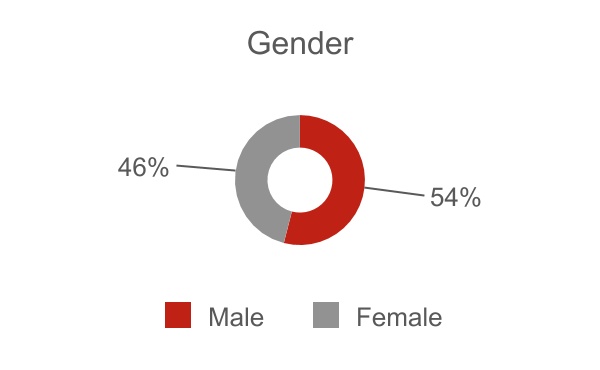
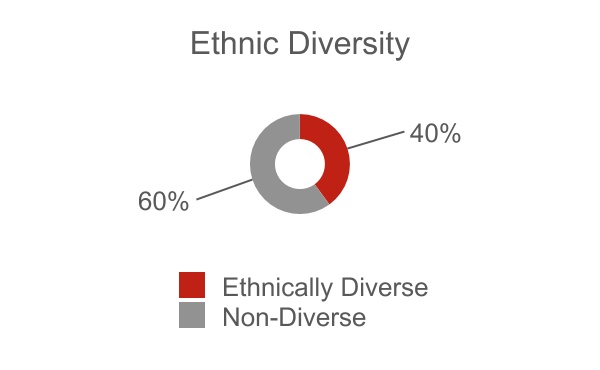
Environmental, Social and Governance Strategy
PAC’s commitment to initiatives that promote diversity and inclusion are part of a broader effort to ensure that environmental, social and governance (ESG) considerations and goals are incorporated into our corporate strategy. To push our ESG initiative forward, our Sustainability Committee comprised of employees, senior management and a member of our Board of Directors advocate energy conservation measures and sustainability initiatives throughout our organization, including workforce development and training opportunities, community service projects through our PAC Gives Back initiative, and health and wellness programs for our associates and tenants as described below:
28 | ||||||||
CORPORATE GOVERNANCE
Training and Education. We have educational training programs known as our Soaring Series that trains our employees to help strengthen their management skills and build camaraderie, and to assist them in understanding and implementing management-level responsibilities.
Recognition. We emphasize recognizing our employees for their achievements and rewarding them for their successes. Each year, we identify a select group of employees who demonstrate outstanding achievements during the year with our Eagle Club and Commitment to Excellence awards. Additionally, we have a spotlight employee of the month award initiative that recognizes a particular employee for her or his achievements.
Employee Health. We have focused on the health and well-being of our employees by organizing a PAC Gets Fit program to encourage a healthy lifestyle. Activities have included fitness challenges and organized 5Ks and 10Ks to promote physical and mental health and wellness. We evaluate our group health and ancillary benefits annually to ensure our benefits package is robust. We also created our Eagle’s Perch, a café-style environment, to promote increased social interactions among our property support center employees.
Compensation and Benefits. In 2020, we revamped our compensation program to provide a mix of base salary, short-term cash incentive compensation, and long-term equity incentive compensation that includes objective benchmarking, time-based and performance-based vesting, and peer comparisons where appropriate. We believe this new design will retain and motivate key contributors to the company’s profitability and growth; align employee and investor interests; provide incentive compensation that places a strong emphasis on financial performance with the flexibility to assess operational and individual performance; provide a means to reward for strong performance; and to foster an ownership mentality among program participants. We also provide a competitive benefits package, including a 401(k) plan with a company match, flexible spending and health saving accounts, medical, dental and vision insurance plans, a paid parental leave policy, and company-paid short-term disability and long-term disability programs.
PAC Gives Back. We value and continue to emphasize culture and giving back to the community. We started a PAC Gives Back community philanthropic initiative and as a part of this initiative, our employees have volunteered hours and have participated in fund raising efforts for a number of charities, including the Atlanta Community Food Bank. We are proud to make these communities better places to live and work through our volunteerism and philanthropy initiatives.
Fostering Company Culture and Providing Support to Employees During COVID-19 Pandemic. At PAC, we are focused on the continued health and safety of our employees, residents and tenants. We effectively implemented our business continuity plans, including full “work-from-home” policies in March 2020. To protect and foster the Company’s culture during the COVID-19 pandemic, we formed a COVID-19 taskforce that organized surveys, virtual hangout events and other remote programming to keep our employees connected while working from home. Following the installation of hand sanitizer stations as well as supplying our employees with personal protective equipment, or PPE, we have now reopened our corporate headquarters and most of our multifamily leasing offices while promoting social distancing practices in accordance with state and local mandates and restrictions. We have also halted all non-essential business travel, introduced video call technology and self-guided tour options to provide uninterrupted customer service for our residents and visitors. The health and safety of our employees and tenants remains a top priority so we continue to maintain a flexible approach as we navigate the COVID-19 pandemic.
In 2020, the Board, in recognition of the growing importance of these topics among our stakeholders, formalized its oversight of the Company’s ESG initiatives through oversight by the Nominating and Corporate Governance Committee. The Committee will receive regular updates regarding the Company’s progress on these efforts. For the second year in a row, we participated in the Global Real Estate Sustainability Benchmark (“GRESB”) annual survey, which measures the environmental performance of property portfolios around the world and is endorsed by large institutional investors. Our score improved year over year and in 2020, we continued to implement environmentally friendly changes throughout our portfolio including LED lighting upgrades, water submeter installations, and upgrading and automating critical building systems.
In 2020, PAC, in an effort to implement uniform sustainability practices across our Company and supply chain, adopted an environmental policy, a vendor supply chain policy, a human rights policy and an environmental management system to check and monitor our utility management systems. These policies may be accessed on our website at www.pacapts.com by selecting the “Investors” link, following by the “Governance Documents” link under the “Corporate Governance” drop-down menu, and are available in print upon request from our Secretary. The information on our website is not a part of this Proxy Statement.
29 | ||||||||
 | |||||||||||
| CERTAIN RELATIONSHIPS AND RELATED TRANSACTIONS | |||||||||||
 | |||||||||||
Certain Relationships and Related Transactions
Internalization
On January 31, 2020, the Company internalized the functions performed by the Manager and NMP Advisors, LLC (the “Sub-Manager”) by acquiring the entities that own the Manager and the Sub-Manager (such transactions, collectively, the “Internalization”) for an aggregate net price of approximately $111.1 million (the “Net Price”), plus up to $25 million of additional consideration (the “Additional Amount”).
The Internalization Transaction was effected pursuant to a stock purchase agreement, dated as of January 31, 2020 (the “Stock Purchase Agreement”), by and among the Company, Preferred Apartment Communities Operating Partnership, L.P. (“PAC OP”), the Company, Carveout, LLC (“PAC Sub”), NELL Partners, Inc. (“NELL”), NMA Holdings, Inc. (“NMA”), Mortwat, LLC, Northside Partners Trust, Nancy Ann Richardson Williams 2017 Children’s Trust, Caitboo Family Trust, Fairmont Green Trust, and Murphy Capital and Advisory Group LLC. The Manager was a wholly owned subsidiary of NELL and the Sub-Manager was a wholly owned subsidiary of NMA. Trusts established, or entities owned, by the family of John A. Williams, the Company’s former chairperson of the Board and Chief Executive Officer (the “Williams Trust”), Daniel M. DuPree, the Company’s Executive chairperson of the Board and former Chief Executive Officer (the “DuPree Owner”), and Leonard A. Silverstein, the Company’s former Vice chairperson of the Board, and former President and Chief Operating Officer (the “Silverstein NELL Trust”), were the owners of NELL. NELL was owned 55% by the Williams Trust, 30% by the Silverstein NELL Trust and 15% by the DuPree Owner. Trusts established, or entities owned, by Joel T. Murphy, the Company’s President and Chief Executive Officer and a member of the Board (the “Murphy Owner”), the Williams Trust, Mr. DuPree (the “DuPree Trust”, and together with the DuPree Owner, the “DuPree Owners”) and Mr. Silverstein (the “Silverstein NMA Trust” and together with the Silverstein NELL Trust, the “Silverstein Owners”) were the owners of NMA. Each of the owners of NMA owned 25.0% until just prior to the Internalization. Just prior to the Internalization, an entity owned by Mr. Murphy had a profits interest in the Sub-Manager that was converted into an interest in NMA (the “Murphy Conversion”). Following the Murphy Conversion, the Murphy Owner owned 60% of NMA and the other three owners owned approximately 13.33% each. Of the Net Price for the Internalization, approximately 44.2% was paid to the Williams trust, approximately 25.7% was paid to the Silverstein Owners, approximately 14.6% was paid to the DuPree Owners and approximately 15.6% was paid to the Murphy Owner.
The Special Committee, after consultation with its independent legal and financial advisors, determined that the Stock Purchase Agreement and the transactions contemplated by the Stock Purchase Agreement were fair to and in the best interests of the Company and the Company’s stockholders and recommended that the Board authorize and approve the Stock Purchase Agreement and the transactions contemplated thereby. Upon such recommendation from the Special Committee, the Board authorized and approved the Stock Purchase Agreement and the transactions contemplated thereby. Pursuant to the Company’s governing documents, approval by the Company’s stockholders was not required for the execution of the Stock Purchase Agreement or the consummation of any of the transactions contemplated thereby.
Pursuant to the Stock Purchase Agreement, the sellers sold all of the outstanding shares of capital stock of NELL and NMA to PAC Sub in exchange for an aggregate of approximately $111.1 million in cash paid at the closing which reflects the satisfaction of certain indebtedness of NELL, the estimated net working capital adjustment, and a hold back of $15 million for certain specified matters (the “Specified Matters Holdback Amount”). The Specified Matters Holdback Amount is payable to the NELL sellers less certain losses following final resolution of any such specified matters.
Additionally, upon the occurrence of a Payment Trigger (as defined below), PAC Sub will promptly (but in any event, within five (5) business days of the date of such Payment Trigger) pay to the sellers of NELL and NMA the Additional Amount. A “Payment Trigger” will occur upon the earlier of (i) if, for the immediately preceding fiscal year beginning on January 1, funds from operations (“FFO”) of the Company per weighted average basic share of the Company’s common stock and Class A Unit (as defined in the limited partnership agreement of PAC OP) outstanding for such fiscal year is determined to be greater than or equal to $1.55 or (ii) on the thirty-six (36) month anniversary of the closing of the Internalization; provided, that in no event can the Payment Trigger occur (and the Additional Amount be paid) more than once.
The Stock Purchase Agreement contained customary representations and warranties, including regarding organization and good standing, power and authority, capitalization and ownership, financial statements and
31 | ||||||||
PREFERRED APARTMENT COMMUNITIES 2021 PROXY STATEMENT
liabilities, litigation, compliance with laws, absence of changes, taxes, material contracts, employee matters, real properties, intellectual property, affiliate transactions and brokerage arrangements. The representations and warranties of the parties in the Stock Purchase Agreement survive the closing of the Internalization for a period of twelve (12) months, except that certain fundamental representations and warranties survive for sixty (60) days after the expiration of the applicable statute of limitations.
PAC Sub purchased a representations and warranties insurance policy (the “R&W Policy”) in connection with the Internalization. PAC Sub will be able to make claims against the R&W Policy in the event that the representations and warranties of the sellers contained in the Stock Purchase Agreement are subsequently discovered to have been inaccurate as of the date of the Stock Purchase Agreement, subject to customary exceptions and limitations. The Company may not, subject to certain exceptions, pursue a claim for indemnification under the Stock Purchase Agreement unless such claim is the subject of a specific exclusion from coverage under the R&W Policy.
The foregoing description of the terms of the Stock Purchase Agreement and the transactions contemplated by the Stock Purchase Agreement does not purport to be complete and is qualified in its entirety by reference to the Stock Purchase Agreement, a copy of which was filed as Exhibit 2.1 to the Company′s Current Report on Form 8-K filed with the SEC on February 3, 2020.
Management Agreement
We had entered into a sixth amended and restated management agreement (as amended, the “Management Agreement”) with our Manager to manage our day-to-day operations. We ceased paying management fees or reimbursing expenses to third parties pursuant to the Management Agreement as of January 31, 2020 once the Internalization was complete. Pursuant to the Management Agreement, our Manager provided us with a management team and appropriate support personnel to implement our business strategy and perform certain services for us, subject to oversight by our Board, through January 31, 2020. Our Manager had an investment committee that oversaw our investment guidelines, our investment portfolio and its compliance with our investment guidelines and policies. We did not have any employees while the Management Agreement was in place.
The Management Agreement provided for the Manager to be paid fees in connection with services provided to us. These fees included asset management, acquisition, disposition, general and administrative expense, multifamily property management and leasing, retail management, retail leasing and construction, development and landscaping. The asset management fee was equal to one-twelfth of 0.50% of the total value of our assets (including cash or cash equivalents) based on the adjusted cost of our assets before reduction for depreciation, amortization, impairment charges and cumulative acquisition costs charged to expense in accordance with generally accepted accounting principles (“GAAP”) (adjusted cost will include the purchase price, acquisition expenses, capital expenditures and other customarily capitalized costs), payable monthly in arrears. Prior to January 1, 2016, and following June 30, 2017, an acquisition fee equal to 1.0% of the gross contract purchase price of the property, loan or other real estate-related asset purchased, was paid for services in connection with selecting, evaluating and acquiring such asset. The multifamily property management and leasing fee and the retail management fee were 4% of the monthly gross revenues of our properties managed and the management fees for office building assets was within the range of 2.0% to 2.75% of gross property revenues, all for services in connection with the rental, leasing, operation and management of our properties and the supervision of any third parties that were engaged by our Manager to provide such services and was payable monthly in arrears, based on the actual gross revenues for the prior month. The retail leasing fee for new leases was equal to the greater of (i) $4.00 per square foot or (ii) the sum of 4.0% of the aggregate base rent for the first ten years of the lease. The retail leasing fee for renewals was equal to the greater of (i) $2.00 per square foot or (ii) the sum of 2.0% of the aggregate base rent for the first ten years of the lease. Notwithstanding the foregoing, retail leasing fees did not exceed customary competitive
32 | ||||||||
CERTAIN RELATIONSHIPS AND RELATED TRANSACTIONS
rates for the market. The office leasing commission fees (a) for new office leases were equal to 50.0% of the first month’s gross rent plus 2.0% of the remaining fixed gross rent on the guaranteed lease term, (b) in the event of co-broker participation in a new lease, the leasing commission determined for a new lease was equal to 150.0% of the first month’s gross rent plus 6.0% of the remaining fixed gross rent of the guaranteed lease term, and (c) for lease renewals, was equal to 2.0% of the fixed gross rent of the guaranteed lease term or, in the event of a co-broker, 6.0% of the fixed gross rent of the guaranteed lease term. Office leasing commission fees did not exceed market rates for office leasing services. The general and administrative expense fee was 2.0% of our monthly gross revenues, and was payable monthly in arrears based on the actual gross revenues of the Company for the prior month. The disposition fee payable upon the sale of one or more of our properties or other assets was an amount equal to 1% of the contract sales price of the asset. Any construction fee, development fee and landscaping fee we paid our Manager, was at market rates customary and competitive in light of the size, type and location of the asset in connection with the construction, development or landscaping of a property, or for management and oversight of expansion projects and other capital improvements. Also, did reimburse our Manager for certain costs and expenses it incurs in connection with the services it provides to us. However, the total amount of the asset management, multifamily property management and leasing, retail management, retail leasing and general and administrative expense fees and expenses paid or reimbursed to our Manager were capped at 1.5% of total value of our assets (including cash and cash equivalents) based on the adjusted cost of our assets before reduction for depreciation, amortization, impairment charges and cumulative acquisition costs charged to expense in accordance with GAAP (adjusted cost will include the purchase price, acquisition expenses, capital expenditures and other customarily capitalized costs). From January 1, 2016 to June 30, 2017, the acquisition fee was eliminated and replaced with a loan origination fee or a loan coordination fee. The loan origination fee was 1.0% of the amount that may be advanced by us for a loan for services in connection with selecting, evaluating and documenting such loan investment. From January 1, 2016 to June 30, 2017, the loan coordination fee was: (1) 1.6% of (i) the initial amount of new debt financed or outstanding debt assumed, other than a refinancing, related to any type of asset owned, directly or indirectly; (ii) the additional amount of any supplemental financing related to any asset owned, directly or indirectly; and (iii) for any acquisition (by purchase, investment or exchange) of asset acquired without any new or assumed debt financing, an amount equal to 63.0% of the purchase price for the acquisition, inclusive of expenses related thereto, but exclusive of any loan coordination fee; less (2) the aggregate amount of loan coordination fees and loan origination fees previously paid in connection with the asset. Following June 30, 2017, the loan coordination fee was reduced from 1.6% to 0.6% and the loan coordination fee for assets acquired without any new or assumed debt financing was eliminated.
The Manager forfeited some of the asset management, property management, and general and administrative fees for properties owned by the Company. An aggregate total of approximately $23.0 million of combined asset management and general and administrative expense fees were contingent as of December 31, 2019. At January 31, 2020, all contingent fees were eliminated in connection with Internalization.
33 | ||||||||
PREFERRED APARTMENT COMMUNITIES 2021 PROXY STATEMENT
Management Agreement Fees
Until January 31, 2020, the Management Agreement entitled the Manager to receive compensation for various services it performed related to acquiring and financing assets, originating loans and managing properties on the Company′s behalf:
(in thousands) | Twelve months ended December 31, | |||||||||||||||||||||||||
| Type of Compensation | Basis of Compensation | 2020 | 2019 | 2018 | ||||||||||||||||||||||
| Acquisition fees | 1% of the gross purchase price of real estate assets | $ | 235 | $ | 7,203 | $ | 10,699 | |||||||||||||||||||
| Loan origination fees | 1.0% of the maximum commitment of any real estate loan, note or line of credit receivable | — | 783 | 2,166 | ||||||||||||||||||||||
| Loan coordination fees | January 1, 2016 to June 30, 2017, 1.6% of any assumed, new or supplemental debt incurred in connection with an acquired property. After June 30, 2017, 0.6% of any assumed, new or supplemental debt incurred in connection with an acquired property. | 47 | 2,939 | 3,897 | ||||||||||||||||||||||
| Asset management fees | Monthly fee equal to one-twelfth of 0.50% of the total book value of assets, as adjusted | 1,349 | 15,596 | 14,698 | ||||||||||||||||||||||
| Property management fees | Monthly fee equal to 4% of the monthly gross revenues of the properties managed | 890 | 10,274 | 8,934 | ||||||||||||||||||||||
| General and administrative expense fees | Monthly fee equal to 2% of the monthly gross revenues of the Company | 616 | 6,177 | 6,022 | ||||||||||||||||||||||
| Construction management fees | Quarterly fee for property renovation and takeover projects | 14 | 264 | 408 | ||||||||||||||||||||||
| Disposition fees | 1% of the sale price of a real estate asset | — | 282 | 1,710 | ||||||||||||||||||||||
| Contingent asset management and general and administrative fees | Recognized upon the disposition of a real estate asset that generates above a 7% return | — | 11 | 671 | ||||||||||||||||||||||
| $3,151 | $43,529 | $49,205 | ||||||||||||||||||||||||
Management fees paid to the Manager by the Company relating to the assets of New Market Properties were passed through to NMP Advisors, LLC, which was the sub-manager pursuant to a Sub-Management Agreement with the Manager, and totaled approximately $11.9 million for the year ended December 31, 2019. Distributions paid by the Manager and the Sub-Manager to the ultimate owners of such entities were paid in proportion to the respective ownership interests of such owners. Aggregate distributions paid by the Manager and the Sub-Manager to their respective ultimate owners for the year ended December 31, 2019 were $836,125.00 and $4,200,915.00, respectively. The Manager made no distributions to its owners in 2020. Prior to the Internalization, the Sub-Manager made aggregate distributions in 2020 of $1,729,999.00 to its ultimate owners for the year ended December 31, 2019.
Affiliate Loans
We had extended a revolving line of credit to the Manager in an aggregate amount of up to $24.0 million (the “PAA Line”) in order to provide liquidity to the Manager in support of its ongoing business operations. The PAA Line bore interest at 6.0% per annum from January 1, 2018 until December 31, 2018, with interest paid monthly. Starting January 1, 2019, the PAA Line bore interest at 7.5% per annum. At December 31, 2019, the amount drawn by the Manager on the PAA Line was approximately $15.2 million. At January 31, 2020, the amount drawn by the Manager on the PAA Line was approximately $20.1 million. For the year ended December 31, 2019, interest revenue on the PAA Line from our Manager was approximately $1.1 million.
34 | ||||||||
CERTAIN RELATIONSHIPS AND RELATED TRANSACTIONS
We had extended a loan to Preferred Capital Marketing Services, LLC, or PCMS, in the original principal amount of $1.5 million (the “PCMS Loan”). PCMS was under common control with our Manager. This loan bore interest at 10.0% per annum, with interest payable monthly. At January 31, 2020 and December 31, 2019, the amount owed on the PCMS Loan was approximately $0.65 million, and for the year ended December 31, 2019, interest revenue on the PCMS Loan was approximately $69,500.
On January 31, 2020, the PAA Line and the PCMS Loan were deemed satisfied in full in connection with Internalization by reducing the purchase price paid to the NELL sellers.
Conflicts of Interest
We anticipate that future acquisitions by us of assets likely will be from unaffiliated third parties, but we would still consider acquisitions from affiliated third parties if any such acquisition made financial sense to us and was approved by our Audit Committee. Our independent directors have an obligation to function on our behalf in all situations in which a conflict of interest may arise, and all our directors have a duty to act in a manner reasonably believed to be in our best interest.
Certain Conflict Resolution Procedures
Every transaction that we enter into with our executive officers, any member of our Board or any of their respective affiliates or related parties, and any other of our related persons will be subject to an inherent conflict of interest. Our Board may encounter conflicts of interest in enforcing our rights against any affiliate in the event of a default by or disagreement with an affiliate or in invoking powers, rights or options pursuant to any agreement between us and our executive officers and members of our Board or any of their respective affiliates or related parties, and any other of our related persons. In order to reduce or eliminate certain potential conflicts of interest, our Audit Committee will review (i) all transactions we enter into with our executive officers, any member of our Board or any of their respective affiliates or related parties, and any other of our related persons, and (ii) the allocation of investment opportunities among affiliated entities. We do not have a formal written policy for approval or ratification of such transactions, as all such transactions are evaluated on a case-by-case basis.
In addition, our code of business conduct and ethics requires all of our personnel to be vigilant in avoiding a conflict of interest as it relates to our interests and the interests of our officers, employees and directors. The code prohibits us from, among other things, entering into a transaction or a business relationship with such a related person or in which such a related person has a substantial financial interest, unless such transaction and relationship are disclosed to and approved in advance by our Audit Committee.
Each of our directors and executive officers is required to complete an annual disclosure questionnaire and report all transactions with us in which they and their immediate family members had or will have a direct or indirect material interest with respect to us. We review these questionnaires and, if we determine that it is necessary, discuss any reported transactions with the entire Board. We do not have a formal written policy for approval or ratification of such transactions, as all such transactions are evaluated on a case-by-case basis.
Wiregrass Ranch Acquisition
The Company acquired Altis Wiregrass Ranch, a 392-unit Class A multifamily community located in the Tampa, Florida MSA ("Wiregrass Ranch") on March 31, 2020. Wiregrass Ranch was developed by the Altman Companies. Timothy A. Peterson is a member of management of the Altman Companies and owned an equity interest in the seller of Wiregrass Ranch. Mr. Peterson is the chairperson of the Audit Committee. This transaction was approved by a committee of the Board comprised entirely of independent directors uninterested in the transaction.
35 | ||||||||
PREFERRED APARTMENT COMMUNITIES 2021 PROXY STATEMENT
Other Related Person Transactions Related to Mill Green
Mill Green Partners, LLC (“Mill Green”) was formed in 2014 for the purpose of raising capital from third-party investors to invest in real estate development projects through investment funds sponsored and managed by Mill Green (the “MG Funds”). The MG Funds used investor capital to make equity investments in multifamily and student housing development properties (“MG Development Projects”) identified by real estate developers with whom Mill Green or the Company had existing relationships. Mill Green was and is entitled to receive management fees, transaction fees and incentive distributions relating to the MG Funds.
The Company extended real estate related loans to the MG Development Projects (“MG RE Loans”) to finance their real estate development activities. The MG RE Loans made by the Company were provided on comparable terms and conditions that were provided in other Company development projects in which MG Funds did not participate. To date, the MG Funds have only made equity investments for development projects in which the Company has provided real estate related loan financing. The Company also extended loans (“MG Member Loans”) to special purpose entities (“MG SPEs”) that the MG Funds and the applicable real estate developers formed to make equity investments in the MG Development Projects. The MG SPEs used the proceeds from the MG Member Loans to fund a portion of the equity investments in the joint venture between the MG SPE and the applicable third party real estate developer. The MG Member Loans were provided on comparable terms and conditions that were provided for other Company development projects in which MG Funds did not participate. The MG Member Loans have been accounted for as real estate loan investments by the Company in its financial statements.
Leonard A. Silverstein was the Vice Chairperson of our Board of Directors during fiscal 2019 and until May 7, 2020, and was our President and Chief Operating Officer during fiscal year 2019 and through March 3, 2020. Fairmont Green Trust, a family trust benefiting Mr. Silverstein and his children (the “Silverstein Family Trust”), owned 20% of the membership interests in Mill Green during 2019. As a result of this ownership interest, Mr. Silverstein and members of his family may be deemed to have had an indirect interest in certain transactions between or among the Company, Mill Green, the MG Funds, the MG SPEs and the MG Development Projects, which are described below. In addition, the Silverstein Family Trust made a $250,000 investment in one of the MG Funds and, as a result, received distributions from such MG Fund of $18,180 in 2019. The Silverstein Family Trust’s interest in the transactions described below is limited to its proportional interest in Mill Green and its investment in the MG Fund.
Mill Green typically earns a one-time fee of 85 bps of the amount an MG Fund invests in a development project (an “Acquisition Fee”). All Acquisition Fees have been transferred or paid by Mill Green to Preferred Capital Marketing Services, LLC (“PCMS”). PCMS was owned by NELL Partners, Inc. and, therefore, was under common control with the Manager. Neither the entity owned by the Chief Executive Officer of Mill Green (the “MG Manager”) through which the MG Manager indirectly owned a 60% interest in Mill Green nor any of their affiliates received any portion of the Acquisition Fees transferred or paid by Mill Green to PCMS.
As described in this Proxy Statement, the Company had an outstanding loan to PCMS in the original principal amount of $1.5 million (the “PCMS Loan”). From January 1, 2019 through January 31, 2020, Acquisition Fees transferred or paid by Mill Green to PCMS in an aggregate amount of $113,389 were utilized by PCMS to pay down the PCMS Loan, leaving, as of January 31, 2020, an unpaid principal balance of the PCMS Loan equal to $649,641, which was deemed satisfied in full on January 31, 2020 in connection with Internalization by reducing the purchase price paid to the NELL sellers.
36 | ||||||||
CERTAIN RELATIONSHIPS AND RELATED TRANSACTIONS
The table below sets forth additional information regarding the MG RE Loans and the MG Member Loans referred to above.
| Loan | MSA | Origination Date | Largest Aggregate Amount of Principal Outstanding in 2019 | Amount of Principal Outstanding (as of 12/31/19) | Amount of Principal Paid(1) | Amount of Interest Paid(2) | Rate or Amount of Interest Payable(3) | ||||||||||||||||
| Bishop Street | Atlanta, GA | 2/18/2016 | $ | 12,693,457 | — | $ | 12,693,457 | $ | 5,766,019 | 13.5% | |||||||||||||
| Wiregrass | Tampa, FL | 11/16/2016 | $ | 19,215,755 | $ | 19,215,755 | — | $ | 4,208,898 | 15.0% | |||||||||||||
| 360 Forsyth | Forsyth, GA | 12/2/2016 | $ | 21,512,806 | $ | 21,512,806 | — | $ | 3,793,784 | 14.0% | |||||||||||||
Haven Charlotte(4) | Charlotte, NC | 12/22/2016 | $ | 27,782,763 | — | $ | 27,782,763 | $ | 6,918,373 | 15.0% | |||||||||||||
| Morosgo | Atlanta, GA | 7/31/2017 | $ | 17,352,587 | $ | 17,352,587 | — | $ | 2,970,616 | 14.0% | |||||||||||||
| 360 Fort Myers | Fort Myers, FL | 8/3/2017 | $ | 14,776,219 | $ | 14,776,219 | — | $ | 2,539,923 | 14.0% | |||||||||||||
| University City/Gateway | Charlotte, NC | 8/18/2017 | $ | 16,906,247 | $ | 16,906,247 | — | $ | 2,649,295 | 13.5% | |||||||||||||
| Cameron Park | Alexandria, VA | 4/11/2018 | $ | 26,816,685 | $ | 26,816,685 | — | $ | 3,226,731 | 11.5% | |||||||||||||
| Brentwood | Antioch, TN | 5/24/2018 | $ | 10,679,974 | $ | 10,679,974 | — | $ | 1,110,038 | 13.0% | |||||||||||||
| Kingson | Fredericksburg, VA | 8/31/2018 | $ | 11,592,615 | $ | 11,592,615 | — | $ | 889,254 | 12.5% | |||||||||||||
| Vintage Destin | Destin, FL | 3/25/2019 | $ | 8,932,172 | $ | 8,932,172 | — | $ | 302,345 | 12.5% | |||||||||||||
| Hidden River II | Tampa, FL | 4/12/2019 | $ | 5,269,586 | $ | 5,269,586 | — | $ | 130,732 | 12.0% | |||||||||||||
| Kennesaw Crossing | Kennesaw, GA | 8/16/2019 | $ | 7,615,787 | $ | 7,615,787 | — | $ | 198,279 | 14.0% | |||||||||||||
| Vintage Horizon West | Orlando, FL | 10/11/2019 | $ | 8,274,850 | $ | 8,274,850 | — | $ | 74,828 | 14.0% | |||||||||||||
Palisades(5) | Manassas, VA | 12/23/2013 | $ | 17,250,145 | $ | 17,250,145 | — | $ | 5,452,531 | 13.0% | |||||||||||||
(1)Aggregate amounts paid in 2019.
(2)Aggregate amounts paid during the period 2016 through 2019.
(3)This rate is per annum and is applicable to all loans for the project. This is the rate at the inception of the loan(s) and may have changed at a later date.
(4)The purchase option on this property was terminated on March 2019 and the Company received a termination fee of $3.2 million. The Company subsequently purchased this property for approximately $92.4 million.
(5)The Palisades loan was originated in December 2013. Mill Green acquired its equity investment in this project in December 2015.
37 | ||||||||
 | |||||||||||
PROPOSAL NO. 2 APPROVAL OF THE FIRST AMENDMENT TO THE 2019 STOCK INCENTIVE PLAN | |||||||||||
 | |||||||||||
Proposal No. 2 Approval of the First Amendment to the 2019 Stock Incentive Plan | Our Board of Directors recommends a vote FOR approving the First Amendment to the 2019 Stock Incentive Plan to increase the aggregate number of shares of common stock that may be issued under the 2019 Stock Incentive Plan by 1,200,000 shares. | ||||
Amendment
On March 31, 2021, our Board adopted the First Amendment to our 2019 Stock Incentive Plan, subject to approval by holders of our common stock. If approved by the holders of our common stock, this proposed amendment to the 2019 Stock Incentive Plan would increase the aggregate number of shares of our common stock that may be issued under the 2019 Stock Incentive Plan by 1,200,000 shares.
Our Board has unanimously determined that this amendment is advisable and in the best interests of the Company and its stockholders, and has submitted the amendment to be voted on by the holders of our common stock at the Annual Meeting. Should stockholder approval of the First Amendment not be obtained, the First Amendment to the 2019 Stock Incentive Plan will not be implemented. The 2019 Stock Incentive Plan, however, will continue in effect and we may continue to grant awards thereunder, but the Company would be limited in its ability to grant equity awards in the future as a key component of its Compensation Program (as defined in the Compensation Discussion and Analysis below).
A complete copy of the proposed First Amendment to the 2019 Stock Incentive Plan is attached as Annex A to this Proxy Statement. A full copy of the 2019 Stock Incentive Plan is attached as Annex A to the Company′s 2019 Proxy Statement filed by us with the SEC on March 17, 2019. The statements made in this Proxy Statement regarding the First Amendment to the 2019 Stock Incentive Plan should be read in conjunction with and are qualified in their entirety by reference to the terms of the First Amendment to the 2019 Stock Incentive Plan attached to this Proxy Statement as Annex A.
Reasons for the 2019 Stock Incentive Plan Amendment
As of March 31, 2021, an aggregate of [3,636,028] shares of our common stock have either been issued or are subject to outstanding awards under the 2019 Stock Incentive Plan or are subject to awards of Class B Units of our operating partnership that may subsequently have shares of common stock issued under the 2019 Stock Incentive Plan, leaving only no shares available for future issuance under the 2019 Stock Incentive Plan. This includes [1,969,137] shares for awards that are currently outstanding as follows:
•129,141 Class A Units of our operating partnership, which are fully earned and vested and are exchangeable for shares of our common stock on a one-for-one basis, or cash, as elected by us;
•809,437 shares of restricted common stock;
•[959,914] [TO BE UPDATE ONCE NUMBERS FINALIZED] Performance-based Restricted Stock Units (at maximum); and
•70,645 Restricted Stock Units.
We have no outstanding options or appreciation rights awards.
Given the Company′s current plans to continue paying a significant portion of director annual fees and a significant portion of executive officer compensation in equity-based awards, our Board does not believe the Company has sufficient available shares reserved for issuance under the 2019 Stock Incentive Plan.
Our Board believes that increasing the aggregate number of shares of our common stock issuable under the 2019 Stock Incentive Plan as contemplated by the First Amendment to the 2019 Stock Incentive Plan is essential to
39 | ||||||||
PREFERRED APARTMENT COMMUNITIES 2021 PROXY STATEMENT
facilitate the Company′s anticipated future growth by enabling it to attract and retain qualified officers and directors through equity participation in the Company. As discussed in the Compensation Discussion and Analysis beginning on page 45 of this Proxy Statement, our Board believes that our Compensation Program is directly linked to our business objectives of generating income for our stockholders and growing our market capitalization. The goals in preparing and adopting the Compensation Program are generally as follows:
•Retain and motivate key contributors to the Company′s profitability and growth;
•Align employee and stockholder interests;
•Provide incentive compensation that places a strong emphasis on financial performance, with the flexibility to assess operational and individual performance;
•Provide a means to reward for strong performance; and
•Foster an ownership mentality among program participants.
Information about Dilution, Overhang and Burn Rate
Dilution. The Board anticipates that the 1,200,000 additional shares being requested by the First Amendment to the 2019 Stock Incentive Plan will be sufficient to provide projected equity incentives plan grants for one to two years beyond 2021 based on grants made in early 2021.
The 1,200,000 new shares would represent approximately 2.3% of common stock outstanding as of March 31, 2021. The Board believes the First Amendment to the 2019 Stock Incentive Plan represents a reasonable amount of potential dilution and a strong alignment of interests between our Named Executive Officers, who are expected to be paid a significant portion of their compensation as equity compensation, and our other grant recipients under the 2019 Stock Incentive Plan, with those interests of all our stockholders.
Overhang. We calculate our “overhang” as the sum of (a) Class B Units and incentive based Class A Units outstanding; plus (b) unvested shares of restricted stock; plus (c) unvested and unearned restricted stock units outstanding; plus (d) shares available for grant under our 2019 Stock Incentive Plan divided by the sum of (x) common shares outstanding at fiscal year-end plus (y) the number of shares in the numerator. Our current overhang is approximately 3.8%. If Proposal 2 is approved by our stockholders, our overhang would be approximately 6.1% as of the Record Date.
Burn Rate. We calculate our “total equity burn rate” as (a) the total number of equity-related awards granted in any given fiscal year less any forfeited awards from that year divided by (b) the number of common shares outstanding at the end of that fiscal year. Our historical total equity burn rate from shares issued under the 2019 Stock Incentive Plan, calculated in terms of the average burn rate over the two-year period from 2019-2020 during which the 2019 Stock Incentive Plan has been outstanding, has been approximately 0.6%. For purposes of the forgoing, we have not applied any premium to the full-valued shares (as opposed to stock options) deemed awarded under the 2019 Stock Incentive Plan.
THE BOARD OF DIRECTORS UNANIMOUSLY RECOMMENDS THAT STOCKHOLDERS VOTE “FOR” APPROVAL OF THE FIRST AMENDMENT TO THE 2019 STOCK INCENTIVE PLAN. | ||
40 | ||||||||
 | |||||||||||
PROPOSAL NO. 3 PROPOSAL TO APPROVE (ON AN ADVISORY BASIS) COMPENSATION OF THE NAMED EXECUTIVE OFFICERS AS DISCLOSED IN THIS PROXY STATEMENT | |||||||||||
 | |||||||||||
Proposal No. 3 Proposal to Approve (on an Advisory Basis) Compensation of The Named Executive Officers as Disclosed in This Proxy Statement | Our Board of Directors recommends a vote FOR the proposal to approve compensation of the Named Executive Officers as Disclosed in this Proxy Statement | ||||
General
Our Board is committed to corporate governance best practices and recognizes the significant interest of stockholders in executive compensation matters. Pursuant to Section 14A of the Exchange Act, we are providing stockholders with the opportunity to cast an advisory vote on the 2020 compensation of our Named Executive Officers as disclosed in this Proxy Statement, including in the section entitled ”Compensation Discussion and Analysis,” the compensation tables and other executive compensation disclosures.
The stockholder vote will not be binding on us or our Board, and it will not be construed as overruling any decision by us or our Board or creating or implying any change to, or additional, fiduciary duties for us or our Board. Nevertheless, the Board’s Compensation Committee, which is comprised solely of independent directors and is responsible for making decisions regarding the amount and form of compensation paid to our executive officers, will carefully consider the stockholder vote on this matter, along with other expressions of stockholder views it receives on specific policies and desirable actions. If there are a significant number of unfavorable votes, we will seek to understand the concerns that influenced the vote and address them in making future decisions affecting the Compensation Program.
Our Board believes that our Compensation Program, which was completely redesigned following Internalization to be a mixture of base salary, cash incentive compensation, and equity incentive compensation, is intended to (1) attract, motivate and retain top talent at the Company; and (2) align the interests of management with those of our stockholders. For the full details of the redesign, see the Compensation Discussion and Analysis beginning on page 45 of this Proxy Statement.
Upon adoption of Proposal No. 3, the stockholders adopt the following resolution:
RESOLVED, that the compensation paid to the Company′s Named Executive Officers, as disclosed pursuant to Item 402 of Regulation S-K, including the Compensation Discussion and Analysis, compensation tables and narrative discussion is hereby approved on an advisory basis.
THE BOARD OF DIRECTORS UNANIMOUSLY RECOMMENDS THAT STOCKHOLDERS VOTE “FOR” THE APPROVAL (ON AN ADVISORY BASIS) OF THE COMPENSATION OF THE NAMED EXECUTIVE OFFICERS AS DISCLOSED IN THIS PROXY STATEMENT. | ||
42 | ||||||||
 | |||||||||||
COMPENSATION DISCUSSION AND ANALYSIS | |||||||||||
 | |||||||||||
Executive Compensation
Compensation Discussion and Analysis
Our Compensation Discussion and Analysis describes our Compensation Program, objectives and policies for our Named Executive Officers for fiscal year 2020. Our Named Executive Officers in this Compensation Discussion and Analysis are as follows:
•Joel T. Murphy, President and Chief Executive Officer;
•John A. Isakson, Executive Vice President and Chief Financial Officer;
•Michael J. Cronin, Executive Vice President, Chief Accounting Officer and Treasurer;
•Jeffrey D. Sherman, President – Multifamily; and
•Parker Boone DuPree, President – Office.
Overview of Compensation Program and Philosophy
Pre-Internalization
We had no employees prior to February 1, 2020. We were externally managed by our Manager pursuant to the Management Agreement until January 31, 2020. All our Named Executive Officers were employees of our Manager and/or affiliates of our Manager that provided services to us until January 31, 2020. Beginning February 1, 2020, we began paying cash compensation and establishing compensation arrangements for our Named Executive Officers.
Post-Internalization
Following Internalization, we began paying annual salaries, and providing standard, company-wide, health and welfare benefits, for our Named Executive Officers on February 1, 2020 at approximately the same rates and under the same plans the Manager had in place in January 2020. We had approximately 402 employees at December 31, 2020. In addition and in connection with the Internalization, the Compensation Committee engaged FPL Associates (“FPL”), a nationally recognized compensation consultant specializing in the REIT industry, to work on designing a new comprehensive executive compensation program for the Company (the “Compensation Program”).
44 | ||||||||
COMPENSATION DISCUSSION AND ANALYSIS
| Pre-Internalization Compensation Program |  | Post-Internalization Compensation Program | ||||||||||||||||||
| u | No employees | u | 402 employees at December 31, 2020, including 5 Named Executive Officers. | |||||||||||||||||
| u | No cash compensation paid by the Company | |||||||||||||||||||
| u | No base salaries | u | Base salaries paid by the Company | |||||||||||||||||
| u | No cash bonuses | u | CEO base salary 44.0% less than Former CEO | |||||||||||||||||
| u | Discretionary equity could be awarded | u | Traditional Short-Term Incentive Program bifurcated between objective and subjective performance goals | |||||||||||||||||
| u | No equity compensation granted in 2019 by the Company | |||||||||||||||||||
| u | No equity compensation granted in January 2020 prior to Internalization | u | Weighted 70% on pre-defined objective metrics and 30% on subjective individual performance (CEO/CFO) and 50% each for other Named Executive Officers | |||||||||||||||||
| u | Target Long-Term Incentive Program equity awards to be awarded every year to our Named Executive Officers | |||||||||||||||||||
| u | 50% of the awards are time-based and will vest ratably over four years | |||||||||||||||||||
| u | 50% of the awards are based on three-year performance and will vest 50% at the conclusion of the performance period and 50% one year thereafter, if earned | |||||||||||||||||||
| u | Performance-based long-term incentive awards to our Named Executive Officers are based on objective performance | |||||||||||||||||||
| u | Weighted 100% on relative TSR over three year performance period for 2020 awards | |||||||||||||||||||
| u | Relative TSR performance targets to outperform the peers | |||||||||||||||||||
| u | The Company must achieve at least the 55th percentile of the peer group in order to earn the full target value of the award | |||||||||||||||||||
| u | Inclusion of an absolute TSR modifier whereby the payout is capped if our TSR is negative | |||||||||||||||||||
The Compensation Program was designed to provide competitive pay to our Named Executive Officers that includes (i) a mix of base salary, short-term cash incentive compensation, and long-term equity incentive compensation; (ii) objective benchmarking; (iii) time-based and performance-based vesting; and (iv) peer comparisons where appropriate.
The goals in preparing and adopting the Compensation Program were generally as follows:
•Retain and motivate key contributors to the Company′s profitability and growth;
•Align employee and stockholder interests;
•Provide incentive compensation that places a strong emphasis on financial performance, with the flexibility to assess operational and individual performance;
•Provide a means to reward for strong performance; and
•Foster an ownership mentality among program participants.
45 | ||||||||
PREFERRED APARTMENT COMMUNITIES 2021 PROXY STATEMENT
| What We Do | What We Don't Do | |||||||||||||
| ü | The majority of our Named Executive Officer compensation is at-risk | û | We do not guarantee salary increases, cash incentive compensation, or equity grants | |||||||||||
| ü | We cap short-term and long-term performance award payouts at 150% and 200% of target, respectively | û | We do not provide excise tax gross-ups | |||||||||||
û | We do not allow for single trigger change in control payments, except for limited vesting provisions relating to performance-based equity awards following a change in control | |||||||||||||
| ü | We have a clawback policy allowing us to recoup any incentive pay earned by executives participating in fraud or intentional misconduct resulting in restated financials | |||||||||||||
û | Executive officers and directors are prohibited from hedging or transacting in derivative securities of the Company or pledging Company stock as collateral for a loan | |||||||||||||
| ü | We have a one-year minimum vesting requirement under all equity awards (subject to certain exceptions for death, disability, or a change in control) | û | We do not provide excessive perquisites | |||||||||||
û | We do not maintain employment agreements or other individual agreements providing guaranteed employment terms | |||||||||||||
| ü | We engage an independent consultant to advise on executive compensation matters | |||||||||||||
| ü | We hold an annual say-on-pay advisory vote | û | No hedging or short sales of our common stock | |||||||||||
| ü | We have meaningful stock ownership guidelines for executives and directors | |||||||||||||
COVID-19 Impact
2020 was a transformative year for the Company where internalization of management of the Company occurred just prior to the start of the COVID-19 pandemic in the United States. The Compensation Committee was in the middle of its work on our post-Internalization Compensation Program when the COVID-19 pandemic hit, derailing efforts and delaying implementation of the Compensation Program until June of 2020. This delay was fortuitous in a couple ways. First, the delay allowed the Compensation Program for 2020 to be designed with the full uncertainty of the COVID-19 pandemic being grasped, and second, the Compensation Committee was able to fully process the results of our 2020 say-on-pay vote that was critical of our pre-Internalization compensation structure. With all of this in mind, the Compensation Program was adopted for 2020 with a structure that emphasized management's ability to successfully navigate the COVID-19 pandemic, put in place a framework for future years and attempted to address the concerns from the 2020 say-on-pay vote.
Role of the Compensation Consultant
As previously noted, the Compensation Committee engaged FPL as its independent compensation consultant to assist in the development of the Company’s post-Internalization Compensation Program. FPL’s consulting services included:
•Developing a compensation peer group to be used in evaluating the magnitude and design of pay appropriate for the Company following its Internalization;
•Utilizing compensation levels from the peer group to assist in establishing appropriate post-Internalization pay levels for our Named Executive Officers;
•Evaluating the pay mix utilized by peer companies to assist in determining the most appropriate post-Internalization pay mix at the Company; and
•Examining pay structures used by the peers to assist in developing appropriate incentive program structures.
Compensation Peer Group
In connection with the engagement, FPL worked with the Compensation Committee to establish a compensation peer group to be used in the development of the Company’s post-Internalization Compensation Program. In light of the Company’s diversified portfolio and multiple types of properties that are owned and operated, there are very few
46 | ||||||||
COMPENSATION DISCUSSION AND ANALYSIS
direct peers. FPL recommended the peer group consist of public REITs that are similar to the company in one or more of the following categories:
•Size (as defined by total capitalization)
•Property focused in diversified, multifamily, shopping centers, and office sectors
•The Company formerly invested in student housing properties but sold all student housing assets in November 2020. As such, FPL also included a student housing peer at the time of the peer group development as it aligned with the Company’s strategy at the time.
•Headquartered in Atlanta
The Company’s compensation peer group, used in setting 2020 compensation, consisted of the following 14 REITs:
| Property Type | |||||||||||||||||||||||
| Company Name | Diversified | Multifamily | Shopping Center | Office | Student Housing | Size(1) | Atlanta Headquarters | ||||||||||||||||
| American Campus Communities | þ | þ | |||||||||||||||||||||
| Bluerock Residential Growth REIT, Inc. | þ | þ | |||||||||||||||||||||
| Brixmor Property Group Inc. | þ | þ | |||||||||||||||||||||
| Columbia Property Trust, Inc. | þ | þ | þ | ||||||||||||||||||||
| Cousins Properties Incorporated | þ | þ | þ | ||||||||||||||||||||
| Independence Realty Trust, Inc. | þ | ||||||||||||||||||||||
| Investors Real Estate Trust | þ | ||||||||||||||||||||||
| JBG SMITH Properties | þ | þ | |||||||||||||||||||||
| Piedmont Office Realty Trust, Inc. | þ | þ | þ | ||||||||||||||||||||
| PS Business Parks, Inc. | þ | þ | |||||||||||||||||||||
| Retail Properties of America, Inc. | þ | þ | |||||||||||||||||||||
| SITE Centers Corp. | þ | þ | |||||||||||||||||||||
| Washington Real Estate Investment Trust | þ | þ | |||||||||||||||||||||
| Weingarten Realty Investors | þ | þ | |||||||||||||||||||||
(1)Defined as 0.5x to 2.0x of the Company’s total capitalization as of December 31, 2020.
Source: S&P Global
Say-On-Pay Vote
At our 2020 annual meeting of stockholders, we provided our stockholders with the opportunity to vote to approve, on an advisory basis, the compensation of our Named Executive Officers based on the their pre-Internalization compensation. A majority of our stockholders (64%) that voted on this proposal at the 2020 annual meeting of stockholders approved the compensation of our Named Executive Officers as described in our proxy statement for the 2020 annual meeting of stockholders. The Compensation Committee reviewed the results of this advisory “say-on-pay” vote and considered these results when working with FPL on the full Compensation Program for our Named Executive Officers following Internalization in 2020 and beyond. The Compensation Committee will also carefully consider the results of any stockholder advisory vote on executive compensation when making future decisions on the compensation of our Named Executive Officers, along with other expressions of stockholder views it receives on specific policies and desirable actions. The Company will have a say-on-pay vote at the Annual Meeting regarding the compensation of our Named Executive Officers as described in this Proxy Statement.
Say-on-Pay-Frequency Vote
At our 2018 annual meeting of stockholders, our stockholders who voted on the 2018 say-on-pay frequency vote recommended by a substantial majority (73%) that we hold an advisory stockholder vote on the compensation of our Named Executive Officers every year. As a result of this vote in 2018, the Company has determined that it will hold a say-on-pay vote each year until the next say-on-pay-frequency vote is held at the Company′s annual meeting
47 | ||||||||
PREFERRED APARTMENT COMMUNITIES 2021 PROXY STATEMENT
in 2024. Therefore, as noted above, an advisory vote on the Named Executive Officers compensation will be held at the Annual Meeting.
Executive Compensation
The Compensation Committee engaged FPL to assist with establishing a new executive compensation framework for the Company following Internalization. The new Compensation Program, as described in more detail below, was designed to generally accomplish the following:
•Retain and motivate key contributors to the Company’s profitability and growth;
•Align employee and stakeholder/investor interests;
•Provide incentive compensation that places a strong emphasis on financial performance with the flexibility to assess operational and individual performance;
•Provide a means to reward for strong performance; and
•Foster an ownership mentality among program participants.
This new compensation structure includes: (i) a mix of base salary, short-term cash incentive compensation, and long-term equity incentive compensation; (ii) objective benchmarking; (iii) time-based and performance-based vesting; and (iv) peer comparisons where appropriate.
48 | ||||||||
COMPENSATION DISCUSSION AND ANALYSIS
| Component | Vehicle | Objective | Key Features | |||||||||||||||||
 | Fixed | Base Salary | Cash | To provide a base level of fixed pay for executive officers based on role, scope of responsibilities, experience | •Reviewed annually and adjusted based on individual skill set, time in the role, and pay relative to peers | |||||||||||||||
| Variable | Short-Term Incentive Awards | Cash | To incentivize strong short-term performance and to reward executive officers for achieving annual corporate performance goals and individual performance results | •Based on pre-defined objective and subjective metrics •Under this program, 70% of our CEO and CFO's annual cash bonus will be based on quantitative (objective) performance and the remaining 30% will be based on individual (subjective) performance •For our Other NEOs under the program, 50% will be based on quantitative (objective) performance and the remaining 50% will be based on individual (subjective) performance •In light of COVID-19's impact on the business, 2020 short-term incentive awards were determined subjectively based on managements performance on select quantitative and qualitative goals, including an assessment of management's response to the COVID-19 pandemic | ||||||||||||||||
| Performance-Based Long- Term Incentive Awards | Restricted Stock Units | To motivate and retain executive officers, while encouraging long-term sustained performance and aligning interests with those of stockholders | •100% of our 2020 performance based Long-Term Incentive Program awards are based on our three-year relative TSR performance versus the competitor peer group; if earned at the end of the performance period, awards will be eligible to vest 50% on the date the Compensation Committee determines the Company's performance during the Performance Period and 50% on June 30, 2024 •Awards can be earned from 0% to 200% based on Company performance during the Performance Period | |||||||||||||||||
| Time-Based Long-Term Incentive Awards | Restricted Stock | To retain executive officers and build stock ownership in the Company | •100% of the time based long-term awards vest ratably over four years | |||||||||||||||||
49 | ||||||||
PREFERRED APARTMENT COMMUNITIES 2021 PROXY STATEMENT
The executive Compensation Program is designed to provide a mix of fixed and at-risk pay. The Compensation Committee believes that the majority of pay should be at risk in order to more closely align management’s interests with those of our stockholders. Approximately 80% of the CEO’s 2020 target compensation is at risk, composed of target short-term and long-term incentive awards. The fixed pay element is composed of the Named Executive Officers' base salaries.
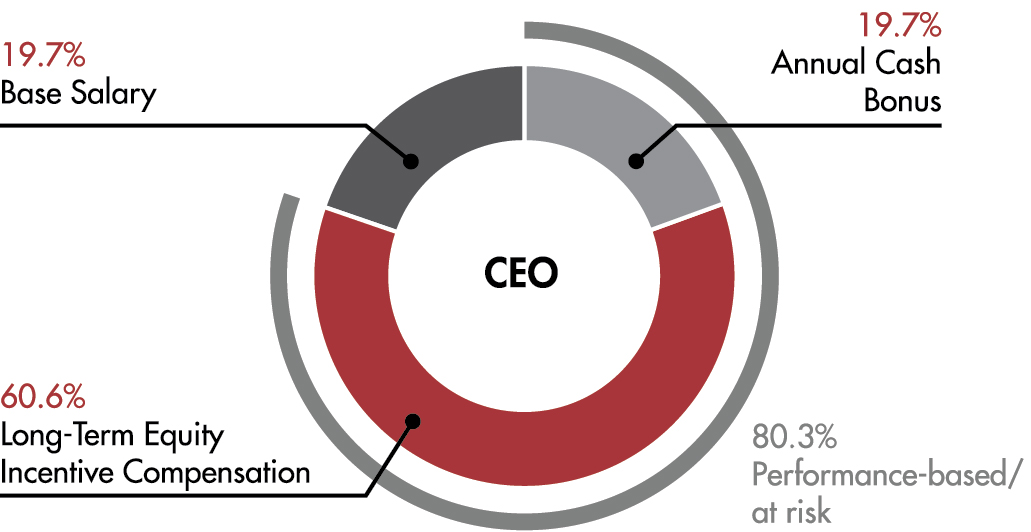 | 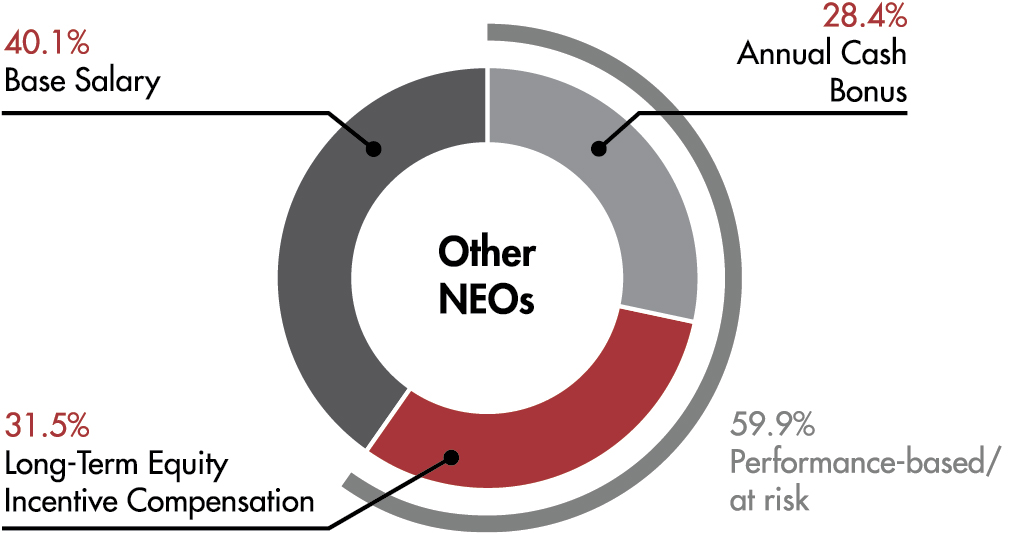 | ||||
2020 Base Salaries
In light of the newly designed executive Compensation Program, the Board approved post-Internalization annualized base salary amounts for our Named Executive Officers for 2020.
These base salary amounts are as follows:
| Name and Position | Pre-Internalization(1) | 2020 Post-Internalization | % Change | ||||||||
Joel T. Murphy, President and Chief Executive Officer(2) | $840,000 | $700,000 | -17% | ||||||||
| John A. Isakson, Chief Financial Officer | $525,000 | $500,000 | -5% | ||||||||
| Michael J. Cronin, Executive Vice President, Chief Accounting Officer and Treasurer | $450,000 | $450,000 | 0% | ||||||||
| Jeffrey D. Sherman, President - Multifamily | $355,000 | $375,000 | 6% | ||||||||
| Parker Boone DuPree, President - Office | $300,000 | $330,000 | 10% | ||||||||
(1)Pre-Internalization base salaries were paid by Manager and/or the Sub-Manager and are reflective of the executive’s prior roles in the Company, where applicable.
(2)Mr. Murphy’s post-Internalization salary took effect upon the adoption by the Board of the Compensation Program on June 17, 2020.
As shown above, the aggregate 2020 base salary levels for these Named Executive Officers are a significant decrease from 2019 and pre-Internalization levels. Of note, Mr. Murphy’s annual base salary of $700,000 is a 44.0% reduction from the salary of the Company’s prior Chief Executive Officer that was disclosed as $1,250,000 for 2019 in the Company’s 2019 proxy statement, though this compensation was not paid by the Company. In addition, the overall reduction in the base salaries paid to our Named Executive Officers above as compared to those disclosed in the Company’s 2019 proxy statement also shows a reduction from approximately $4.1 million to approximately $2.4 million, or approximately a 42.8% reduction.
50 | ||||||||
COMPENSATION DISCUSSION AND ANALYSIS
2020 Short-Term Incentive Program
In June 2020, the Board approved a Short-Term Incentive Program (“STIP”) to emphasize annual goals across key corporate/ financial/operating metrics that are paid 100% in cash. With assistance from FPL, and consistent with common practices across the REIT industry, the Board developed threshold, target, and maximum short-term incentive opportunities for each of our Named Executive Officers, shown as a percentage of base salary. These awards can be earned based on predetermined metrics and performance hurdles adopted at the outset of the program. Below is a table showing the threshold, target and maximum opportunities (expressed as a percentage of base salary) of each Named Executive Officer:
| Name and Position | Threshold | Target | Maximum | ||||||||
| Joel T. Murphy, President and Chief Executive Officer | 50% | 100% | 150% | ||||||||
| John A. Isakson, Chief Financial Officer | 40% | 80% | 120% | ||||||||
| Michael J. Cronin, Executive Vice President, Chief Accounting Officer, and Treasurer | 20% | 40% | 60% | ||||||||
| Jeffrey D. Sherman, President - Multifamily | 40% | 80% | 120% | ||||||||
| Parker Boone DuPree, President - Office | 40% | 80% | 120% | ||||||||
The Company’s performance against the STIP performance metrics, further discussed below, determine the level of achievement for the annual bonus program. To the extent performance falls between two STIP levels, linear interpolation shall apply. In the event that the Company’s actual performance does not meet the determined threshold requirement, no award shall be earned for such performance requirement. If the Company’s actual performance for the performance period is above the maximum for a performance requirement, the amount of earned awards shall be capped at the maximum number for the participant’s opportunity.
While the Board’s ultimate plan for the STIP is to bifurcate the performance criteria between objective metrics and subjective metrics, due to the COVID-19 pandemic and the difficulty of setting any objective goals, our first STIP that we put in place in June 2020 was based on different metrics and a more subjective assessment of performance. Going forward, however, the traditional framework approved by the Board is expected to be utilized, as shown below:

In light of COVID-19’s impact on the Company’s operations, the following criteria were used for determining the 2020 STIP awards (listed in no particular order):
•property operations in the context of macro events;
•rent collections on a relative basis compared to peers;
•successful navigation of what is best for the Company in these extraordinary times; and
•strategies to improve liquidity and the balance sheet.
The 2020 criteria listed above was subjectively reviewed by the Compensation Committee in determining performance under the STIP. The Compensation Committee noted the following in its review of the key events the Company accomplished during the second half of 2020:
•Believed to have performed in the top 10% of its public peers in rent collections, including collections in the fourth quarter of: 99% for multifamily, 100% for office and 97% for retail;
•Continued to operate and lease all of our properties in a safe manner, including new leases for the retail and office portfolio;
•Multifamily occupancy at year end was 95.4%;
51 | ||||||||
PREFERRED APARTMENT COMMUNITIES 2021 PROXY STATEMENT
•Refinanced eight multifamily properties with rates reduced by over 70 basis points and weighted average terms increased from 2.1 years to over 8 years.
•Acquired four Class A multifamily properties in all of 2020;
•Sold the Company's student housing portfolio;
•Deployed the proceeds of the student housing sale to improve the Company's balance sheet by calling over $209 million in preferred stock;
•Collected full repayment of four real estate investment loans totaling almost $49 million in the fourth quarter;
•Strong liquidity at year end with $178 million available on the Company's revolving line of credit and over $75 million of cash and restricted cash;
As previously discussed, the traditional STIP, which is anticipated to be utilized moving forward, is expected to contain predefined objective metrics and performance hurdles. Following the evaluation of the Company’s performance, as well as each of our Named Executive Officers achievements throughout the year, the Compensation Committee determined each individual’s 2020 earned cash bonus as follows and authorized payment in early 2021:
| Name and Position | Target Bonus | Actual Earned | Actual as a % of Target | ||||||||
| Joel T. Murphy, President and Chief Executive Officer | $700,000 | $800,000 | 114.3% | ||||||||
| John A. Isakson, Chief Financial Officer | $400,000 | $450,000 | 112.5% | ||||||||
| Michael J. Cronin, Executive Vice President, Chief Accounting Officer and Treasurer | $180,000 | $180,000 | 100.0% | ||||||||
| Jeffrey D. Sherman, President - Multifamily | $300,000 | $300,000 | 100.0% | ||||||||
| Parker Boone DuPree, President - Office | $264,000 | $264,000 | 100.0% | ||||||||
2020 Long-Term Incentive Program
The Board has adopted a Long-Term Incentive Program (“LTIP”) that includes both time-based and performance-based equity awards. The purpose of the Company’s LTIP is to attract and retain talented executives and key employees and to link compensation to stockholder results over a multi-year period. The program is designed so that 50% of the target awards will be granted as performance-based restricted stock, which will vest based upon predefined performance metrics over a three-year period. The remaining 50% will be granted as time-based restricted stock awards which will vest annually in approximately equal amounts over the four years following June 17, 2020 (the “Grant Date”).
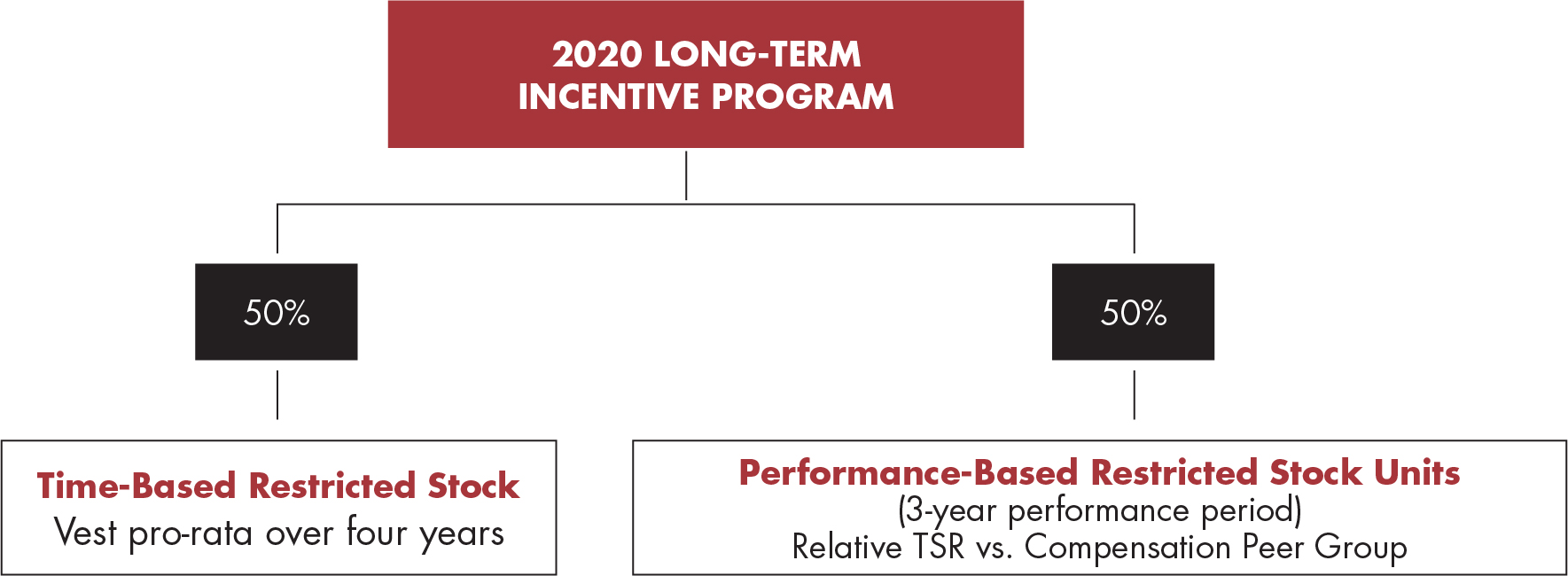
This program contains best in class features: (a) need to outperform (55th percentile) to earn the target; and (b) includes an absolute TSR modifier that limits the payout to target if our TSR is negative.
52 | ||||||||
COMPENSATION DISCUSSION AND ANALYSIS
Time-Based Awards
Pursuant to the Company’s 2019 Stock Incentive Plan, the Board approved time-based equity grants to our Named Executive Officers, effective as of the Grant Date, as part of the Company’s LTIP.
| Time Vesting Restricted Stock | ||||||||
| Name and Position | Target Dollar Value | Number of Shares | ||||||
| Joel T. Murphy, President and Chief Executive Officer | $1,075,000 | 148,072 | ||||||
| John A. Isakson, Chief Financial Officer | $350,000 | 48,209 | ||||||
| Michael J. Cronin, Executive Vice President, Chief Accounting Officer and Treasurer | $70,000 | 9,642 | ||||||
| Jeffrey D. Sherman, President - Multifamily | $125,000 | 17,218 | ||||||
| Parker Boone DuPree, President - Office | $125,000 | 17,218 | ||||||
Performance-Based Awards
On July 31, 2020, the Board, upon recommendation of the Compensation Committee, approved performance-based restricted stock units (“RSUs”) as part of the Company’s LTIP for our Named Executive Officers. Our Named Executive Officers were granted awards, subject to future three-year performance, based on a target dollar value and further converted into a number of shares based on the grant date fair value, which has been calculated using the Monte Carlo valuation model in accordance with FASB ASC Topic 718. The table below sets forth the name, target value, and target number of performance-based RSUs awarded to our Named Executive Officers on July 31, 2020.
| Performance-Based Restricted Stock Units | |||||||||||
| Name and Position | Target Dollar Value | Number of Shares | |||||||||
| Joel T. Murphy, President and Chief Executive Officer | $ | 1,075,000 | 159,024 | ||||||||
| John A. Isakson, Chief Financial Officer | $ | 350,000 | 51,775 | ||||||||
| Michael J. Cronin, Executive Vice President and Chief Accounting Officer | $ | 70,000 | 10,355 | ||||||||
| Jeffrey D. Sherman, President - Multifamily | $ | 125,000 | 18,491 | ||||||||
| Parker Boone DuPree, President - Office | $ | 125,000 | 18,491 | ||||||||
Pursuant to the performance-based RSUs agreements, each Named Executive Officer is eligible to vest in a number of RSUs ranging from 0% to 200% of the target number of RSUs granted, based on the Company’s total shareholder return (“TSR”) during the three-year performance period commencing on July 1, 2020 and ending on June 30, 2023 (the “Performance Period”), relative to the total shareholder return of the peer group during the Performance Period, subject to the Named Executive Officer's continued service. These RSUs are granted annually for overlapping three-year periods and include both performance-based and time-based vesting conditions. If, at the end of the performance-period any amount of the awards are earned, 50% will vest on the date the Compensation Committee determines the Company’s performance during the Performance Period, and the remaining 50% will vest on June 30, 2024, subject to the Named Executive Officer's continued service through such date.
53 | ||||||||
PREFERRED APARTMENT COMMUNITIES 2021 PROXY STATEMENT
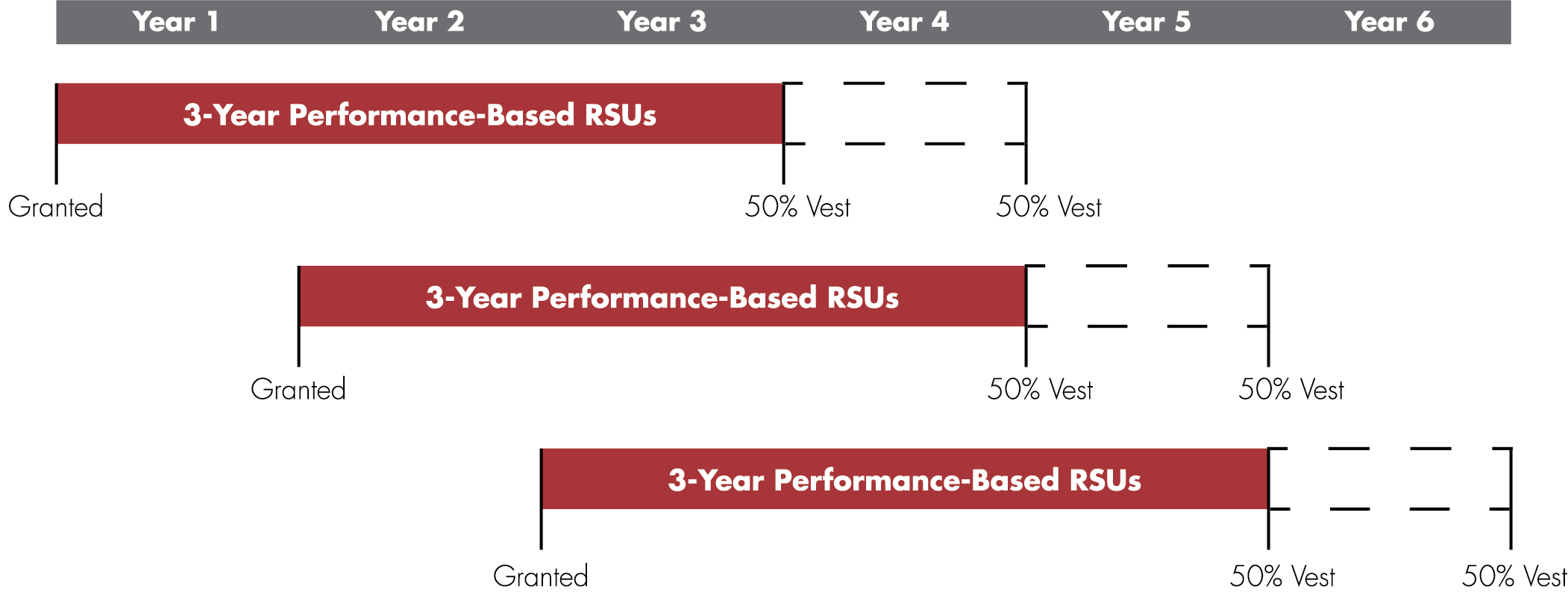
For the 2020 LTIP, the Company’s performance will be based solely on its relative TSR performance as compared to a defined set of the peers. The peers utilized will be the same as those used for setting post-Internalization compensation as noted in the compensation peer group above. In the event that the Company’s TSR performance during the Performance Period is achieved at the “threshold,” “target” or “maximum” level as set forth below compared to the peer group, the award will become performance-vested with respect to the percentage of RSUs set forth below:
| Level | Relative TSR Performance (Percentage Rank vs. Peers) | Earned RSUs (% of Target) | ||||||
| <Threshold | <35th Percentile | 0% | ||||||
| Threshold | 35th Percentile | 50% | ||||||
| Target | 55th Percentile | 100% | ||||||
| Maximum | 75th Percentile | 200% | ||||||
If the Company’s relative TSR performance falls between the levels specified above, the percentage of RSUs that will performance vest will be determined using straight-line linear interpolation between such levels. Notwithstanding the foregoing, in the event the Company's absolute TSR performance for the performance period is negative, then unless the Compensation Committee determines otherwise, the performance RSUs that performance vest will not exceed 100%. The number of RSUs that become performance-vested are referred to as “Earned RSUs.”
Any Earned RSUs that become vested will be paid to the executive in whole shares of Company common stock as soon as practicable following the applicable vesting date.
Except to the extent otherwise provided under any separate written change in control or severance plan that may be established by the Company and applicable to the participant, in the event of a change in control of the Company, all outstanding RSUs will vest as follows: the Performance Period will be deemed to end as of the date of the change in control, and the Committee will determine the level of achievement of the performance conditions over the deemed Performance Period and thus the number of Earned RSUs. The number of Earned RSUs that shall become payable to the participant shall be pro-rated to reflect the percentage of days elapsed during the shortened, deemed Performance Period. To the extent that the original Performance Period has been completed prior to the change in control, any remaining outstanding RSUs that are still subject to time-based vesting requirements as of the date of the change in control shall be immediately vested and payable unless the acquirer in the change in control maintains the RSUs in accordance with the terms of the Company’s 2019 Stock Incentive Plan that are applicable to RSUs.
Except as otherwise described below, any RSUs that have not fully vested as of the date on which a Named Executive Officer's service terminates for any reason will be cancelled and forfeited by the Named Executive Officer.
If an executive’s service terminates due to death or disability prior to the completion of the Performance Period, a percentage of the RSUs will become vested based on the ratio of the number of days of employment during the Performance Period divided by the total number of days in the Performance Period. The Compensation Committee
54 | ||||||||
COMPENSATION DISCUSSION AND ANALYSIS
will also make a determination of the Company’s TSR performance relative the peer group as of the date service terminated or as soon as practicable thereafter, as determined by the Compensation Committee. Any unvested and unearned RSUs will be forfeited.
In the event that the Company declares and pays a dividend in respect of its outstanding shares of common stock and, on the record date for such dividend, the participant holds RSUs granted that have not been settled, the Company shall record the amount of such dividend in a bookkeeping account and pay to the participant an amount in cash equal to the cash dividends the participant would have received if the participant was the holder of record, as of such record date, of a number of shares of common stock equal to the number of RSUs held by the participant that have not been settled as of such record date but which become vested and Earned RSUs, such payment to be made on the date on which any RSUs are settled. For purposes of clarity, if the RSUs (or any portion thereof) are forfeited by the participant, then the participant shall also forfeit the dividend equivalents, if any, accrued with respect to such forfeited RSUs. No interest will accrue on the dividend equivalents between the declaration and payment of the applicable dividends and the settlement of the dividend equivalents.
CEO Retention Award
In connection with Mr. Murphy becoming the Company’s Chief Executive Officer, the Board granted Mr. Murphy a special, one-time, long-term retention award of 137,741 shares of restricted common stock (the “Retention Award”) on June 17, 2020. The Retention Award cliff vests four years following the Grant Date, subject to Mr. Murphy's continued service through such date. The Compensation Committee and the Board believed that the long-term incentive award was appropriate to incentivize and retain Mr. Murphy as a way to insure stability for the Company and the Company's stockholders for the next four years. For 2021, Mr. Murphy did not receive a special award, but received equity awards consistent with the Company’s annual grant process. The foregoing summary of the Retention Award is qualified in its entirety by reference to the form of the Restricted Stock Agreement (Officer), filed as Exhibit 10.2 to the Company’s Current Report on Form 8-K filed with Securities and Exchange Commission on June 19, 2020.
CEO 2020 COMPENSATION SUMMARY
As shown in the second table below, the value of Mr. Murphy's target 2020 compensation was significantly less than the compensation disclosed and required to be reported in the Summary Compensation Table for 2020.
The amounts in the Summary Compensation Table for 2020 reflect SEC rules and methodology. These rules and methodology require disclosure of all equity awards made during the most recently completed fiscal year, including non-recurring awards, which may skew compensation totals and are not a usual part of our executive Compensation Program.
The difference between the two totals in the immediately following tables is due to the Summary Compensation Table including a grant of a special long-term retention award of restricted stock made to Mr. Murphy as a retention award, which cliff vests after four years from the grant date. The Compensation Committee and the Board believed that the retention award was appropriate to incentivize and retain Mr. Murphy as noted above. For 2021, Mr. Murphy did not receive a retention award, but received equity awards consistent with the Company’s usual Compensation Program. As the Summary Compensation Table for 2020 does not reflect our typical Compensation Program and includes the special, non-recurring long-term retention award, we have provided the supplemental table below for additional context of Mr. Murphy's 2020 pay. In general, Mr. Murphy will realize value from the 2020 retention award if he remains employed on the vesting date, which is four following the grant date.
Summary Compensation Table for 2020 (as required by SEC rules)
| Name and Principal Position | Year | Salary ($) | Bonus ($) | Stock Awards ($) | All Other Compensation ($) | Total | ||||||||||||||||||||
| Joel T. Murphy | 2020 | $699,108 | $800,000 | $3,375,797 | $38,536 | $4,913,441 | ||||||||||||||||||||
2020 Supplemental Summary Compensation Table
55 | ||||||||
PREFERRED APARTMENT COMMUNITIES 2021 PROXY STATEMENT
| Name and Principal Position | Year | Salary ($) | Bonus ($) | Stock Awards ($)(1) | All Other Compensation ($) | Total | ||||||||||||||||||||
| Joel T. Murphy | 2020 | $699,108 | $800,000 | $2,266,982 | $38,536 | $3,804,626 | ||||||||||||||||||||
(1) Excludes the special long-term retention award of restricted common stock.
For additional information regarding the Company’s executive Compensation Program for 2020, refer to the discussion in this Compensation Discussion & Analysis and the compensation tables presented below.
Severance and Change in Control Benefits
None of our Named Executive Officers is a party to an individual employment agreement providing for severance upon a termination of employment. However, in connection with the Board’s establishment of the executive compensation structure following Internalization, and in consultation with FPL, on July 31, 2020, the Board, based upon the recommendation of the Compensation Committee, approved and adopted the Preferred Apartment Communities, Inc. Executive Severance and Change in Control Plan (the “Severance Plan”). The Severance Plan provides certain severance benefits in the case of a qualifying termination of employment, which is defined as a termination by the Company without cause or a resignation by the executive for good reason. Consistent with our Stock Incentive Plan, the Severance Plan also provides for a payout of performance-based equity awards upon a change in control, based on actual performance through the date of the change in control. There are no 280G parachute payment tax gross-ups provided under this plan. We believe that competitive severance and change in control benefits provide financial protection to employees following an involuntary loss of employment and that these types of benefits enable our executives to focus on important business decisions throughout their employment and in the event of any future acquisition of our business, without regard to how the transaction may affect them personally. We believe that this structure provides executives with an appropriate incentive to cooperate in completing a change in control transaction if such transaction is in the best interest of the Company and its shareholders. Participation in the Severance Plan is contingent upon the executive entering into a participation agreement in which the executive agrees to certain restrictive covenants during and following employment with the Company. All of our Named Executive Officers, other than Parker Boone DuPree, were participants in this plan in 2020. Please see the discussion below under “Executive Compensation – Potential Payments Upon Termination or Change of Control” for further details regarding the benefits payable under this plan to our Named Executive Officers.
Executive Compensation Clawback Policy
The Board has adopted a clawback policy that allows the independent directors of the Board to recover bonuses and/or incentive compensation to remedy fraud or misconduct and prevent its recurrence. If the Company’s financial results are restated or materially misstated due in whole or in part to intentional fraud or misconduct by one or more of the Company’s executive officers, the independent members of the Board may, based upon the facts and circumstances surrounding the restatement, direct that the Company recover all or a portion of any bonus or incentive compensation paid, or cancel the stock-based awards granted under the LTIP, to an executive officer. In addition, the independent directors may also seek to recoup any gains realized with respect to equity-based awards, including stock options and restricted stock units, regardless of when issued. The remedies that may be sought by the independent directors are subject to a number of conditions, including, that: (1) the bonus or incentive compensation to be recouped was calculated based upon the financial results that were misstated or restated, (2) the executive officer in question engaged in the intentional misconduct, and (3) the bonus or incentive compensation calculated under the restated financial results is less than the amount actually paid or awarded.
Stock Ownership Guidelines and Holding Requirements
Our Board adopted the stock ownership guidelines described below for independent directors and certain officers of the Company on March 6, 2020 (the “Ownership Guidelines Adoption Date”). Stock ownership guidelines strongly align the interests of management with the interests of stockholders because they become stockholders with a considerable investment in the Company.
56 | ||||||||
COMPENSATION DISCUSSION AND ANALYSIS
Our stock ownership and retention guidelines provide that each officer and director subject to the guidelines must meet the requirement within five years of the Ownership Guidelines Adoption Date if a director or an officer is subject to the guidelines at adoption, and within five years of becoming subject to the guidelines otherwise. If an officer or director has not attained the required goal after the specified period, the individual shall not be required to purchase shares of our common stock in the open market, but instead is required to retain 100% of the net after tax (and any applicable exercise costs) amount of any equity held, and subsequently awarded, until such goal is met. Shares of our common stock held outright and shares held through our 401(k) plans are counted for purposes of meeting the ownership guidelines as well as any shares held indirectly if the individual has an economic interest in the shares. Indirect ownership includes shares reportable in this Proxy Statement or any future proxy statement and any shares reportable on Table 1 of Forms 3, 4, and 5 under the Exchange Act. In addition, Class A Units of our operating partnership owned directly will be counted for purposes of our ownership guidelines. Stock options (whether vested or not), restricted stock units and unvested shares of restricted stock are not counted in the ownership calculation.
| Executive Officers/Directors | Ownership Guidelines | ||||
| CEO | 5x Annual Base Salary | ||||
| Executive chairperson | 5x Annual Base Salary | ||||
| Other Designated Officers | 1x to 3x Annual Base Salary | ||||
| Independent Directors | 5x Annual Cash Compensation | ||||
Accounting and Tax Considerations
We generally follow guidance for stock-based awards under ASC 718. Certain future stock-based compensation expense will be affected by our stock price, the number of stock-based awards our Compensation Committee grants, if any, in fiscal year 2020 and subsequent years, as well as a number of complex and subjective valuation assumptions and the related tax impact. These valuation assumptions may include, but are not limited to, dividend yields on our stock, risk-free interest rates, the expected term of the award and the volatility of our common stock price.
Role of Executive Officers in the Compensation Process
Our President and Chief Executive Officer may provide input and recommendations to the Compensation Committee for the compensation, if any, paid to each of our Named Executive Officers. The Compensation Committee considers these recommendations when determining salary, awarding incentive compensation and setting incentive opportunities for the coming year. In addition, our Chief Accounting Officer and Chief Financial Officer analyze the financial implications of various executive compensation plan designs.
Independent Compensation Consultant
In 2020, the Compensation Committee continued the engagement of FPL from 2019 as its independent compensation consultant to advise the Compensation Committee with respect to our Compensation Program for our Named Executive Officers. Prior to engaging FPL in 2019, FPL was hired to advise the Compensation Committee in 2015 to determined equity-based compensation in 2016. All of FPL′s work will be done at the direction of or on behalf of the Compensation Committee, who considered the independence of FPL in accordance with NYSE requirements. Although the Compensation Committee considers the advice of its independent consultant, the Compensation Committee has the final decision-making authority with respect to all elements of compensation. FPL does not provide any additional services to us. FPL was not engaged by the Company in 2016, 2017 or 2018.
Securities Insider Trading Policy and Anti-Hedging and Anti-Pledging Policy
We maintain a comprehensive securities trading policy which provides, among other things, that “covered persons” and “insiders” who are aware of material, non-public information regarding the Company may not disclose or trade on such information. In addition, “covered persons” and “insiders” are prohibited from transacting in
57 | ||||||||
PREFERRED APARTMENT COMMUNITIES 2021 PROXY STATEMENT
derivative securities (including buying or selling puts and calls) of the Company, short selling Company securities, buying or selling Company securities during any blackout period, holding Company stock in a margin account or pledging Company stock as collateral for a loan. Individuals classified as “insiders” (which include the Named Executive Officers) and their family members generally may not buy or sell Company securities without prior approval of the Company’s General Counsel, except under approved Rule 10b5-1 trading plans. To our knowledge, our Named Executive Officers comply with the policy, and none of our Named Executive Officers currently holds our securities in a margin account or has used our securities as collateral for a loan or is currently transacting in derivative securities of the Company.
Risk Assessment
The Compensation Committee, with the assistance of FPL, conducts regular review of several key peers of our Compensation Program, including external market compensation data, pay mix, selection of performance metrics, the goal-setting process, and other factors. This review provides a framework for evaluating our Compensation Program to determine whether the key elements of compensation encourage excessive risk-taking. While the Compensation Committee focuses this risk assessment primarily on the compensation of our Named Executive Officers because they are in a policy-making role, they also consider other Company employees who operate in decision-making capacities. The Compensation Committee believes that there is a low likelihood that our Compensation Program encourages excessive risk-taking due to the following mitigating factors:
•The Company’s overall compensation levels are competitive with the market;
•The Company’s compensation mix is balanced among (i) fixed components, like salary and benefits, (ii) annual incentives that reward the Company’s overall financial and business performance, business unit financial performance, operational measures, and individual performance, and (iii) long-term incentives that align executives’ interests with those of our shareholders, encouraging them to preserve long-term shareholder value and avoid excessive risks;
•Multiple performance metrics are used across the short- and long-term incentive program;
•Incentive programs have maximum payout limitations;
•We have a stock-ownership policy that requires each executive to maintain a certain multiple of his or her base salary in the form of our Company’s common stock;
•We have a clawback policy by which the Board has the right to seek to recoup all or a portion of the value of incentive awards; and
•Our insider trading policy contains prohibitions against pledging and engaging in hedging transactions with respect to our stock and other securities.
In summary, although a portion of the compensation provided to the Named Executive Officers may be based on the Company’s performance and on the individual successes of the employee, the Company believes its Compensation Program does not encourage excessive and unnecessary risk-taking by Named Executive Officers (or other employees) because these programs are designed to encourage employees to remain focused on both short- and long-term operational and financial goals of the Company. Additionally, our use of long-term equity-based compensation serves our Compensation Program’s goal of aligning the interests of executives and stockholders, thereby reducing the incentives for unnecessary risk-taking. Facets of compensation that incentivize these executives but mitigate risk-taking have been and will continue to be one of the many factors considered by the Compensation Committee during its review of the Company’s Compensation Program and during the design of new programs that may become effective in connection with the Company’s continued growth and development. In the future, the Compensation Committee will seek to ensure that any changes made to the Compensation Program does not encourage excessive or unnecessary risk-taking and that any level of risk that they do encourage is not reasonably likely to have a material adverse effect on the Company.
58 | ||||||||
 | ||
COMPENSATION COMMITTEE REPORT | ||
 | ||
PREFERRED APARTMENT COMMUNITIES 2021 PROXY STATEMENT
Compensation Committee Report
Our Compensation Committee has furnished the following report. The information contained in this “Compensation Committee Report” is not to be deemed “soliciting material” or “filed” with the SEC, nor is such information to be incorporated by reference into any future filings under the Securities Act of 1933, as amended, or the Securities Exchange Act of 1934, as amended, except to the extent that we specifically incorporate it by reference into such filings.
Our Compensation Committee has reviewed and discussed the “Compensation Discussion and Analysis” required by Item 402(b) of Regulation S-K of the Exchange Act with management.
Based on such review and discussions, our Compensation Committee recommended to our Board that the “Compensation Discussion and Analysis” be included in this Proxy Statement and in our Annual Report on Form 10-K for the fiscal year ended December 31, 2020 for filing with the SEC.
The Compensation Committee
Sara J. Finley, Chair
Gary B. Coursey
Howard A. McLure
John M. Cannon
Gary B. Coursey
Howard A. McLure
John M. Cannon
60 | ||||||||
 | |||||||||||
EXECUTIVE COMPENSATION TABLES | |||||||||||
 | |||||||||||
Executive Compensation Tables
Summary Compensation Table
We were externally managed by our Manager pursuant to the Management Agreement until January 31, 2020. All of our Named Executive Officers were employees of our Manager and/or affiliates of our Manager that provide services to us until January 31, 2020. We did not provide any of our Named Executive Officers with any cash compensation or bonuses in 2019 or 2018.
The table below summarizes the total compensation we paid or awarded to each of our Named Executive Officers for the fiscal years indicated. For a more thorough discussion of our Compensation Program, see the Compensation Discussion and Analysis beginning on page 45 of this Proxy Statement.
| Name and Principal Position | Year | Salary(1) ($) | Bonus(2) ($) | Stock Awards ($)(3) | All Other Compensation ($)(4) | Total | ||||||||||||||||||||
Joel T. Murphy(5) | 2020 | $699,108 | $800,000 | $3,375,797 | $38,536 | $4,913,441 | ||||||||||||||||||||
| President and Chief Executive Officer | 2019 | $— | $— | $— | $— | $— | ||||||||||||||||||||
| 2018 | $— | $— | $447,704 | $— | $447,704 | |||||||||||||||||||||
| John A. Isakson | 2020 | $462,239 | $450,000 | $738,081 | $784 | $1,651,104 | ||||||||||||||||||||
| Executive Vice President and Chief Financial Officer | 2019 | $— | $— | $— | $— | |||||||||||||||||||||
| 2018 | $— | $— | $101,759 | $101,759 | ||||||||||||||||||||||
| Michael J. Cronin | 2020 | $420,940 | $180,000 | $147,618 | $5,700 | $754,258 | ||||||||||||||||||||
| Executive Vice President, Chief Accounting Officer and Treasurer | 2019 | $— | $— | $— | $— | $— | ||||||||||||||||||||
| 2018 | $— | $— | $162,802 | $— | $162,802 | |||||||||||||||||||||
| Jeffrey D Sherman | 2020 | $349,472 | $300,000 | $263,604 | $5,700 | $918,776 | ||||||||||||||||||||
| President - Multifamily | ||||||||||||||||||||||||||
| Parker Boone DuPree | 2020 | $307,872 | $264,000 | $263,604 | $5,640 | $841,116 | ||||||||||||||||||||
| President - Office | ||||||||||||||||||||||||||
*The columns for “Option Awards,” “Non-Equity Incentive Plan Compensation” and “Change in Pension Value and Nonqualified Deferred Compensation Earnings” have been omitted because they are not applicable.
(1)Represents salary paid from February 1, 2020 through December 31, 2020, the period of 2020 following Internalization. Prior to Internalization, we did not pay any salary of to our Named Executive Officers.
(2)Represents cash bonus compensation related to fiscal year 2020 performance, but paid in January 2021. Prior to this bonus paid for 2020, we did not pay bonuses to our Named Executive Officers.
(3)Represents the total grant date fair value of the awards granted in 2020 determined in accordance with FASB ASC TOPIC 718. Assumptions used in the calculation of these amounts are included in Note 8 to the Company’s audited consolidated financial statements for the year ended December 31, 2020 included in its Annual Report on Form 10-K for the year ended December 31, 2020, filed with the SEC on March 1, 2021.
The amounts shown in this column for 2020 include the grant date fair value of time-based restricted stock awards and target performance-based restricted stock unit awards, or "PSUs", as applicable, granted in 2020. The value of the PSUs is based on the probable outcome of the performance condition to which such awards are subject, which was calculated by a third-party consultant using a Monte Carlo valuation model in accordance with FASB ASC Topic 718. Based on the foregoing, the grant date fair value is $6.76 per PSU. The grant date fair value per share for the time-based restricted stock is based upon the closing price of $8.05 of the Company′s common stock on the business day preceding the grant date.
(4)Includes the Company match for our 401(k) program for each Named Executive Officer. In addition, for Mr. Murphy, it includes $15,960 for a supplemental health care plan, $6,022 for car lease payments and $8,916 for disability insurance. Effective June 2020, the Company stopped reimbursing Mr. Murphy for any car lease payment.
(5)On January 1, 2020, Mr. Murphy became our Chief Executive Officer. On March 4, 2020, Mr. Murphy was appointed as our President.
62 | ||||||||
EXECUTIVE COMPENSATION TABLES
Grants of Plan-Based Awards that Occurred in 2020
| Estimated Future Payouts Under Equity Incentive Plan Awards | All Other Stock Awards; Number of Shares or Units | Grant Date Fair Value of Stock and Option Awards | ||||||||||||||||||
| Name | Grant Date | Threshold | Target | Maximum | ($)(1) | |||||||||||||||
| Joel T. Murphy | June 17, 2020(2) | 148,072 | $1,191,980 | |||||||||||||||||
June 17, 2020(3) | 137,741 | $1,108,815 | ||||||||||||||||||
July 31, 2020(4) | 79,512 | 159,024 | 318,048 | $1,075,002 | ||||||||||||||||
| John A. Isakson | June 17, 2020(2) | 48,209 | $388,082 | |||||||||||||||||
July 31, 2020(4) | 25,888 | 51,775 | 103,550 | $349,999 | ||||||||||||||||
| Michael J. Cronin | June 17, 2020(2) | 9,642 | $77,618 | |||||||||||||||||
July 31, 2020(4) | 5,178 | 10,355 | 20,710 | $70,000 | ||||||||||||||||
| Jeffrey D. Sherman | June 17, 2020(2) | 17,218 | $138,605 | |||||||||||||||||
July 31, 2020(4) | 9,246 | 18,491 | 36,982 | $124,999 | ||||||||||||||||
| Parker Boone DuPree | June 17, 2020(2) | 17,218 | $138,605 | |||||||||||||||||
July 31, 2020(4) | 9,246 | 18,491 | 36,982 | $124,999 | ||||||||||||||||
(1)Represents the total grant date fair value of the awards granted determined in accordance with ASC 718 as described in note 3 to the Summary Compensation Table above.
(2)Represents a restricted stock award that vests approximately equally on June 17, 2021, June 17, 2022, June 17, 2023 and June 17, 2024, subject to the Named Executive Officer's continuous service through each such vesting date.
(3)Represents a restricted stock award that vests in full on June 17, 2024, subject to Mr Murphy's continuous service through such date.
(4)Represents a PSU award. The PSUs will vest: (a) 50% on the date the Compensation Committee determines the Company′s performance during the 3-year performance period that ends on June 30, 2023 and (b) 50% on June 30, 2024. The PSUs will become earned according to percentile rank of the TSR of Company′s common stock versus the peer group’s average TSR, as described in more detail above in the section titled "Compensation Discussion and Analysis - 2020 Long-Term Incentive Program."
Outstanding Equity Awards at Fiscal Year End
| Shares | |||||||||||||||||
| Number of Shares or Units That Have Not Vested (#) | Market Value of Shares or Units That Have Not Vested ($)(1) | Equity Incentive Plan Awards: Number of Unearned Shares, Units or Other Rights That Have Not Vested (#) | Equity Incentive Plan Awards; Market or Payout Value of Unearned Shares, Units or Other Rights That Have Not Vested ($)(1) | ||||||||||||||
Name | Grant Date | ||||||||||||||||
| Joel T. Murphy | June 17, 2020(2) | 148,072 | $1,095,733 | ||||||||||||||
June 17, 2020(3) | 137,741 | $1,019,283 | |||||||||||||||
July 31, 2020(4) | 318,048 | $2,353,555 | |||||||||||||||
| John A. Isakson | June 17, 2020(2) | 48,209 | $356,747 | ||||||||||||||
July 31, 2020(4) | 103,550 | $766,270 | |||||||||||||||
| Michael J. Cronin | June 17, 2020(2) | 9,642 | $71,351 | ||||||||||||||
July 31, 2020(4) | 20,710 | $153,254 | |||||||||||||||
January 2, 2018(5) | 9,772 | $72,313 | |||||||||||||||
| Jeffrey D. Sherman | June 17, 2020(2) | 17,218 | $127,413 | ||||||||||||||
July 31, 2020(4) | 36,982 | $273,667 | |||||||||||||||
| Parker Boone DuPree | June 17, 2020(2) | 17,218 | $127,413 | ||||||||||||||
July 31, 2020(4) | 36,982 | $273,667 | |||||||||||||||
(1)The amounts are calculated by multiplying $7.40, the closing price of our common stock as reported by the NYSE for December 31, 2020, by the applicable number of shares of restricted stock, restricted stock units or Class B Units.
63 | ||||||||
PREFERRED APARTMENT COMMUNITIES 2021 PROXY STATEMENT
(2)Represents shares of time-based restricted stock granted on June 17, 2020 that will vest approximately equally on June 17, 2021, June 17, 2022, June 17, 2023 and June 17, 2024.
(3)Represents shares of time-based restricted stock granted on June 17, 2020 that will vest on June 17, 2024, subject to Mr. Murphy’s continuous employment through such vesting date.
(4)Represents performance-based restricted stock units that, subject to achievement of the performance criteria, will vest: (a) 50% on the date the Compensation Committee determines the Company′s performance during the 3-year performance period that ends on June 30, 2023 and (b) 50% on June 30, 2024. We have assumed for purposes of this table that the performance through December 31, 2020 was achieved at target level and have therefore disclosed the awards at their maximum payout level pursuant to Instruction 3 to Item 402(f)(2). The actual number of shares that vest at the end of the applicable performance period may differ substantially from the number of shares reported herein.
(5)On January 2, 2018, Mr. Cronin was granted and aggregate of 9,772 Class B Units and all of these units have vested. On January 2, 2019 it was determined that none of the 2018 Class B Units were earned. Since the outstanding 2018 Class B Units were not fully earned on January 2, 2019, additional determinations will be made at the end of each calendar quarter thereafter until the outstanding unearned Class B Units are fully earned or forfeited. As of December 31, 2020, the 2018 Class B Unit were not earned. To be fully earned, the volume weighted average of the closing per share prices of our common stock reported by the NYSE for the five consecutive trading days ending on (and including) the last day of any subsequent quarter currently will need to be at or above approximately $20.38 per share.
Option Exercises and Stock Vesting
| Stock Awards | |||||||||||||||||
| Name | Number of Shares Acquired on Vesting (#)(1) | Value Realized on Vesting ($)(2) | |||||||||||||||
| Michael J. Cronin | 4,540 | $ | 60,473 | ||||||||||||||
| John A. Isakson | 2,270 | $ | 30,236 | ||||||||||||||
(1)Represents the aggregate number of Class B Units granted on January 3, 2017 that vested on January 2, 2020 and were earned on or before January 2, 2020 and became Class A Units when earned and vested, which Class A Units are exchangeable for shares of our common stock on a one-for-one basis, or cash, as elected by us.
(2)The amounts are calculated by multiplying $13.32, the closing price of our common stock as reported by the NYSE on December 31, 2019 (the last trading date prior to the vesting date), by the number of Class B Units converted to Class A Units.
Potential Payments Upon Termination or Change of Control
The following discussion describes the amounts and benefits that would have been owed to the Named Executive Officers in the event of a termination of employment or a change in control as of the end of fiscal year 2020 under the Severance Plan, the 2019 Stock Incentive Plan and award agreements granted thereunder, and the Class B Unit award agreements (the “Award Agreements”).
Executive Severance and Change in Control Plan
The Severance Plan provides severance benefits for qualifying terminations of employment under certain circumstances to our executive officers who are selected by the Compensation Committee to participate in the plan and who execute an individual participation agreement (a “Participation Agreement”). All of our Named Executive Officers, other than Parker Boone DuPree, participated in the Severance Plan in 2020.
Under the Severance Plan, if a plan participant’s employment with us is terminated by the participant for “good reason” (as defined below) or by us other than for “cause” (as defined below), in each case on or within 24 months following a “change in control” (as defined below) and other than as a result of the participant’s death or “disability” (as defined below), the participant is entitled to receive (i) a severance payment in an amount equal to 1.50 (3.0 for the Company’s Chief Executive Officer and Chief Financial Officer), multiplied by the sum of (a) the participant’s annual base salary, plus (b) the participant’s target annual performance bonus in effect immediately prior to the change in control; (ii) continued health coverage at the active employee rate for up to 18 months (36 months for the Company’s Chief Executive Officer and Chief Financial Officer) following termination of employment, but subject to cessation once the participant becomes eligible for coverage from a new employer; (iii) a pro-rated annual bonus (based on the target amount) for the calendar year in which the participant’s employment termination date occurs; and (iv) accelerated vesting of outstanding equity awards, as determined by the 2019 Stock Incentive Plan and the Award Agreements.
If the employment of our Chief Executive Officer or Chief Financial Officer is terminated by the Company without Cause or by the executive for Good Reason other than in the 24 month period following a change in control, such participant is entitled to receive (i) a severance payment in an amount equal to 2.0 times the sum of (a) the
64 | ||||||||
EXECUTIVE COMPENSATION TABLES
participant’s annual base salary, plus (b) the participant’s target annual performance bonus in effect immediately prior to the qualifying termination, which severance payment will be payable in substantially equal installments over a 24-month period following termination of employment, (ii) continued health coverage at the active employee rate for up to 24 months following termination of employment, but subject to cessation once the participant becomes eligible for coverage from a new employer; (iii) a pro-rated annual bonus (based on target) for the calendar year in which the participant’s employment termination date occurs (“Pro-Rata Bonus”); and (iv) accelerated vesting of any outstanding equity awards The Severance Plan governs the treatment of the time-based restricted stock and the PSU awards on a termination of employment by the Company without Cause or by the executive for Good Reason. Under the Severance Plan, the time-based restricted stock will vest in full, and the PSUs will be pro-rated to reflect the number of days the participant was employed with the Company during the performance period, and such pro-rated amount will remain outstanding and vest according to actual performance at the end of the applicable performance period.
If a plan participant’s employment with us is terminated for death or “disability,” the participant (or his or her estate, if applicable) will be entitled to receive a Pro-Rata Bonus under the Severance Plan, and accelerated vesting of any equity awards in accordance with the 2019 Stock Incentive Plan and applicable award agreements.
Except as otherwise described above, upon a termination of any participant’s employment for any reason or upon a change in control, the treatment of the participant’s outstanding equity awards will be governed by the terms of the Company’s equity plan or plans under which they were granted and any applicable award agreements.
The following definitions apply for purposes of the Severance Plan:
•“Good Reason” means, except as otherwise provided in an Eligible Individual’s Participation Agreement, the occurrence of one of the following conditions arising on or after the date such Eligible Individual commences participation in this Plan, as determined in a manner consistent with Treasury Regulation §1.409A-1(n)(2)(ii) and without the express written consent of the Eligible Individual: (i) a material diminution by the Company or an Affiliate in the Eligible Individual’s duties and responsibilities, or (ii) a material reduction by the Company or an Affiliate in the Eligible Individual’s annual base salary other than a general reduction in Base Salary that affects all similarly situated executives, or employees with similar business functions, in substantially the same proportions, (iii) a material reduction by the Company or an Affiliate in the Eligible Individual’s (A) annual target cash incentive opportunity and/or (B) annual target equity-based compensation grant (determined based on the grant date fair value of such award) offered under the Company’s executive compensation program applicable to senior executives of the Company, provided that a material reduction in the target compensation described in clause (A) or (B) alone that is offset by a corresponding increase in one or more other elements of compensation shall not constitute a Good Reason condition if the total target compensation eligible to be earned by the Eligible Individual for such calendar year has not been materially reduced, or (iv) the Company or an Affiliate requiring the Eligible Individual to relocate his or her principal place of employment to a new location that is more than fifty (50) miles (calculated using the most direct driving route) from its current location. In the case of an Eligible Individual’s allegation of Good Reason for any condition described by clauses (i) through (iv) above, (1) the Eligible Individual shall provide notice to the Company of the event alleged to constitute Good Reason within ten (10) days after the occurrence of such event, and (2) the Company or one of its Affiliates (as applicable) shall have the opportunity to remedy the alleged Good Reason event within thirty (30) days from receipt of notice of such allegation. If not remedied within that thirty (30)-day period, the Eligible Individual may submit a Notice of Termination, provided that the Notice of Termination must be given no later than thirty (30) days after the expiration of such 30-day cure period; otherwise, the Eligible Individual will be deemed to have accepted such event, or the Company’s or Affiliate’s remedy of such event, that may have given rise to the existence of Good Reason; provided, however, such acceptance shall be limited to the occurrence of such event and shall not waive the Eligible Individual’s right to claim Good Reason with respect to future similar events.
•“Cause” means the occurrence of any of the following events: (i) a willful failure by an Eligible Individual to perform his or her duties and responsibilities for the Company or an Affiliate, (ii) a willful misconduct by an Eligible Individual in performing his or her duties and responsibilities for the Company or an Affiliate, (iii) an intentional disclosure by an Eligible Individual to an unauthorized person confidential information or trade secrets of the Company or an Affiliate, (iv) an act by an Eligible Individual of fraud against, misappropriation from, or dishonesty to either the Company or an Affiliate, or any party if the Board of Directors determines such act could have an adverse impact on the Company, (v) a commission by an Eligible Individual of a felony or crime involving moral turpitude, as determined by the Board, (vi) a
65 | ||||||||
PREFERRED APARTMENT COMMUNITIES 2021 PROXY STATEMENT
material violation by an Eligible Individual of any policy, code of ethics or business conduct, work rule or standard of the Company or an Affiliate, or (vii) a material breach by an Eligible Individual of any material agreement with the Company or an Affiliate.
•“Change in Control” means the occurrence of one of the following:
◦(i) Individuals who, as of the Effective Date, constitute the Board (the “Incumbent Board”) cease for any reason to constitute at least a majority of the Board; provided, however, that any individual becoming a director subsequent to the Effective Date whose election, or nomination for election by the Company’s stockholders, was approved by a vote of at least a majority of the directors then comprising the Incumbent Board shall be considered as though such individual were a member of the Incumbent Board, but excluding, for this purpose, any such individual whose initial assumption of office occurs as a result of either an actual or threatened election contest or other actual or threatened solicitation of proxies or consents by or on behalf of a person other than the Board;
◦(ii) Completion of a reorganization, merger or consolidation, in each case unless, following such reorganization, merger or consolidation, (A) more than sixty percent (60%) of the combined voting power of the then outstanding voting securities of the corporation resulting from such reorganization, merger or consolidation entitled to vote generally in the election of directors is then beneficially owned, directly or indirectly, by all or substantially all of the individuals and entities who were the beneficial owners of the Company’s outstanding voting securities immediately prior to such reorganization, merger or consolidation in substantially the same proportions as their beneficial ownership, immediately prior to such reorganization, merger or consolidation, of the Company’s outstanding voting securities, and (B) at least a majority of the members of the board of directors of the corporation resulting from such reorganization, merger or consolidation were members of the Incumbent Board at the time of the execution of the initial agreement providing for such reorganization, merger or consolidation;
◦(iii) (A) Completion of liquidation or dissolution of the Company or (B) the sale or other disposition of all or substantially all of the assets of the Company, other than to a corporation with respect to which following such sale or other disposition (1) more than sixty percent (60%) of the combined voting power of the then outstanding voting securities of such corporation entitled to vote generally in the election of directors is then beneficially owned, directly or indirectly, by all or substantially all of the individuals and entities who were the beneficial owners of the Company’s outstanding voting securities entitled to vote generally in the election of directors immediately prior to such sale or other disposition in substantially the same proportion as their beneficial ownership, immediately prior to such sale or other disposition, of the Company’s outstanding voting securities, and (2) at least a majority of the members of the board of directors of such corporation were members of the Incumbent Board at the time of the execution of the initial agreement or action of the Board of Directors of the Company providing for such sale or other disposition of assets of the Company.
•“Disability” means the Eligible Individual’s disability as determined under the long-term disability plan or policy maintained by the Company or an Affiliate that covers the Eligible Individual, or if no such plan or policy is applicable, “Disability” means the Eligible Individual has been determined to be totally disabled by the Social Security Administration.
The Severance Plan does not provide a tax gross-up provision for federal excise taxes that may be imposed under sections 280G and 4999 of the Internal Revenue Code of 1986, as amended (the “Code”). Instead, the Severance Plan provides that if amounts payable to a participant under the Severance Plan, together with any other amounts that are payable by the Company as a result of a change in control, exceed the amount allowed under section 280G of the Code for such individual, thereby subjecting the individual to an excise tax under section 4999 of Code, then, depending on which method produces the better net after-tax benefit for the recipient, such payments shall either be: (i) reduced to the level at which no excise tax applies or (ii) paid in full, with the participant being responsible for his or her excise and other taxes.
Any payments payable under the Severance Plan are conditioned on the execution and non-revocation of a release for the benefit of the Company and its related entities and agents and are subject to the executive’s compliance with certain confidentiality, non-disparagement, non-competition and non-solicitation covenants that apply during the executive’s employment and for a specified period thereafter.
66 | ||||||||
EXECUTIVE COMPENSATION TABLES
The Severance Plan may be amended or terminated by the Board (including any successor board) at any time, provided that (a) the Board must provide at least 24 months advance written notice to each affected participant to the extent the amendment or termination of the Severance Plan materially and adversely affects the rights of such participant under the plan, and (b) no participant’s right to receive payments or benefits with respect to a termination of employment occurring within the 24-month period following the change in control may be adversely affected by any amendment or termination of the Severance Plan that occurs within the period beginning six months prior to the change in control and ending 24 months following the change in control, except for any amendment or modification that the participant consents to in writing.
The foregoing description of the Severance Plan is not complete and is qualified by reference to the full text of the Severance Plan and related form Participation Agreement(s), copies of which were filed as Exhibits 10.2 through 10.4 to the Company′s Current Report on Form 8-K filed with the SEC on August 6, 2020 and incorporated herein by reference.
Class B Units
Under the operating partnership agreement of our operating partnership, Class B Units of the operating partnership may be granted to our directors, officers (including our Named Executive Officers) and employees, employees of entities that provide services to us, or to entities that provide services to us. The Class B Units may be subject to forfeiture or other restrictions upon terms included with any such grant.
In general, the Class B Units are intended to be treated as “profits interests” in our operating partnership for U.S. federal income tax purposes. In general, the Class B Units will receive allocations of net income and net loss consistent with their distribution priorities, however, periodically and upon the occurrence of certain specified events, our operating partnership will revalue its market capitalization and any increase in market capitalization will be allocated first to such Class B Units until the capital account attributable to each such Class B Units is economically equivalent to our capital account attributable to each of the Class A Units we hold in our operating partnership.
At the time the capital account attributable to each such Class B Unit is economically equivalent to our capital account attributable to each of the Class A Units we hold, such Class B Unit shall automatically convert into a Class A Unit and such holder shall be entitled to all rights and preferences and subject to all obligations of any other holder of Class A Units. If the Class B Units are subject to forfeiture, upon a forfeiture of Class B Units, there is a risk that we will recognize taxable income up to the amount of the capital account of such holder of such Class B Units allocable to such Class B Unit. The Class B Units may be entitled to distributions, even though the Class B Units are subject to forfeiture.
After owning a Class A Unit for one year, Class A Unit holders generally may, subject to certain restrictions, exchange Class A Units for the cash value of a corresponding number of shares of our common stock or, at our option, a corresponding number of shares of our common stock. However, subject to certain limitations, in the case of a proposed combination, each Class A Unit holder has the right to exercise its exchange right prior to the stockholder vote on the transaction, even if it has held its units for less than one year. In addition, when Class A Units are issued upon the conversion of a Class B Unit, the period of time the Class B Unit was owned will be considered for the one year ownership requirement of a Class A Unit.
During 2020, Mr. Cronin was the only Named Executive Officer who held Class B Units. The Award Agreements govern the treatment of the Class B Units on the occurrence of a termination of employment or change in control.
The Award Agreements provide that the Class B Units will be pro-rated on a termination of employment due to death or Disability to reflect the number of days the participant was employed by us during the vesting period. The pro-rated portion of the Class B Units then vest as of the date of termination.
On the occurrence of a qualifying termination in connection with a change in control, the Award Agreements provide that the Class B Units will vest in full, and become earned based on actual performance through the date of the change in control.
Because our stock price on December 31, 2020 was not at least $20.38, none of the Class B Units that would accelerate under the circumstances described above would have been earned and thus any acceleration of the Class B Units has no value for purposes of this disclosure.
67 | ||||||||
PREFERRED APARTMENT COMMUNITIES 2021 PROXY STATEMENT
Under the Award Agreements, if a participant’s service as an executive officer with us would have ceased for any reason other than death, disability or change of control during 2020, any 2018 Class B Units that had not been earned and vested would have been automatically forfeited, although the Compensation Committee could have, in its sole discretion, determined that all or any portion of any of the 2018 Class B Units awarded should become fully vested and not forfeited.
2019 Stock Incentive Plan
Except as otherwise noted above, the Severance Plan provides that the time-based restricted stock and PSUs held by the Named Executive Officers who participate in the Severance Plan is treated on a termination or change in control in accordance with the terms of the 2019 Stock Incentive Plan and the award agreements granted thereunder.
On the occurrence of a change in control without a qualifying termination, the 2019 Stock Incentive Plan provides that the time-based restricted stock will (i) to the extent the surviving entity assumes the awards, remain outstanding and continue to vest, provided that if the executive experiences a termination without Cause or for Good Reason thereafter, the time-based restricted stock will vest in full, or (ii) to the extent the surviving entity does not assume the awards, the awards will vest in full. On the occurrence of a change in control without a qualifying termination, the 2019 Stock Incentive Plan provides that the PSUs will vest in full, based on actual performance through the date of the change in control (or if actual performance is not determinable, based on the target award).
On the occurrence of a qualifying termination in connection with a change in control, the 2019 Stock Incentive Plan provides that the time-based restricted stock will vest in full.
Under the 2019 Stock Incentive Plan award agreements on a termination of employment due to death or disability, the time-based restricted stock will vest in full, and the PSUs will be pro-rated to reflect the number of days the participant was employed with the Company during the performance period, and such pro-rated amount will vest according to actual performance through the date of the termination of employment.
In the event of a termination of employment for any reason other than those described above, all equity awards granted under the 2019 Stock Incentive Plan will be immediately forfeited and cancelled.
The following table provides information concerning the estimated payments and benefits that would be provided in the circumstances described above for each of our Named Executive Officers.
68 | ||||||||
EXECUTIVE COMPENSATION TABLES
| Benefits Payable Upon Death or Disability | Benefits Payable Upon Termination for Cause or Without Good Reason | Benefits Payable Upon Termination Without Cause or For Good Reason | Benefits Payable Upon Change in Control | Benefits Payable Upon Termination Without Cause or For Good Reason in Connection with a Change in Control (1) | |||||||||||||||||||||||||
| Name | |||||||||||||||||||||||||||||
| Joel T. Murphy | |||||||||||||||||||||||||||||
| Cash Payments | $700,000 | (2) | $— | $3,500,000 | (4) | $— | $4,900,000 | (7) | |||||||||||||||||||||
| Accelerated Vesting of Equity | $2,312,758 | (3) | $— | $2,115,016 | (5) | $1,176,778 | (6) | $3,291,794 | (8) | ||||||||||||||||||||
| Reimbursement of COBRA Premiums (9) | $— | $— | $86,321 | $— | $129,482 | ||||||||||||||||||||||||
| Total | $3,012,758 | $— | $5,701,337 | $1,176,778 | $8,321,276 | ||||||||||||||||||||||||
| John A. Isakson | |||||||||||||||||||||||||||||
| Cash Payments | $400,000 | (2) | $— | $2,200,000 | (4) | $— | $3,100,000 | (7) | |||||||||||||||||||||
| Accelerated Vesting of Equity | $421,127 | (3) | $— | $356,747 | (5) | $383,135 | (6) | $739,882 | (8) | ||||||||||||||||||||
| Reimbursement of COBRA Premiums (9) | $— | $— | $— | $— | $— | ||||||||||||||||||||||||
| Total | $821,127 | $— | $2,556,747 | $383,135 | $3,839,882 | ||||||||||||||||||||||||
| Michael J. Cronin | |||||||||||||||||||||||||||||
| Cash Payments | $180,000 | (2) | $— | $— | $— | $1,125,000 | (7) | ||||||||||||||||||||||
| Accelerated Vesting of Equity | $84,227 | (3) | $— | $— | $76,627 | (6) | $147,978 | (8) | |||||||||||||||||||||
| Reimbursement of COBRA Premiums (9) | $— | $— | $— | $— | $40,801 | ||||||||||||||||||||||||
| Total | $264,227 | $— | $— | $76,627 | $1,313,779 | ||||||||||||||||||||||||
| Jeffrey D. Sherman | |||||||||||||||||||||||||||||
| Cash Payments | $300,000 | (2) | $— | $— | $— | $1,312,500 | (7) | ||||||||||||||||||||||
| Accelerated Vesting of Equity | $150,406 | (3) | $— | $— | $136,833 | (6) | $264,247 | (8) | |||||||||||||||||||||
| Reimbursement of COBRA Premiums (9) | $— | $— | $— | $— | $40,801 | ||||||||||||||||||||||||
| Total | $450,406 | $— | $— | $136,833 | $1,617,548 | ||||||||||||||||||||||||
Parker Boone DuPree(10) | |||||||||||||||||||||||||||||
| Accelerated Vesting of Equity | $150,406 | (3) | $— | $— | $136,833 | (6) | $264,247 | (8) | |||||||||||||||||||||
| Total | $150,406 | $— | $— | $136,833 | $264,247 | ||||||||||||||||||||||||
(1) A termination in connection with a change in control must occur within the 24 month period following the consummation of a change in control in order for the executive to become entitled to the amounts reflected in this column. The amounts reflected in this column include the total amounts the executive would receive upon the qualifying termination and upon the related change in control.
(2) These amounts represent the Named Executive Officer’s target annual bonus. Assuming a termination of employment due to death or disability occurred on December 31, 2020, the Named Executive Officers would be entitled to the full target amount based on pro-ration through such date.
(3) These amounts represent the value of time-based restricted stock and PSU awards that would accelerate upon a termination of employment due to death or disability. With respect to the time-based restricted stock, these amounts reflect full acceleration of unvested awards. With respect to the PSUs, these amounts reflect the acceleration of the number of PSUs that would have been earned (i) assuming the performance metrics were achieved at target as of December 31, 2020, and (ii) pro-rated for the amount of the performance period elapsed from July 1, 2020, and assuming an applicable termination of employment on December 31, 2020. The value of the accelerated restricted stock and PSUs was calculated by multiplying the number of accelerated shares by $7.40, the closing price of our common stock as reported by the NYSE for December 31, 2020. Because the closing price of our common stock on December 31, 2020, was not at least $20.38, no Class B Units would have been earned and thus no value is included for the outstanding Class B Units held by Mr. Cronin.
(4) Only Messrs. Murphy and Isakson are entitled to cash payments on the occurrence of a termination of employment by the Company without Cause or by the executive for Good Reason. These amounts were calculated based on the
69 | ||||||||
PREFERRED APARTMENT COMMUNITIES 2021 PROXY STATEMENT
sum of (i) 2.0 multiplied by the sum of (A) the Named Executive Officer’s annual base salary, and (B) the Named Executive Officer’s target annual bonus, plus (ii) the Named Executive Officer’s full target annual bonus assuming a termination of employment by the Company without Cause or by the executive for Good Reason occurred on December 31, 2020.
(5) Only Messrs. Murphy and Isakson are entitled to acceleration of equity awards on the occurrence of a termination of employment by the Company without Cause or by the executive for Good Reason. These amounts represent the value of time-based restricted stock that would accelerate in full upon a termination of employment by the Company without Cause or by the executive for Good Reason. The value of the accelerated time-based restricted stock was calculated by multiplying the number of accelerated shares by $7.40, the closing price of our common stock as reported by the NYSE for December 31, 2020. No value is included for the PSUs because, upon a termination of employment by the Company without Cause or by the executive for Good Reason, the PSUs would remain outstanding and vest based on actual performance through the end of the performance period, in an amount pro-rated for the amount of the performance period elapsed from July 1, 2020, and assuming an applicable termination of employment on December 31, 2020.
(6) These amounts represent the value of PSUs that would accelerate in full upon the occurrence of a change in control, based on actual performance through the date of the change in control. These amounts assume the performance metrics were achieved at target as of December 31, 2020. The value of the accelerated PSUs was calculated by multiplying the number of accelerated shares by $7.40, the closing price of our common stock as reported by the NYSE for December 31, 2020. These amounts also assumes the time-based restricted stock would be assumed and remain outstanding in connection with the change in control, and thus would not be accelerated. Because the closing price of our common stock on December 31, 2020, was not at least $20.38, no Class B Units would have been earned and thus no value is included for the outstanding Class B Units held by Mr. Cronin.
(7) These amounts were calculated based on the sum of (i) 3.0 for Messrs. Murphy and Isakson and 1.5 for Messrs Cronin and Sherman multiplied by the sum of (A) the Named Executive Officer’s annual base salary, and (B) the Named Executive Officer’s target annual bonus, plus (ii) the Named Executive Officer’s full target annual bonus assuming a termination of employment by the Company without Cause or by the executive for Good Reason occurred on December 31, 2020.
(8) These amounts represent the value of time-based restricted stock and PSU awards that would accelerate upon a termination of employment by the Company without Cause or by the executive for Good Reason within 24 months following a change in control, assuming a simultaneous termination of employment and change in control on December 31, 2020. The PSUs would vest in full based on actual achievement of the performance metrics through the date of the change in control. These amounts assume the performance metrics were achieved at target as of December 31, 2020. The value of the accelerated restricted stock and PSUs was calculated by multiplying the number of accelerated shares by $7.40, the closing price of our common stock as reported by the NYSE for December 31, 2020. Because the closing price of our common stock on December 31, 2020, was not at least $20.38, no Class B Units would have been earned and thus no value is included for the outstanding Class B Units held by Mr. Cronin.
(9) The COBRA reimbursement amount is based on 2020 premiums, which is assumed for purposes of this table to remain the same throughout the period during which the Named Executive Officers are entitled to receive such reimbursement.
(10) Mr. DuPree elected not to participate in the Severance Plan. However, he is entitled to the same vesting treatment of equity awards as our other Named Executive Officers upon certain events pursuant to the terms of the Stock Incentive Plan and/or the award agreements thereunder.
CEO Pay Ratio
SEC rules require us to set forth the ratio that annual total compensation for Mr. Murphy bears to the median annual total compensation of our employees, other than Mr. Murphy. The Company had approximately 400 employees located solely within the United States.
For purposes of calculating annual total compensation under SEC rules, the Company identified a median employee as of December 31, 2020. The median employee was identified by using the same calculation methodology for 2020 total compensation as used for the Chief Executive Officer’s “Total Compensation” as reflected in the Summary Compensation Table, but removing from the calculation any Company matching contributions to the 401(k) plan, as employee participation in such plan varies. This method was consistently applied to all employees other than the Chief Executive Officer, whose compensation is excluded for purposes of identifying the median employee. We used our actual employee population at December 31, 2020 as opposed to a statistical sampling or other method. We annualized the compensation of any employee that was employed at December 31, 2020 but did not work for the same period as Mr. Murphy in 2020. Based on this calculation, the 2020 total compensation for our median employee was $53,744 and the 2020 total compensation for Mr. Murphy as reflected in the Summary Compensation Table was $4,913,441. The ratio of Mr. Murphy’s compensation to that of the median employee is 91:1. Because the SEC rules for identifying the median employee and calculating the pay ratio permit companies to use various methodologies and assumptions, and to apply certain exclusions and to make reasonable
70 | ||||||||
EXECUTIVE COMPENSATION TABLES
estimates that reflect their employee populations and compensation practices, the pay ratio reported by other companies may not be comparable to the pay ratio that we have reported.
Securities Authorized for Issuance Under Equity Compensation Plans
The following table sets forth information as of March 31, 2021 regarding our compensation plans and the common stock we may issue under the plans.
Equity Compensation Plan Information Table
| Plan Category | Number of securities to be issued upon exercise of outstanding options, warrants and rights | Weighted- average exercise price of outstanding options, warrants and rights | Number of securities remaining available for future issuance under equity compensation plans | |||||||||||
Equity compensation plans approved by stockholders(1) | 1,969,137 | (2) | N/A | 0 | ||||||||||
| Equity compensation plans not approved by stockholders | 0 | – | 0 | |||||||||||
| Total | 1,969,137 | – | 0 | |||||||||||
(1)Includes our 2019 Stock Incentive Plan, that was an amendment and restatement of our 2011 Stock Incentive Plan, which authorizes a maximum of 3,617,500 shares of our common stock for issue. Awards may be made in the form of issuances of common stock, restricted stock, stock appreciation rights, performance shares, incentive stock options, non-qualified stock options or other forms. Eligibility for receipt of, amounts, and all terms governing awards pursuant to the 2019 Stock Incentive Plan, such as vesting periods and voting and dividend rights on unvested awards, are determined by our Compensation Committee.
(2)Represents 129,141 Class A Units of our operating partnership which are fully vested and earned, and which are exchangeable for shares of our common stock on a one-for-one basis, or cash, as elected by us, 809,437 shares of restricted common stock, [959,914] [TO BE UPDATE ONCE NUMBERS FINALIZED] Performance-based Restricted Stock Units (at maximum) and 70,645 Restricted Stock Units. Excluded are 419,228 Class A Units which were granted as partial consideration to the seller in conjunction with the seller’s contribution to us on February 29, 2016 of the Wade Green grocery-anchored shopping center.
71 | ||||||||
 | |||||||||||
PROPOSAL NO. 4 RATIFICATION OF SELECTION OF INDEPENDENT REGISTERED PUBLIC ACCOUNTING FIRM | |||||||||||
 | |||||||||||
Proposal No. 4 Ratification of Selection of Independent Registered Public Accounting Firm | Our Board of Directors recommends a vote FOR the ratification of the selection of PricewaterhouseCoopers LLP as our independent registered public accounting firm. | ||||
Our Board has selected PricewaterhouseCoopers LLP as our independent registered public accounting firm for the 2021 fiscal year, subject to ratification by our stockholders. If our stockholders do not ratify such selection, it will be reconsidered by our Board. Even if the selection is ratified, our Audit Committee, in its discretion, may direct the selection of a different independent registered public accounting firm at any time during the year if our Audit Committee determines that such a change would be in our stockholders’ best interests. Representatives of PricewaterhouseCoopers LLP are expected to be present at the Annual Meeting, with the opportunity to make a statement, should they so desire, and to be available to respond to appropriate questions.
Principal Accountant Fees and Services
The following is a summary of the fees billed to us for the fiscal year ended December 31, 2019 and fees billed to or agreed to by us for the fiscal year ended December 31, 2020 by PricewaterhouseCoopers LLP for professional services rendered:
| Fee Category | 2020 Fees | 2019 Fees | |||||||||
Audit fees(1) | $ | 1,124,500 | $ | 1,179,600 | |||||||
| Audit-related fees | — | — | |||||||||
| Tax fees | — | — | |||||||||
All other fees(2) | 55,900 | 161,900 | |||||||||
| Total Fees | $ | 1,180,400 | $ | 1,341,500 | |||||||
(1)Audit fees consist of fees for assurance and related services that are reasonably related to the performance of the audit of our annual financial statements and review of the interim financial statements included in our quarterly reports or services that are normally provided in connection with statutory and regulatory filings or engagements.
(2)All other fees consist the preparation of comfort letters and other related matters in connection with securities offerings by the Company in 2019 and 2020 and acquisition due diligence related to the Internalization.
Pre-Approval Policies
Our Audit Committee reviews each service on a case-by-case basis before approving the engagement of PricewaterhouseCoopers LLP for all audit or permissible non-audit services. All of the non-audit services for 2019 and 2020 were approved by the Audit Committee.
Consideration of Non-Audit Services Provided by the Independent Registered Public Accounting Firm
Our Audit Committee has concluded that the non-audit services provided by PricewaterhouseCoopers LLP are compatible with maintaining the independent registered public accounting firm’s independence.
THE BOARD UNANIMOUSLY RECOMMENDS THAT STOCKHOLDERS VOTE “FOR” THE RATIFICATION OF THE SELECTION OF PRICEWATERHOUSECOOPERS LLP AS OUR INDEPENDENT REGISTERED PUBLIC ACCOUNTING FIRM. | ||
73 | ||||||||
 | ||
AUDIT COMMITTEE REPORT | ||
 | ||
Audit Committee Report
Our Audit Committee has furnished the following report.
The information contained in this “Audit Committee Report” is not to be deemed “soliciting material” or “filed” with the SEC, nor is such information to be incorporated by reference into any future filings under the Securities Act of 1933, as amended, or the Securities Exchange Act of 1934, as amended, except to the extent that we specifically incorporate it by reference into such filings.
The Audit Committee reviews our financial reporting process on behalf of the Board of Directors of Preferred Apartment Communities, Inc. (the “Board”). Management is responsible for the financial statements and the reporting process, including the system of internal controls. PricewaterhouseCoopers LLP, our independent registered public accounting firm, is responsible for expressing an opinion on the conformity of the audited financial statements with accounting principles generally accepted in the United States of America.
In fulfilling its responsibilities:
•The Audit Committee reviewed and discussed the audited financial statements contained in the 2020 Annual Report on SEC Form 10-K with our management and with PricewaterhouseCoopers LLP.
•The Audit Committee discussed with PricewaterhouseCoopers LLP the matters required to be discussed by the applicable requirements of the Public Company Accounting Oversight Board and the SEC.
•The Audit Committee received from PricewaterhouseCoopers LLP written disclosures and the letter required by the applicable requirements of the Public Company Accounting Oversight Board regarding PricewaterhouseCoopers LLP’s communications with the audit committee regarding independence, and discussed with PricewaterhouseCoopers LLP its independence from us and our management.
In reliance on the reviews and discussion noted above, the Audit Committee recommended to the Board (and the Board has approved) that the audited financial statements be included in our Annual Report on SEC Form 10-K for the fiscal year ended December 31, 2020, for filing with the SEC.
Audit Committee
Timothy A. Peterson, Chairperson
Howard A. McLure
John M. Cannon
75 | ||||||||
 | ||
OTHER MATTERS | ||
 | ||
Delinquent Section 16(a) Reports
Section 16(a) of the Exchange Act requires our directors and officers (as defined in the Exchange Act), and persons who own more than ten percent of a registered class of the Company′s equity securities, if any, to file with the SEC reports of ownership of the Company and reports of changes in ownership. Such persons must furnish copies of all such reports that they file to us. Based solely on a review of such reports and written representations of our directors and officers, we believe that during the fiscal year ended December 31, 2020 (“fiscal year 2020”), the Company’s officers, directors and greater than ten percent owners timely filed all reports they were required to file under Section 16(a), other than one late Form 4 for Mr. Cronin related to the conversion of Class A Units into common stock due to an inadvertent administrative error.
Other Business
Our Board does not presently intend to bring any other business before the Annual Meeting, and, so far as known to our Board, no matters are to be brought before the Annual Meeting, except as specified in the Notice of Annual Meeting. As to any business that may properly come before the Annual Meeting, however, it is intended that proxies, in the form enclosed, will be voted in respect thereof in accordance with the judgment of the persons voting such proxies.
By Order of the Board of Directors,

Joel T. Murphy
President and Chief Executive Officer
Date: [April 16, 2021]
77 | ||||||||
 | ||
ANNEX A | ||
 | ||
Annex A
FIRST AMENDMENT
TO THE
PREFERRED APARTMENT COMMUNITIES, INC.
2019 STOCK INCENTIVE PLAN
This FIRST AMENDMENT (this "Amendment") to the Preferred Apartment Communities, Inc. 2019 Stock Incentive Plan (as amended, the "Plan") is made effective as of June [__], 2021 (the "Amendment Effective Date"), with respect to all Awards (as defined in the Plan) outstanding as of such date and granted on or after such date, by Preferred Apartment Communities, Inc., a Maryland corporation (the "Company").
W I T N E S S E T H:
WHEREAS, the Plan was established by the Company as an amendment and restatement of the Company’s 2011 Stock Incentive Plan, that was effective as of May 2, 2019, the day it was approved by the Company’s stockholders;
WHEREAS, the Company now desires to amend the Plan to increase the aggregate number of shares that may be issued under the Plan and to extend the term of the Plan;
NOW, THEREFORE, pursuant to the authority reserved in Section 7.13 of the Plan, subject to the approval of this Amendment by the stockholders of the Company, the Plan is amended as follows:
1.The first sentence of Section 3.2 of the Plan is hereby amended and restated in its entirety as follows:
"Subject to adjustment in accordance with Section 7.2, a number of shares of Stock equal to the sum of (a) the number of shares of Stock subject to outstanding Awards under the Prior Plan immediately before the Effective Date, (b) the number of shares of Stock authorized and available for issuance of future Awards under the Prior Plan immediately before the Effective Date, and (c) two million two hundred thousand (2,200,000) shares of Stock are hereby reserved exclusively for issuance upon exercise or payment pursuant to Awards."
2.Except as otherwise specifically set forth herein, all other terms and conditions of the Plan shall remain in full force and effect.
IN WITNESS WHEREOF, the Company has caused this Amendment to be executed on its behalf by its duly authorized officer on Amendment Effective Date.
PREFERRED APARTMENT
COMMUNITIES, Inc.
By: ______________________________
Name: Joel T. Murphy
Title: President and Chief Executive Officer
A-1 | ||||||||


Serious News for Serious Traders! Try StreetInsider.com Premium Free!
You May Also Be Interested In
- 420 with CNW — Study Enumerates Therapeutic Effects, Quality of Life Benefits of Medical Cannabis
- HCI Group Declares Quarterly Cash Dividend
- Arthur J. Gallagher & Co. Announces First Quarter 2024 Financial Results
Create E-mail Alert Related Categories
SEC FilingsSign up for StreetInsider Free!
Receive full access to all new and archived articles, unlimited portfolio tracking, e-mail alerts, custom newswires and RSS feeds - and more!



 Tweet
Tweet Share
Share